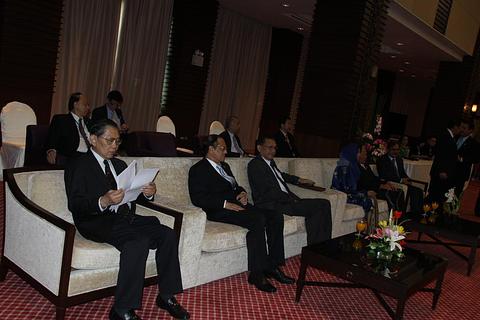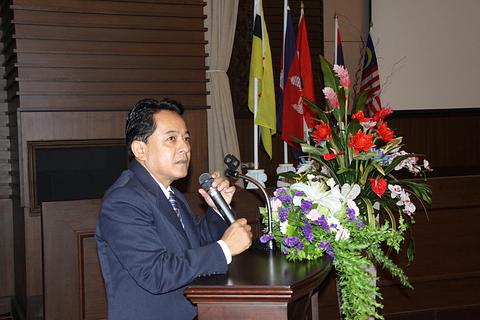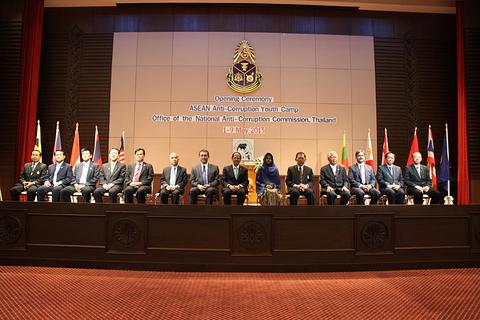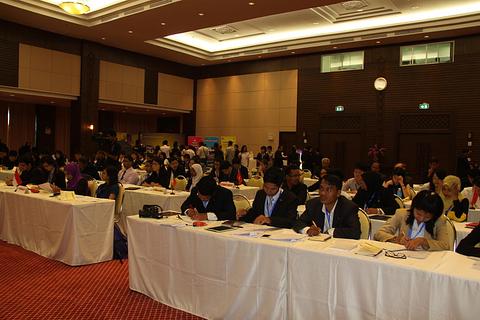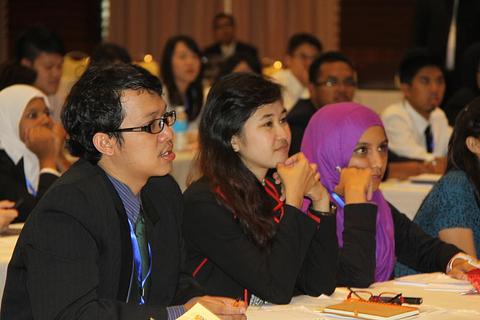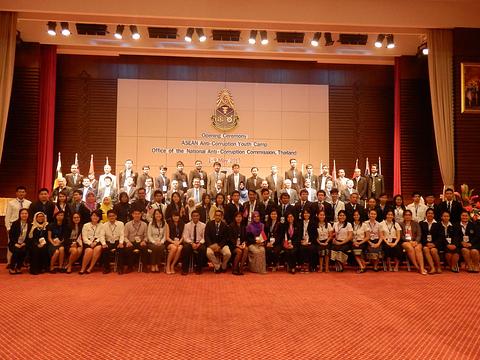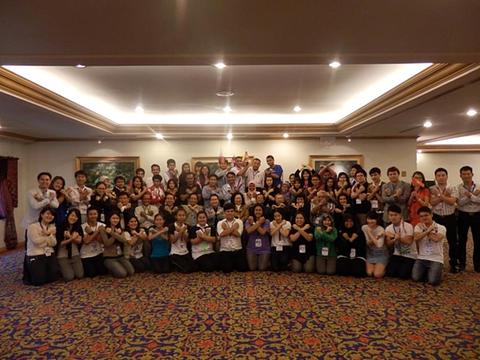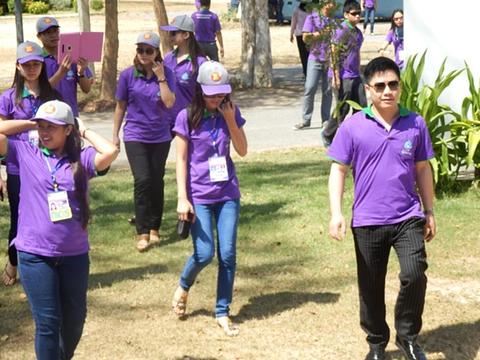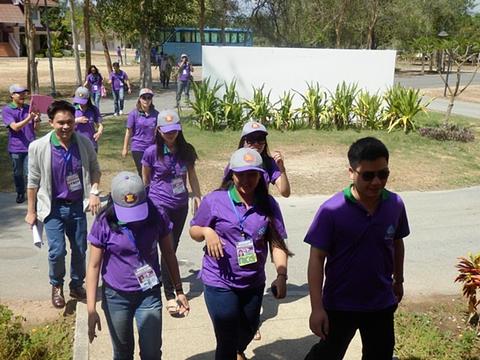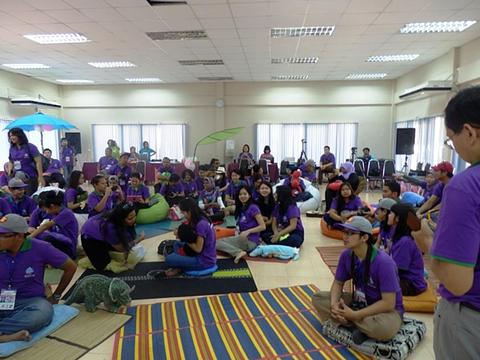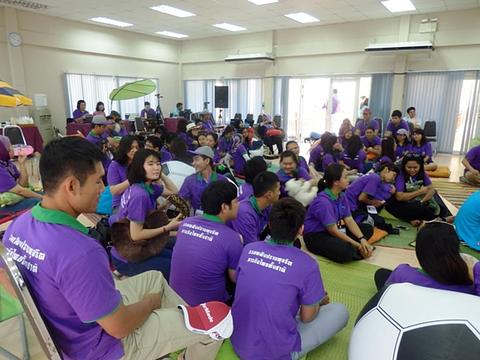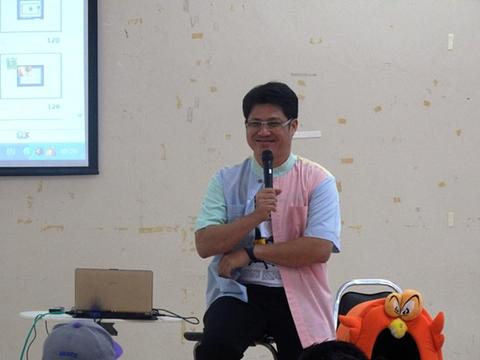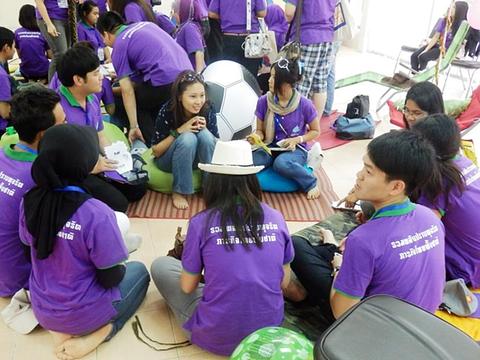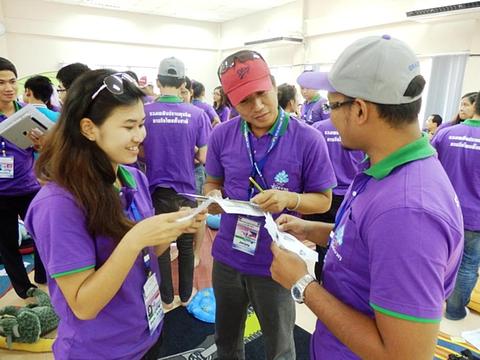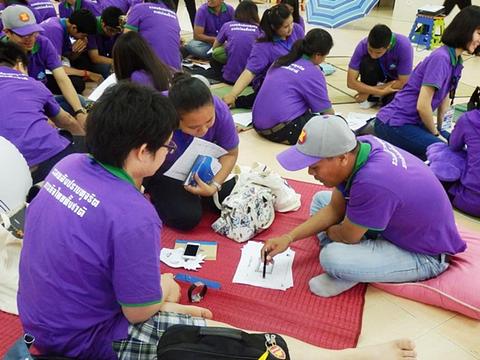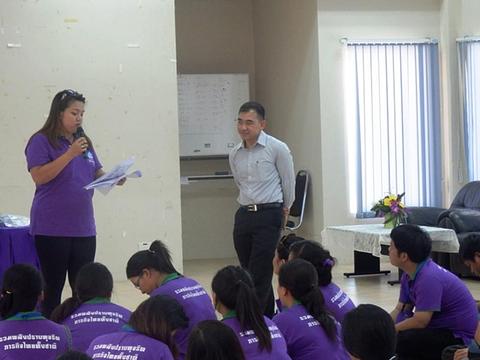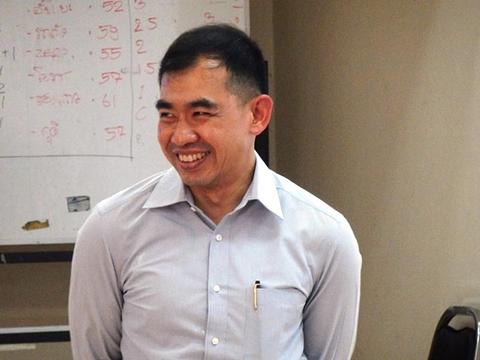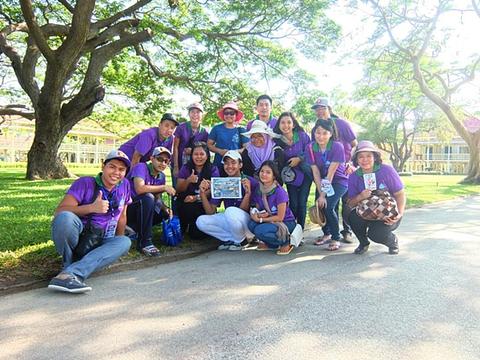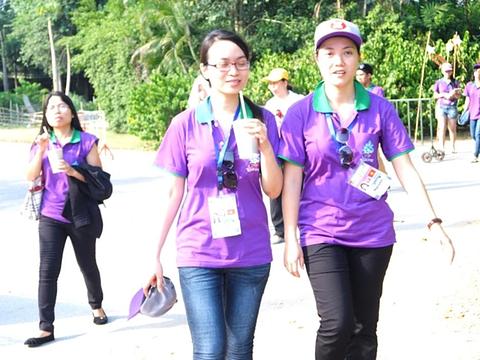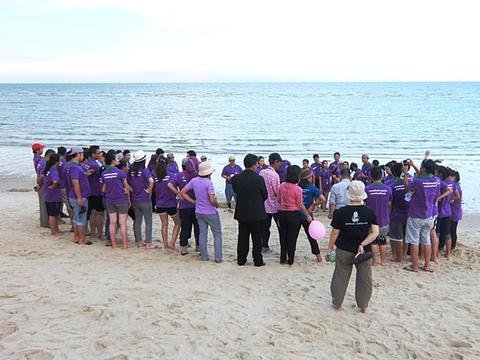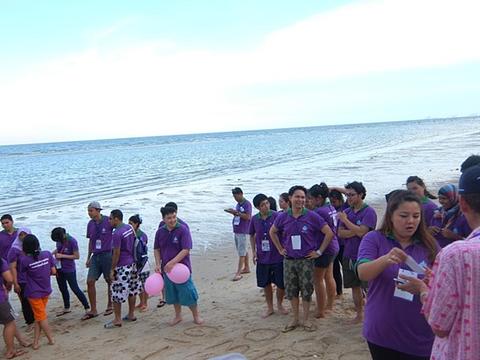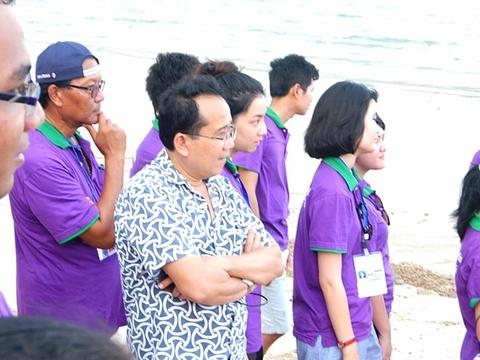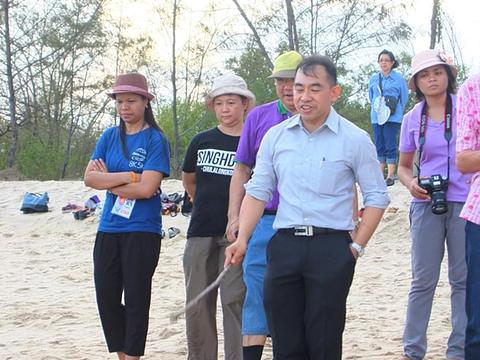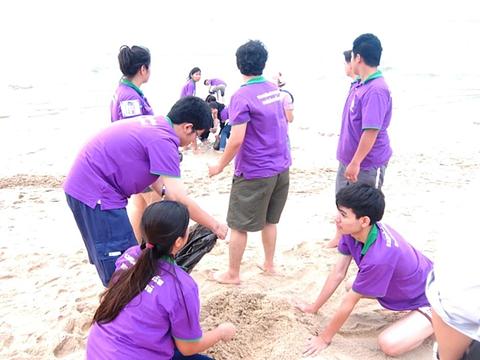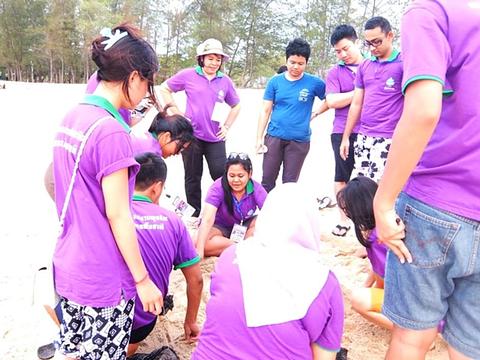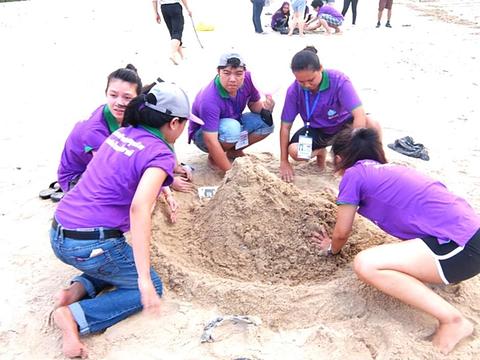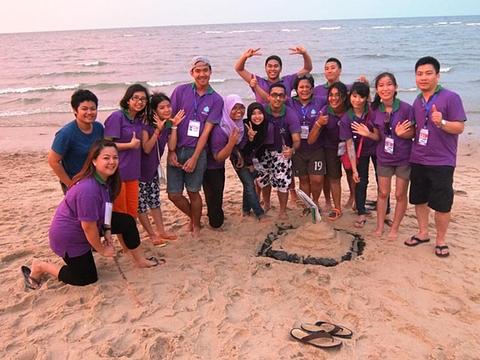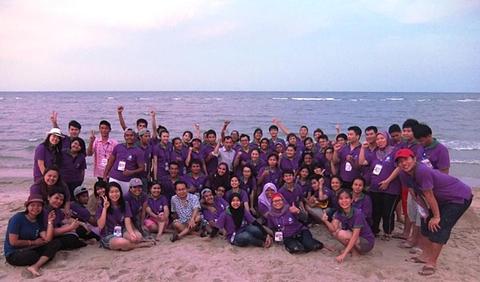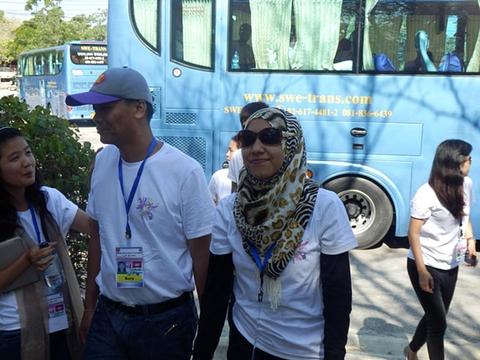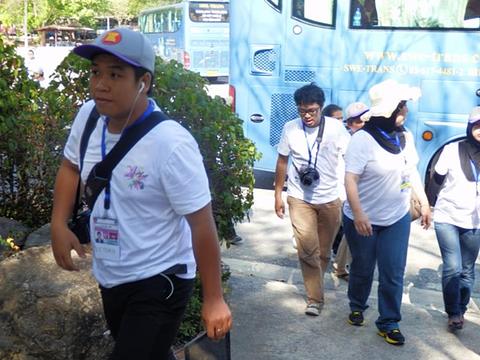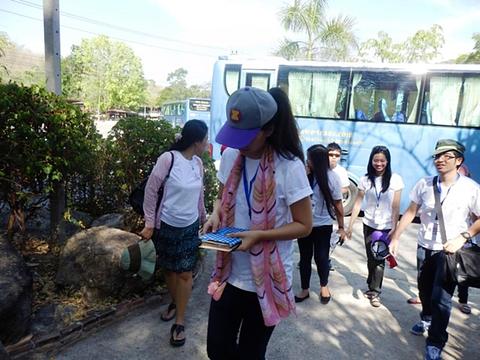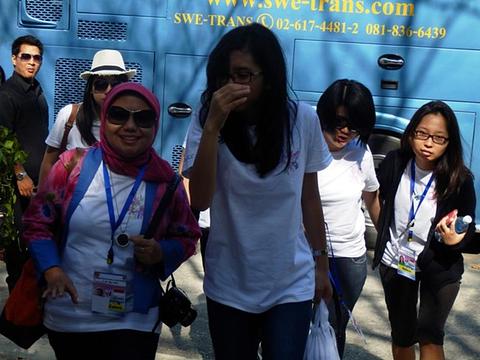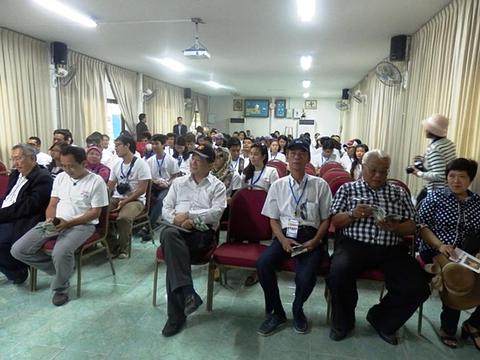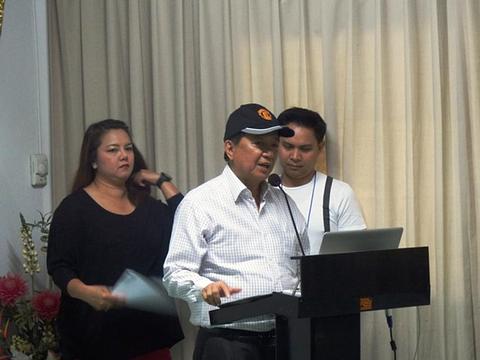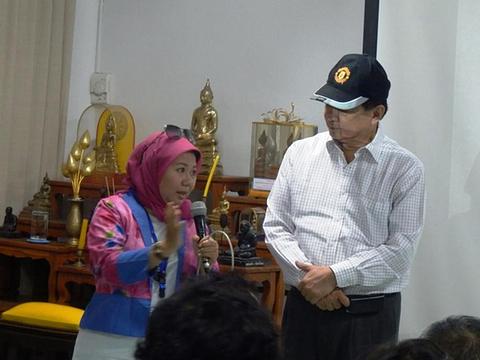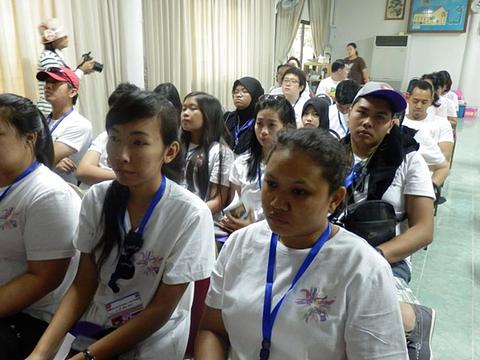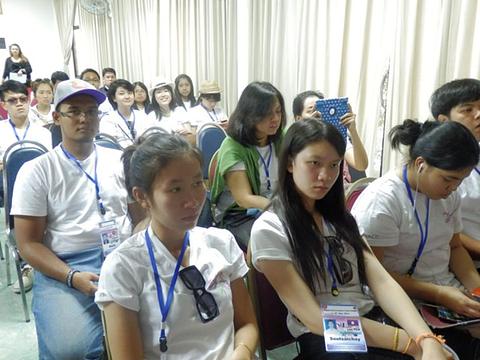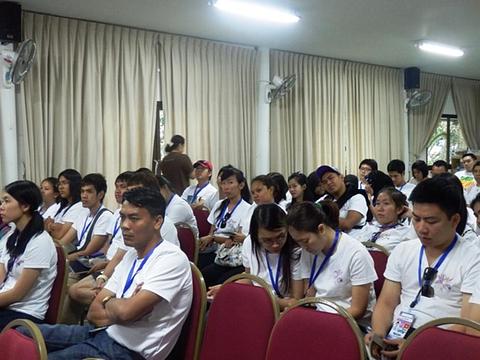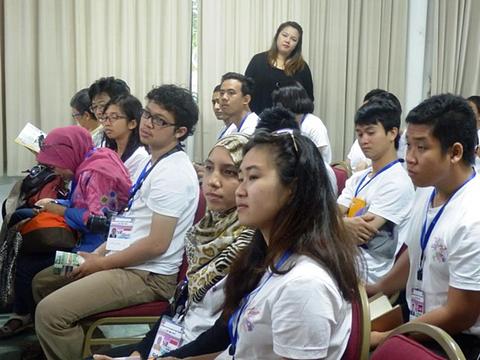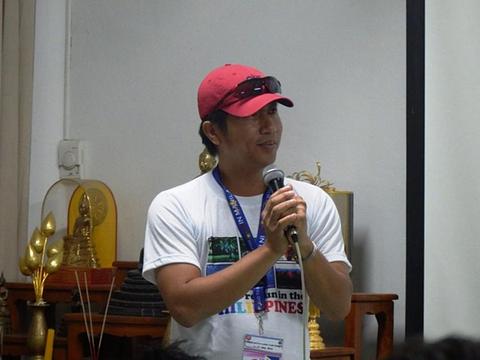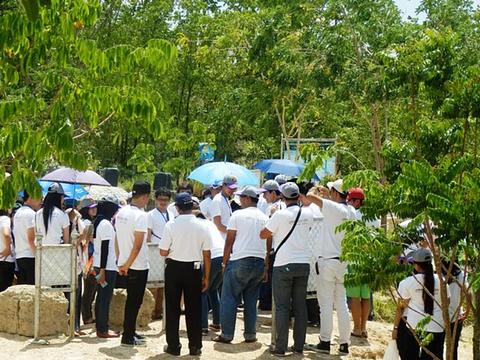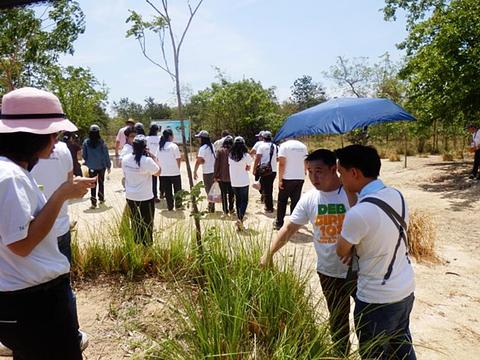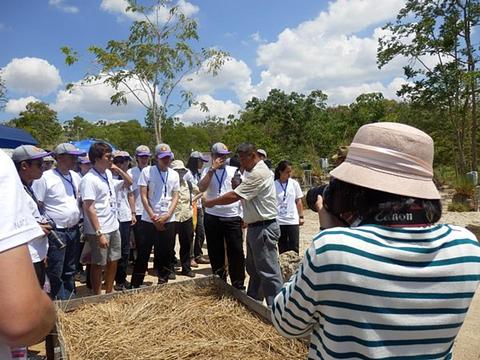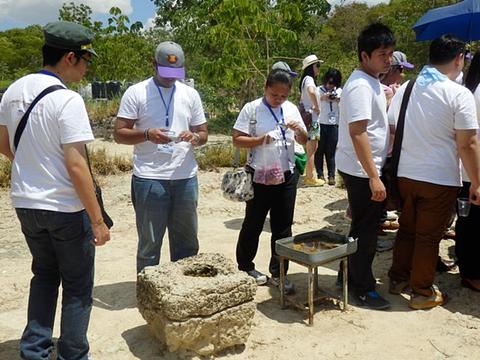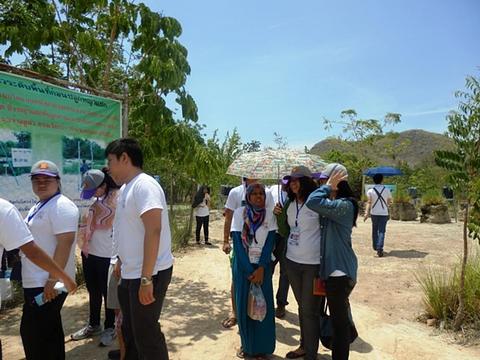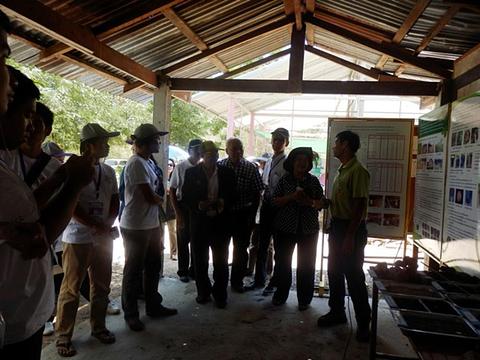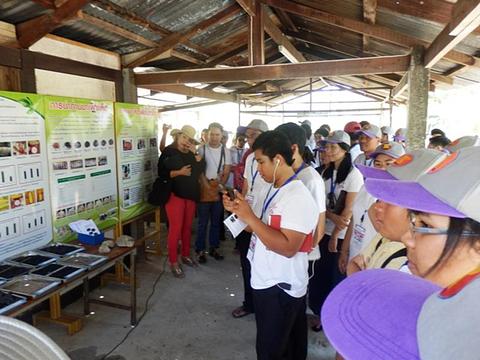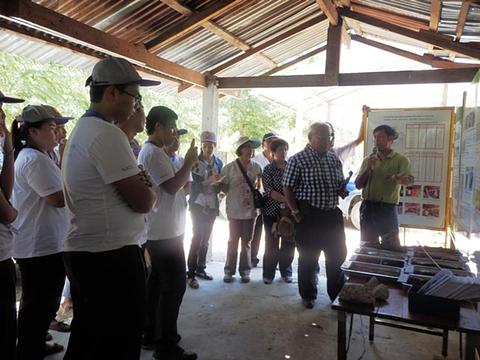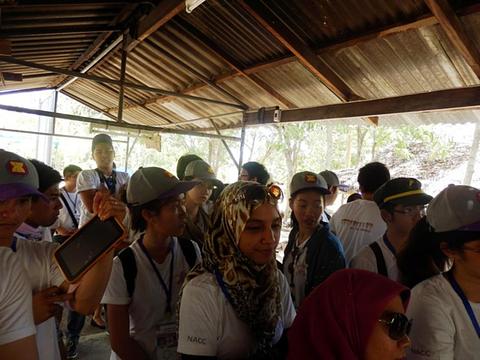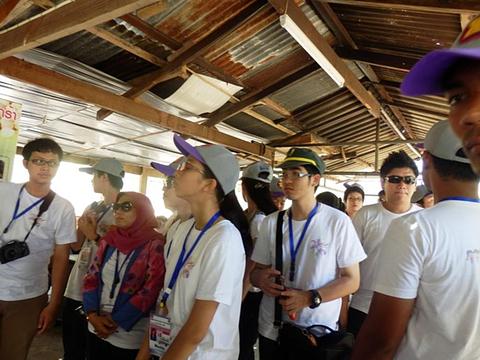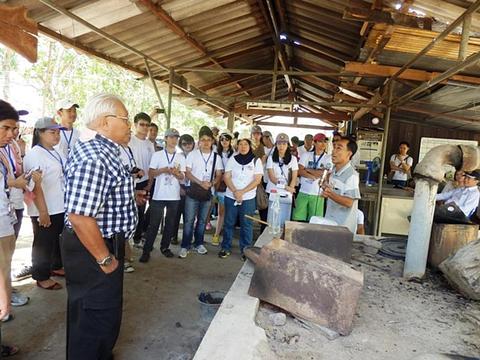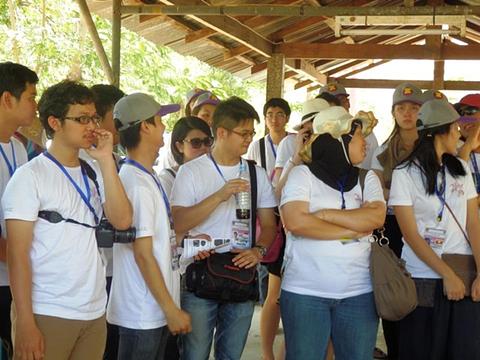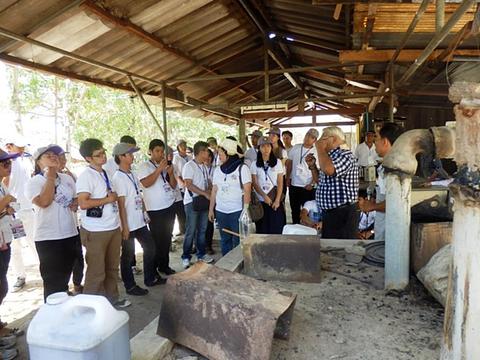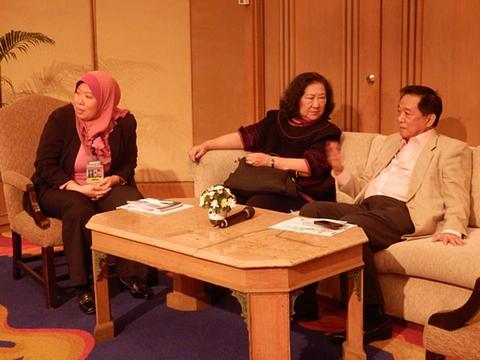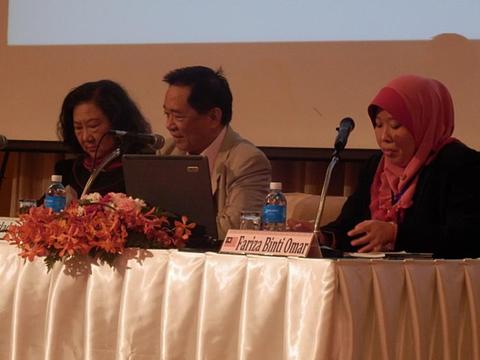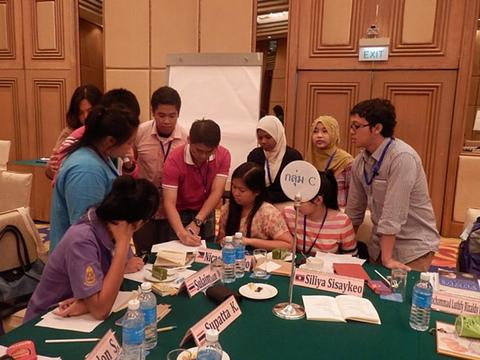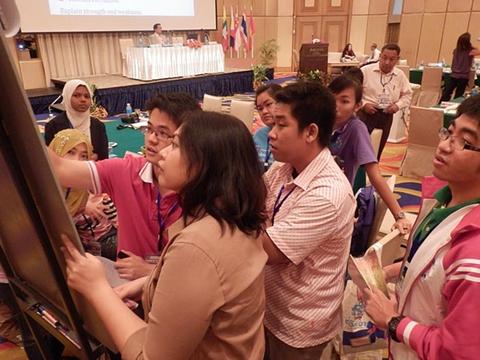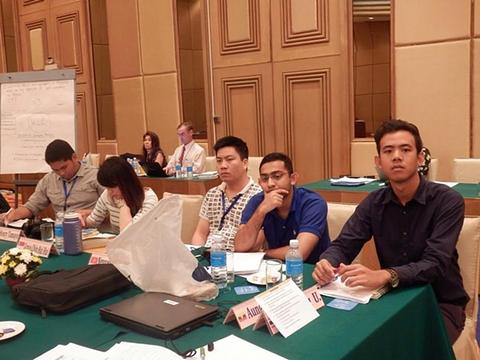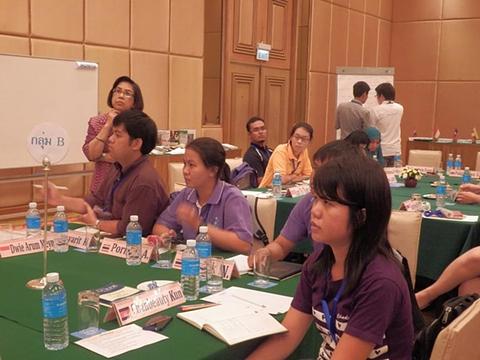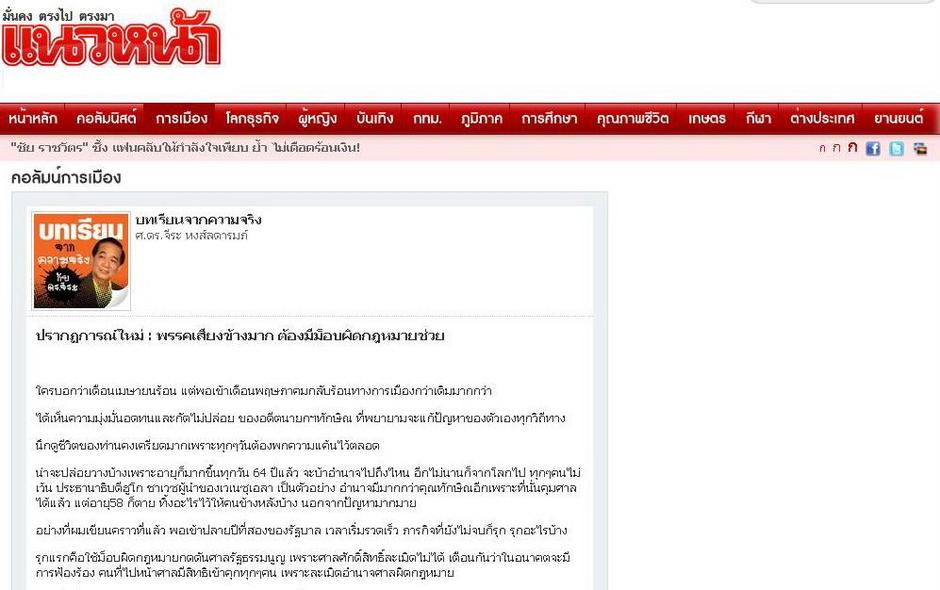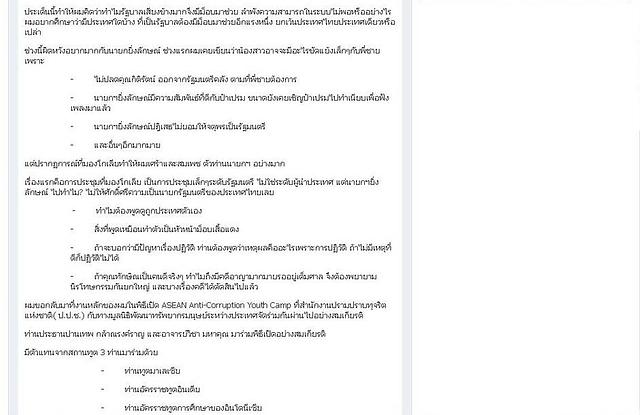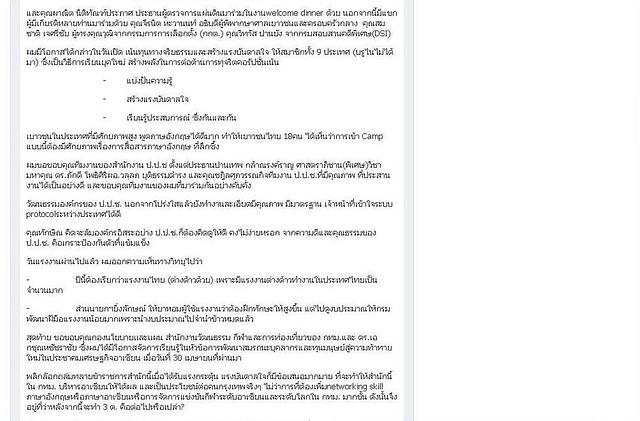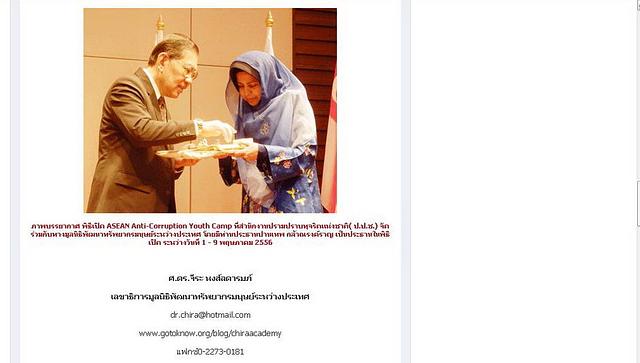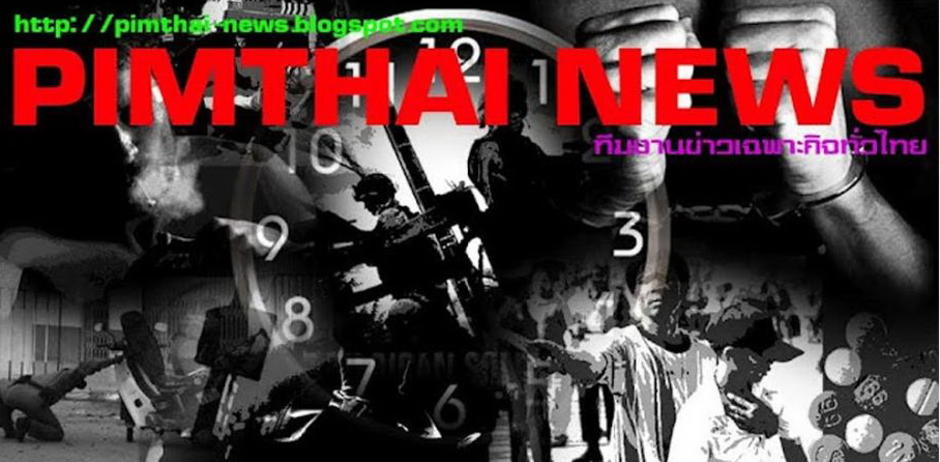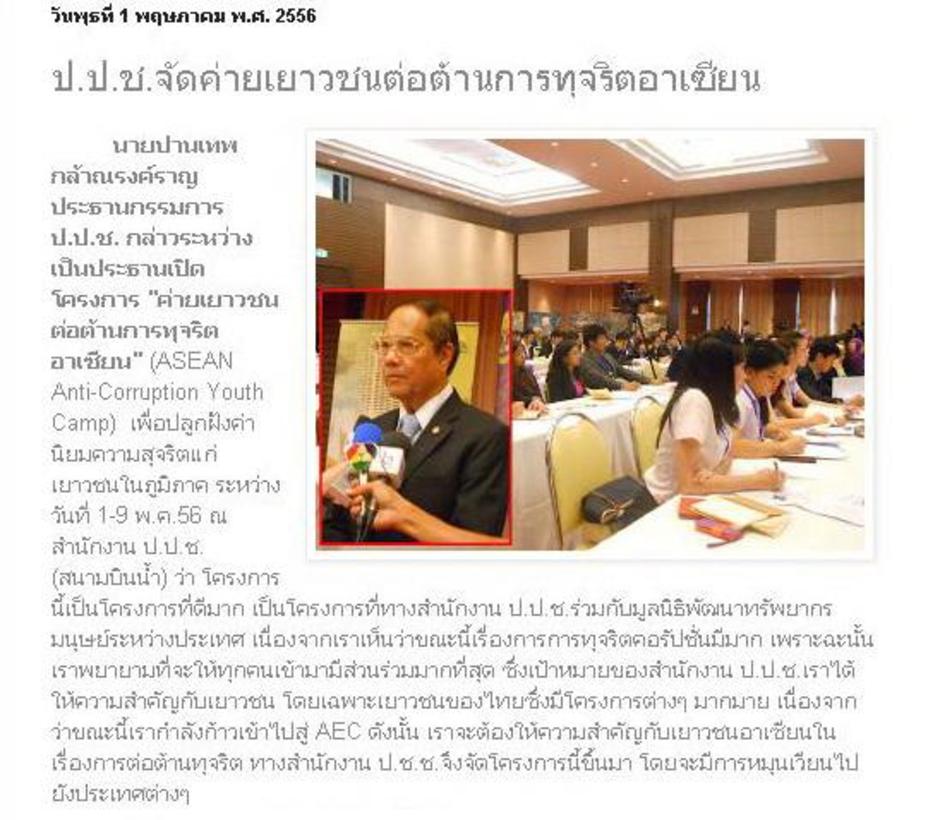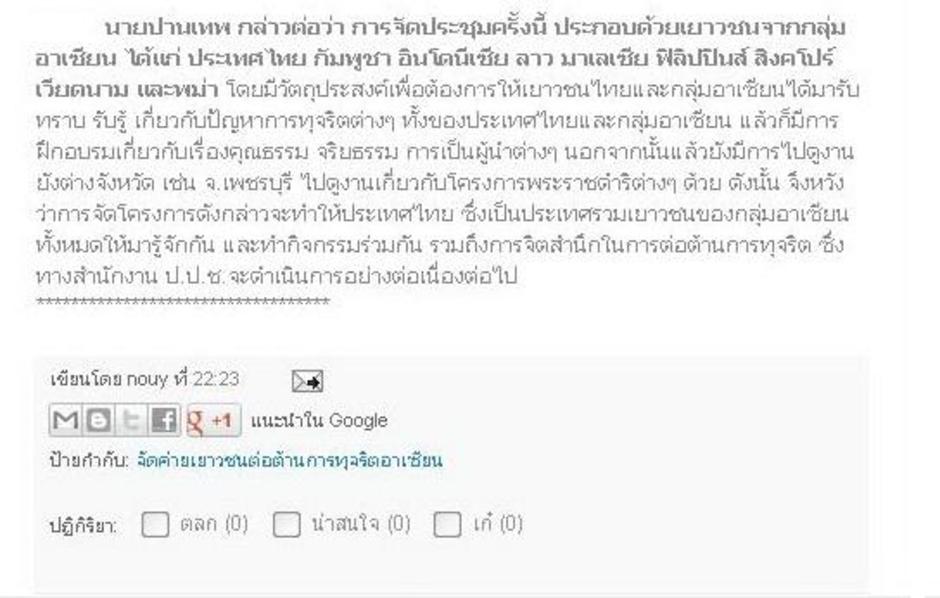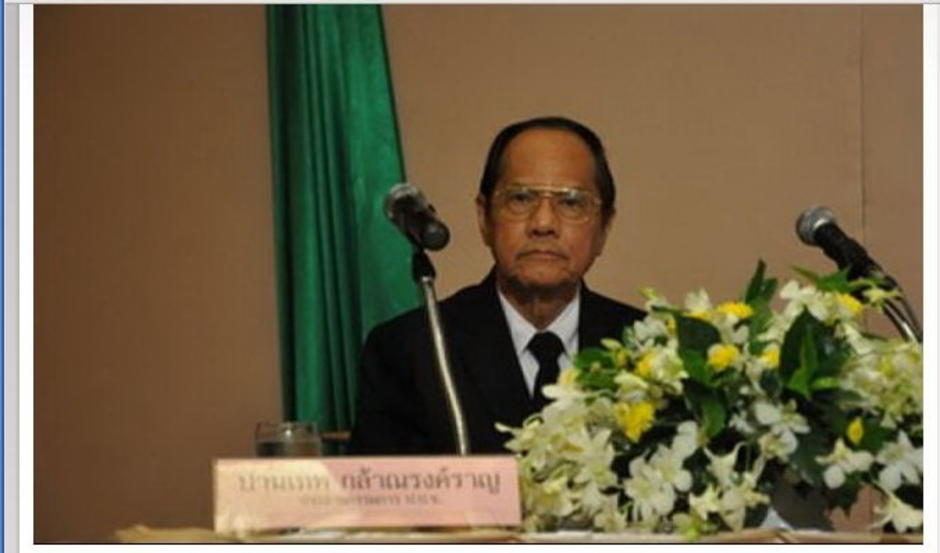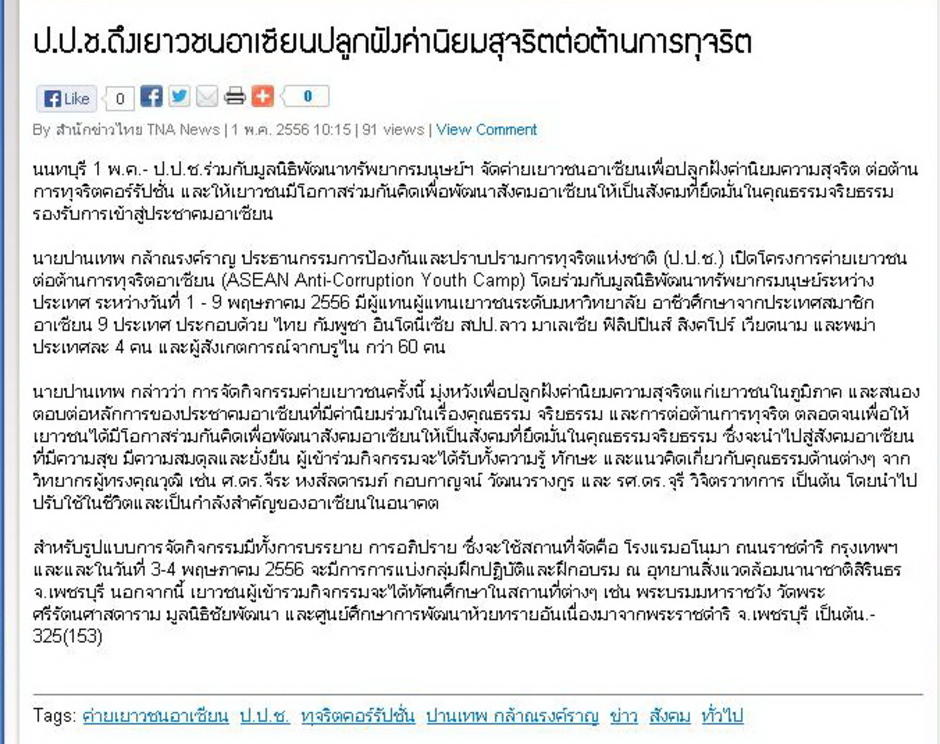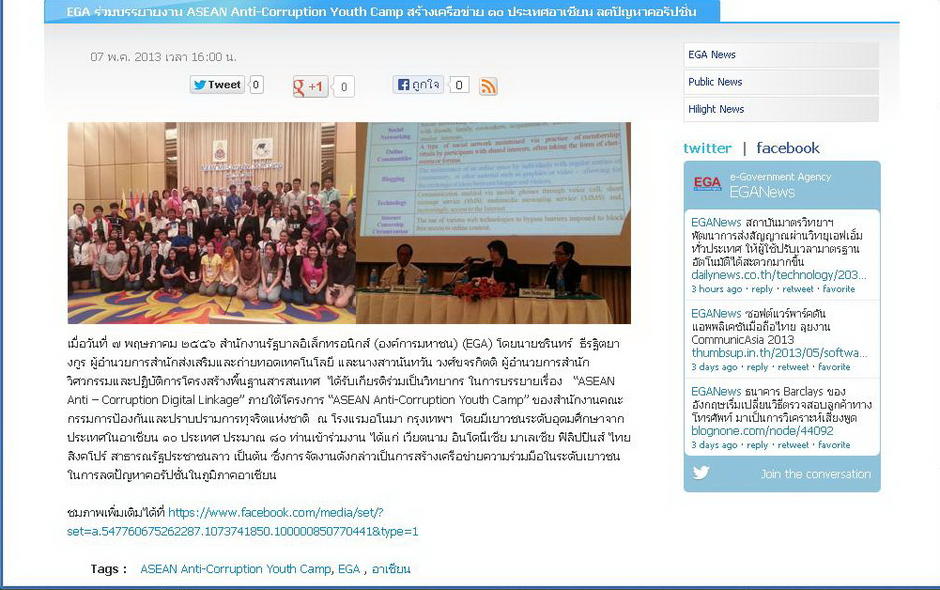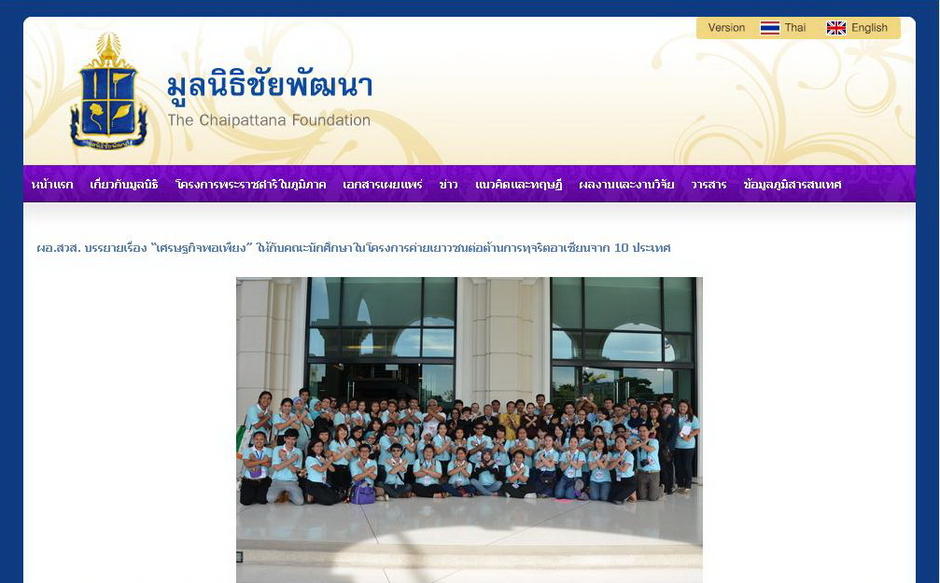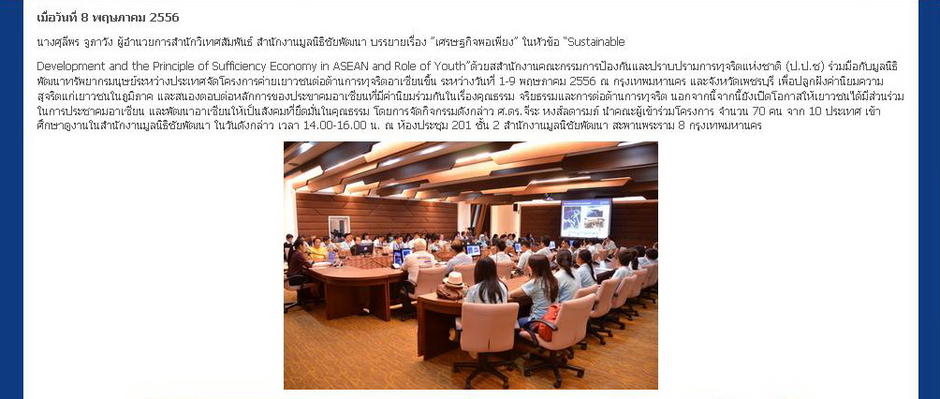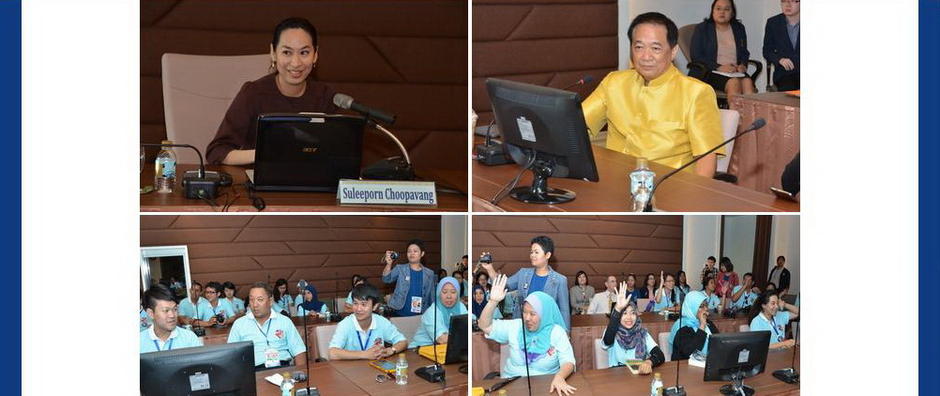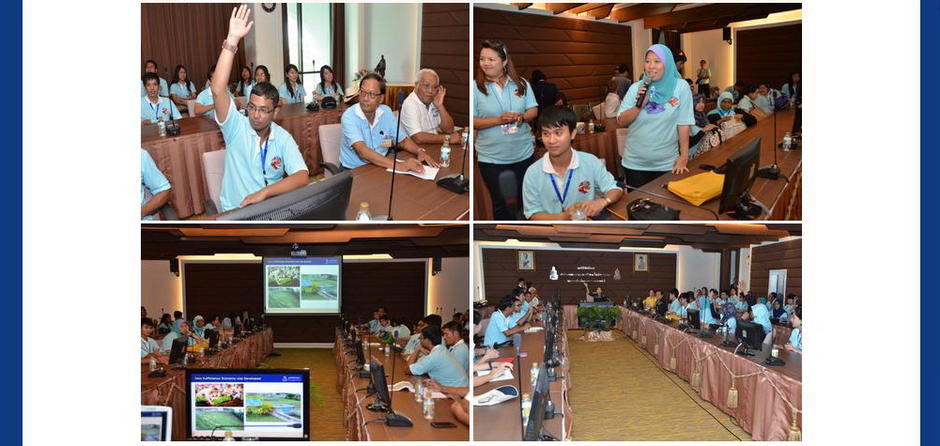ASEAN Anti-Corruption Youth Camp
Dear all,
30 April – 9 May 2013 We have “ASEAN Anti-Corruption Youth Camp” project with cooperation between The National Anti-Corruption Commission (NACC) and Foundation for International Human Resource Development (FIHRD) By this project, NACC selects youths from 10 countries in ASEAN to be participant. The activities are about moral and ethics and Anti-Corruption case studies from the experience of each country. The goal is to find the common root problem and to develop an Anti-Corruption plan for ASEAN Community on the basis of moral principles which will lead to a happy and balanced Asian community.
The "ASEAN Anti-Corruption Youth Camp" will be an interesting prototype project which reflects the importance of joining forces of the ASEAN members, led by Thailand.
For sharing in learning community , I opened this blog as the channel for sharing idea together.
Our fanpage: http://www.facebook.com/pages/ASEAN-anti-corruption-Youth-Camp-2013/510491769010000
Chira Hongladarom
................................................................................
สวัสดีครับ ชาว blog,
วันที่ 30 เมษายน – 9 พฤษภาคม 2556 นี้ ผมได้รับเกียรติจาก สำนักงานคณะกรรมการป้องกันและปราบปรามการทุจริตแห่งชาติ ร่วมกับมูลนิธิพัฒนาทรัพยากรมนุษย์ระหว่างประเทศ จัดโครงการ “ASEAN Anti-Corruption Youth Camp” โดยได้คัดเลือกผู้แทนเยาวชนจากทั้ง 10 ประเทศ เข้าร่วมกิจกรรมส่งเสริมคุณธรรม จริยธรรม และการแลกเปลี่ยนประสบการณ์การต่อต้านคอรัปชั่นของประเทศนั้น ๆ โดยมีจุดมุ่งหมายเพื่อค้นหาสาเหตุของปัญหาเบื้องลึก สู่การวางแผนการต่อต้านคอรัปชั่นในกลุ่มประชาคมอาเซียนบนรากฐานของการมีคุณธรรม จริยธรรมที่ดีงามที่สามารถนำพาความสุข และความสมดุลสู่ประชาคมอาเซียน
พร้อมกันนี้ ผมจึงขอเปิด Blog นี้เพื่อให้ทุกท่านได้ติดตาม และร่วมแสดงความคิดเห็นผ่าน Blog นี้ครับ
จีระ หงส์ลดารมภ์
Day 2:
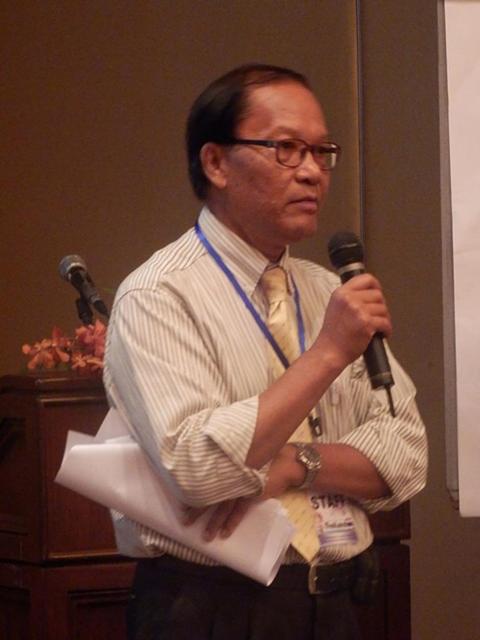
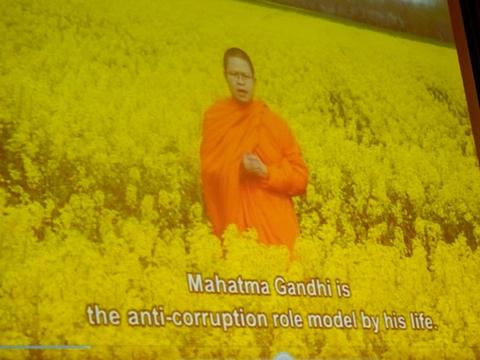
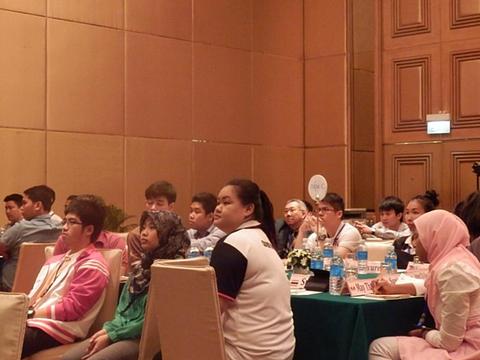
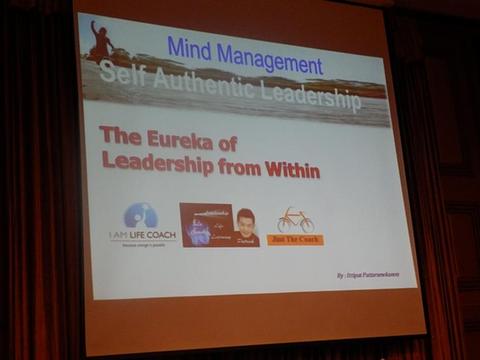
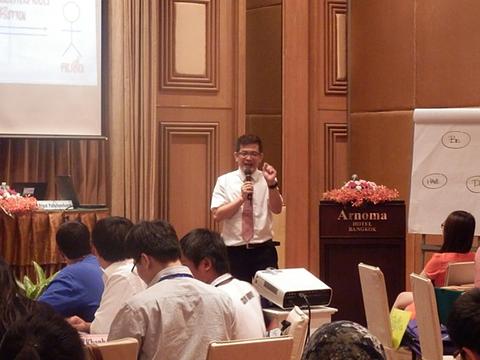
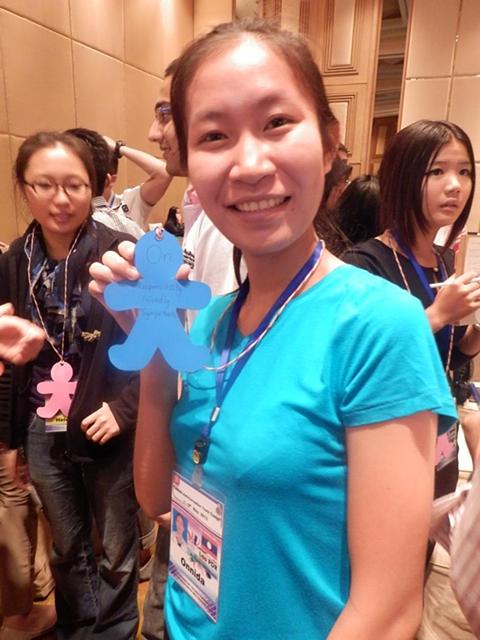
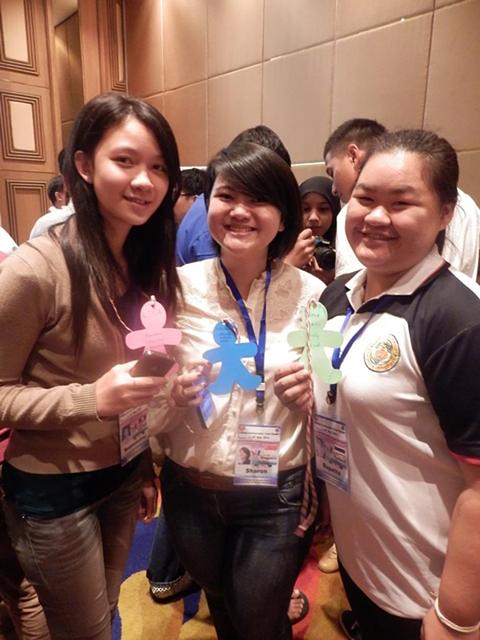

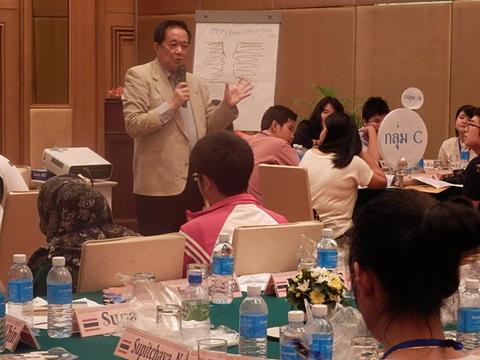
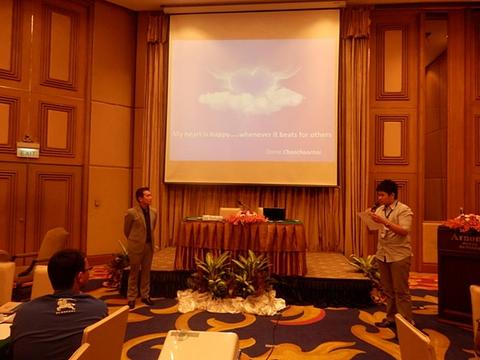
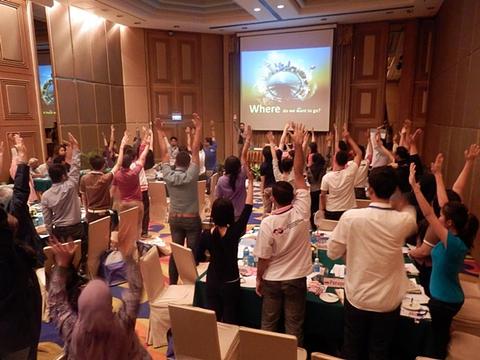
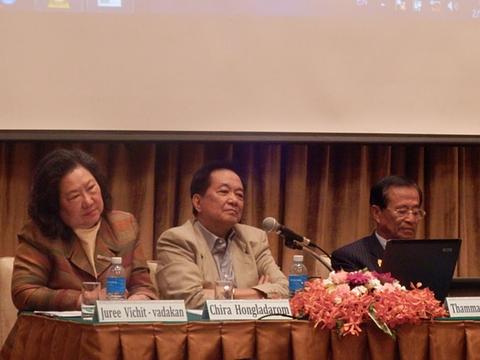
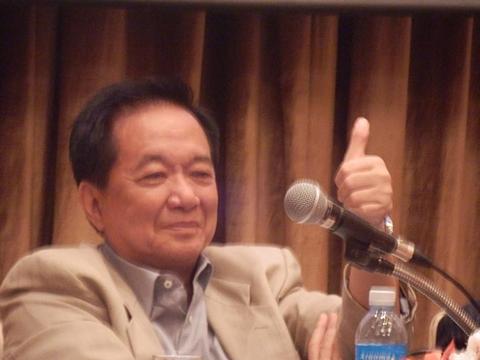
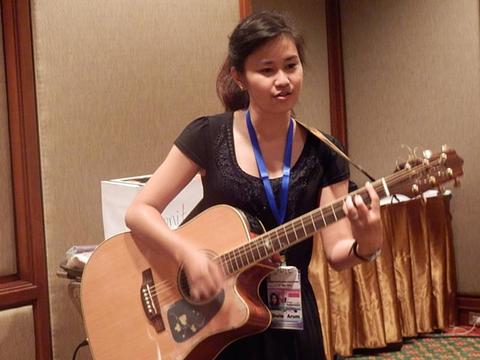
Day 3
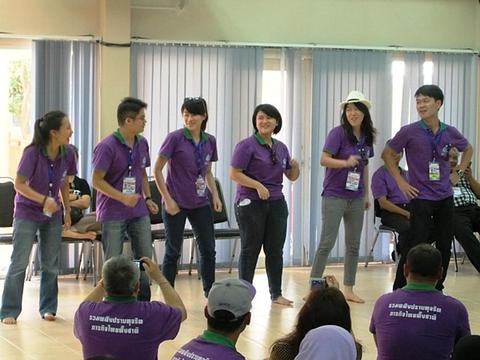
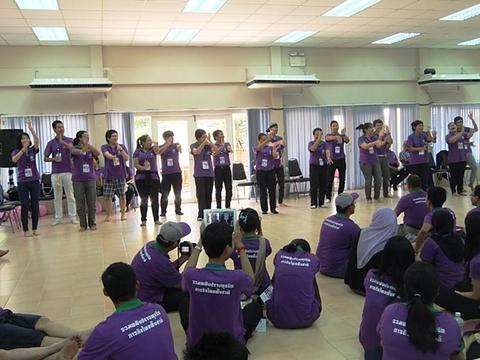
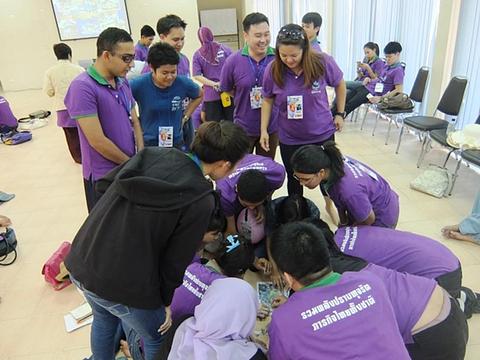
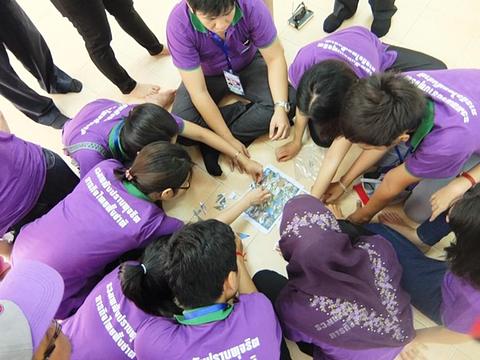
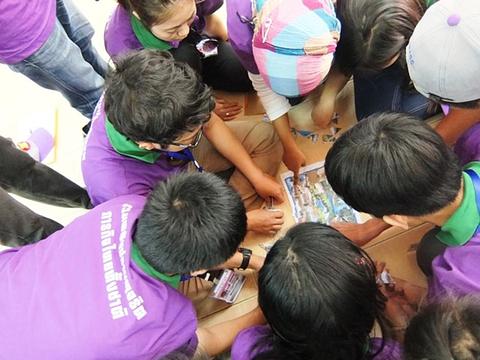
Day4
ความเห็น (72)
Tentative Program on
“ASEAN Anti-Corruption Youth Camp”
30 April – 9 May 2013
In Thailand.
Tuesday 30th April 2013
Venue :Arnoma Hotel Bangkok
14.00 Hrs. Check in at Arnoma Hotel, Bangkok.
17.30 Facilitators Team’s Meeting
Coached by Prof.Dr.Chira Hongladarom
Mr.Krich Sinudom
18.30 Welcome Dinner at the Hotel
19.30 Thai Students Orientation
Coached by Prof.Dr.Chira Hongladarom
NACC Executives
Day 1: Wednesday 1stMay 2013
Venue: Office of the National Anti-Corruption Commission, Nonthaburi.(Room:Nontaburi 1)
08.30Hrs. Register
09.00 – 10.00 Opening Ceremony
VTR (Knowing NACC)
Opening Remarks
By Mr. Panthep Klanarongran, NACC President
Welcome Remarks
By Professor Vicha Mahakun, NACC Commissioner
10.00 – 10.15 Coffee Break
10.15– 12.00 Orientation & Learning Forum
ASEAN Ethic Role Model and Leadership Development
By Prof. Dr. Chira Hongladarom
Secretary – General
Foundation for International Human Resource Development (FIHRD)
12.00 – 13.00 Lunch
13.00 – 14.00 Group Dynamic (Breaking the ice activity)
By Mr. Krich Sinudom and Team*
14.00 – 15.00 Special Session
Anti – Corruption Watchdog
By Ms. Kobkarn Wattanavrangkul
Chairperson of Toshiba (Thailand) Co., Ltd.
15.00 – 15.15 Coffee Break
15.15 – 16.15 ASEAN Anti – Corruption Cooperation and Role of ASEAN Youth
By Prof.Dr.Pakdee Pothisiri
Commissioner, NACC
16.15-17.45 Ethical Capital and Youth in ASEAN
By Professor Vicha Mahakun
Commissioner, NACC
17.45 – 18.30 Group Dynamic
By Mr.Krich Sinudom and Team*
18.30 – 20.30 Welcome Dinner
Welcome Speech
By Professor Vicha Mahakun
Prof.Dr.Chira Hongladarom
Thai Cultural Show
By Triamudomsuksanomklao Samutprakan School
ASEAN Youth Speech
(Greetings / What do you think about ASEAN Anti-Corruption Youth Camp? / Expectations and Commitment)
By 10 Representatives from each country
Group Photo
20.30 Back to the Arnoma Hotel, Bangkok
Day 2: Thursday 2ndMay 2013
Venue: Arnoma Hotel Bangkok (Room: Anoma 1)
08.00 Hrs. Breakfast
09.00– 12.00 Youth in ASEAN and "Mind Management"
By Phra Maha Wudhijaya Vajiramedhi (Interview)
Mr. Ittipat Pattaramekanon
12.00 – 13.30 Lunch
13.30– 16.30 Learning Forum
White Ocean Strategy and Role of ASEAN Youth
By Mr. Danai Chanchaochai
CEO, DC Consultants and Marketing Communications
16.30 – 19.30 Panel Discussion
360 Degree Analysis of Preventing Corruption
By Assoc. Prof. Dr.Juree Vichit-vadakan
Mr. Thammarak Karnpisit
Moderated by Prof.Dr.Chira Hongladarom
19.30 – 21.00 Dinner & ASEAN Learning Activity
(Group Assignment for Campfire Activity)
By Mr.Krich Sinudom and Team*
Day 3: Friday 3rdMay 2013
Venue: The Sirindhorn International Environmental Park, Cha-Am, Petchaburi
06.00 Breakfast at the hotel
06.45 Depart from Bangkok
09.30 Arrival at The Sirindhorn International Environmental Park,
Cha-Am, Petchaburi.
09.30 – 12.30 Learning Forum & Game Simulation
Creative Thinking for ASEAN Youth Ethics
By Mr. Sarun Chantapalaboon
12.30 – 13.30 Lunch
13.30 – 18.00 Walk Rally & Game Simulation
Effective Teamwork for ASEAN Youth
By Assoc.Prof.Chaleampol Kerdmanee
Station 1: Classroom
Station 2: Study Visit at Mrigadayavan
Coffee Break
Station 3: On the beach
Station 4: On the beach
18.00 – 19.00 Break
19.00 – 22.00 Dinner & Campfire
By Mr.Krich Sinudom and Team*
Day 4: Saturday4thMay 2013
Venue: Study Tour
07.30 Breakfast
08.30 Depart from The Sirindhorn International Environmental Park
09.00 – 12.00 Study Visit
HuaySai Royal Development Study Center, Cha-Am, Petchaburi.
12.00 – 14.00 Lunch
14.00 Return to Bangkok
17.30 Check in at Arnoma Hotel
Day 5: Sunday 5thMay 2013
Venue: ArnomaHotel Bangkok
07.30 Breakfast
08.30 Morning Brief
09.00-12.00 Panel Discussions
Networking Capital Development for Anti – Corruption in ASEAN
By Assoc. Prof. Dr.Juree Vichit-vadakan
Case Study of Anti- Corruption from Malaysia
Moderated by Prof. Dr. Chira Hongladarom
12.00-13.00 Lunch
13.00-16.00 Learning Forum
ASEAN Community and its impact to Anti-Corruption aspect
By Assoc. Prof. Dr. Somchai Pakapaswiwat
16.00 – 18.00 ASEAN Learning Activity
By Mr.Krich Sinudom and Team*
18.00 – 19.00 Dinner
19.00 – 21.00 Group Study : Innovative Project’s Presentation Preparation
Coached by Mr.Kitti Jayangakula and FIHRD Team
Day 6: Monday,6th May 2013
Venue :Arnoma Hotel Bangkok
08.00 hrs. Breakfast
09.00– 12.00 Learning Forum
Panel Discussion
Leadership for ASEAN Youth
By Prof. Kririt Boonyakiat
Dr. Sirilak Meksang
Moderated by Prof.Dr.Chira Hongladarom
12.00 – 13.00 Lunch
13.00 – 16.00 Panel Discussion
Learning from corruption case studies in ASEAN
By Assoc. Prof. Dr. Sirilaksana Khoman
NACC Advisor
Case Study of Anti- Corruption from Singapore
Case Study of Anti- Corruption from Cambodia
Moderated by Prof.Dr.Chira Hongladarom
16.00– 19.00 ASEAN Learning Activity
By FIHRD Team (City Tour)
19.00 – 20.00 Dinner
20.00 – 21.00 Group Study
Coached by Facilitator Team
Day 7: Tuesday 7th May 2013
Venue :Arnoma Hotel Bangkok
07.30 Breakfast
08.30 Morning Brief
09.00– 12.00 Learning Forum & Group Activity
ASEAN Anti – Corruption Digital Linkage (1)
By Speakers from Electronic Government Agency. (Public Organization) (EGA)
12.00 – 13.00 Lunch
13.00 – 15.00 Learning Forum &Group Activity
ASEAN Anti – Corruption Digital Linkage (2)
: Created facebook fanpages to share knowledge to public
By Speakers from EGA
15.00 – 18.00 Study Visit
Bangkok Post
19.00 – 20.00 Dinner
20.00 – 21.00 Group Study
Coached by Facilitator Team
Day 8 : Wednesday 8th May 2013
Venue :Study Visit, Bangkok
07.00 Hrs. Depart from Arnoma Hotel
08.00– 11.00 Study Visit: The Emerald Buddha Temple and the Grand Palace
11.00 – 12.00 Study Visit: The Thai Chamber of Commerce
12.00 – 13.00 Lunch
14.00 – 16.00 Study Visit: Chai Pattana Foundation
Special Talk
Sustainable Development and the Principle of Sufficiency Economy in ASEAN and Role of Youth
By Ms. Suleeporn Choopavang
Director of the Foreign Affairs Department
Office of the Chaipattana Foundation
Venue: Chai Pattana Foundation
16.30 Pay homage to His Majesty the King and Her Majesty the Queen
at Siriraj Hospital
17.30 Shuttle back to Hotel
18.30 – 19.30 Dinner
19.30 – 21.00 Group Study
Coached by Facilitator Team
Day 9: Thursday 9th May 2013
Venue: Arnoma Hotel, Bangkok
08.00 Breakfast
09.00 – 12.00 Workshop & Presentation
“Innovative Projects for ASEAN Anti-Corruption by ASEAN Youth”
Commented by Prof.Dr.Pakdee Pothisiri
Commissioner, NACC
Prof.Dr.Chira Hongladarom
12.00 -13.30 Lunch
13.30 – 17.00 Break
17.00 Leave for Office of NACC, Nonthaburi
18.00-20.00 Farewell party/ASEAN Night
Certificate Award Ceremony / Closing Ceremony
Venue: Nonthaburi Ballroom, Office of NACC
Day 10: Friday,10th May 2013
Departure of participants
“ASEAN Anti-Corruption Youth Camp”
Opening Address
by
Mr.Panthep Klanarongran
President of the National Anti-Corruption Commission
At the Office of the National Anti-Corruption Commission, Nonthaburi, Thailand,
1 May 2013
……………………………………………………………
Excellencies,
Distinguished Guests,
Prof. Dr. Chira Hongladarom,
Participants,
Ladies and Gentlemen,
Good morning,
I am delighted to be here this morning to preside over the opening ceremony of the ASEAN Anti-Corruption Youth Camp.
First and foremost, allow me to offer a very warm welcome to all participants and resource persons, particularly to those who visit Thailand for the first time. I hope your stay in Thailand will be both educational and enjoyable.
As all of you know, at the ninth ASEAN Summit in October 2003 in Bali, Indonesia, ASEAN leaders signed the Bali Accord II declaring the regional cooperation to establish ASEAN Community.
ASEAN Community has emphasized regional cooperation in the “three pillars”, which are security, economic and socio-cultural integration.
Under the agreed principles of ASEAN Political - Security Community, one of the integral cooperations is that the members committed to share disciplines, values and norms.
With respect to the corruption prevention and suppression part, there are many important activities which ASEAN member countries have to work together. For example, they must promote ASEAN cooperation in the corruption prevention and suppression, work under international cooperation framework and promote the exchange of the best practices in values, ethics and honesty through available channels.
In Thailand, Sanya Dharmasakti Anti-Corruption Institute is a responsible agent for human resource development for the Office of the National Anti-Corruption Commission. The Institute envisages that the values, honesty and anti-corruption must be instilled to the people as earlier as young age, both in Thailand and ASEAN countries. This is to respond to ASEAN’s principles of community in sharing ethical, moral and anti-corruption values.
To enhance such values, the Institute collaborating with Foundation for International Human Resource Development organizes this ASEAN Anti-Corruption Youth Camp.
The main purpose of this Camp is to provide ASEAN’s youths with opportunities to learn about morality, ethics and anti-corruption approaches from Thai experiences and foreign speakers, especially to establish venue for them to work together to gain the best practices in corruption prevention and suppression in ASEAN context. This, I am sure that the outcome in the long-run would enable ASEAN people to adhere to morality and ethics which in turn lead them to happy society with balance and sustainability.
The youths participating in this Camp are delegates from your respective countries. I would like to give some advises that the next nine days will be a special opportunity to make friends and create network for the sustainable friendship in the future. A good example to support such remarks is the successful project on Ship for Southeast Asian Youth Program that has been continuously successful organized for decades. Youths who participated in such project have been still contacting and working together in organizing useful activities up to the present.
With regards to learning frontier, I would like to urge all participants to grasp this golden opportunity to learn from experts, resource persons including assigned activities and study visits to enhance the following goals.
The first goal is to create the sustainable network for youth leaders in corruption prevention and suppression to be able to organize and follow-up activities together in the future.
The second goal is to instill the shared values in morality and ethics which are the integral elements to support sustainably develop youth leadership.
The third goal is to develop ASEAN Community to be Learning Community.
Ladies and Gentlemen
To that note, again I would like to express my highly appreciation to Foundation for International Human Resource Development for its technical support to this project.
Last but not least, I wish all participants of the ASEAN Counter-Corruption Youth Camp an enriching time in Thailand. I trust that you will find this leg of the journey culturally rich and rewarding. It is my hope that you will look back upon your days here with great fondness. Have a wonderful stay in Thailand and memorable journey!
I am now declaring the opening of “ASEAN Counter Corruption Youth Camp.
THANK YOU.
“ASEAN Anti-Corruption Youth Camp”
Welcoming Remark
by
Prof. Vicha Mahakhun
Commissioner, National Anti-Corruption Commission (NACC)
At the Office of the National Anti-Corruption Commission,
Nonthaburi, Thailand
1 May 2013
Mr. Panthep Klanarongran, NACC President,
Commissioners,
Prof. Dr. Chira Hongladarom,
Distinguished Guests,
Resource Persons,
Participants,
Ladies and Gentlemen,
Good Morning,
Today, I deem it a great honor to make this welcoming remark at the start of the “ASEAN Anti-Corruption Youth Camp” this morning. I welcome you as NACC Commissioner who takes care of Sanya Dharmasakti Anti-Corruption Institute (SDI). The NACC is the promoter and guardian of justice in Thailand with the main purpose of fighting against corruption. Our duty is to promote transparency and integrity, and to balance the twin elements of impartiality and fairness - a task we take with great responsibility, duty, and pride. On behalf of Thailand’s National Anti-Corruption Commission and SDI, may I wish you all a very warm welcome, not only to Thailand but also to the opening of this Youth Camp. Many of you have traveled from afar, and come to share great ideas and experiences, all in the single purpose of fighting corruption.
Before going any further, I would like to express the NACC’s gratitude to Foundation for International Human Resource Development (FIHRD) who joins with Sanya Dharmasakti Anti-Corruption Institute (SDI) for providing the technical support to this project, and delegates from ASEAN countries, who are here to share their experience.
Across the region, there are already many examples of youth who have worked together to make a difference for their communities and countries. The former participants of the ship for Southeast Asia Youth Program are good examples. Many of them have been contacting and working together in organizing useful activities up to the present. For youth participants in this Youth Camp, you are young ambassadors of your countries. All of you will eventually be the ASEAN leaders of tomorrow. I believe you can be a positive force for change and make a difference in your countries and this region. From the very outset, I views this Youth Camp as the first of the series, as a foundation to be built upon in the future. I am certain that this Camp will not only provide participants with the opportunity to discuss and share ideas of mutual interest, but will also allow participants to interact with one another. Through such interactions, all participants will have new friends, gain fresh perspective as well as display commitment to closer cooperation to promote the anti-corruption efforts of the region in the years to come.
The corruption is the important problem that has effect on the whole society and country. It is dangerous not only for the human being but also young generation of our community and cause destruction of society. The new NACC Organic Act encompasses comprehensive revisions and additions add more “enforcement mechanisms” to the NACC’s anti-corruption mandate. Today, NACC is implementing many anti-corruption programs and projects so as to deploy those enforcement mechanisms. But this Camp is one of NACC’s flagship projects.
Over the next nine days I shall follow the Camp with great interest as all participants are going to share with each other their experiences. I also hope to learn much from the presentations to be given by resource persons who are academia and practitioner in the field of anti-corruption.
Ladies and gentlemen,
There is a great wealth of experience in the room here this morning. I would like to sincerely thank all delegates for travelling from your countries to be here – I feel that this is itself is a clear indication of the significance and importance of this event.
So without taking up any more of our valuable time it is my great pleasure that I wish you a fruitful gathering, as well as memorable, engaging and enjoyable experience over the next nine days, and also express the hope that you will find a little time to rest and enjoy your stay in this Land of Smiles.
Thank you for your kind attention and Sawasdee Krub.
FIHRD TEAM
Foundation for International Human Resource Development
International Conference on Corruption
Office of the National Anti-Corruption Commission, Nonthaburi
Wednesday 1st May 2013
Orientation & Learning Forum: ASEAN Ethic Role Model and Leadership Development
Prof. Dr. Chira Hongladarom
Secretary-General
Foundation for International Human Resource Development
Prof Chira welcomed all participants from ASEAN countries, and thanked NACC for its cooperation in hosting this Youth Camp. The objectives of this session are to discuss the work to be done together over the coming 9 days, and to exchange ideas among participants.
Prof Chira began with the 3 pillars of cooperation of ASEAN- economic, social/cultural, and security/politics. Because corruption undermines all three of these 3 pillars, it is vital that we address corruption in all its forms.
Whilst ASEAN is moving to facilitate the free flow of goods and services within the bloc, the cost of doing business remains high. These costs are further increased by widespread, deep-seated and systemic corruption, leading to weakening of national competitiveness in a global market. There is therefore a major need to improve ASEAN’s economic integration at global level.
Corruption also presents risks to national security. It is therefore imperative that the new generation in ASEAN member states should prioritize the fight against corruption by embracing a new ‘Anti-corruption culture’ with a spirit of transparency and honesty.
To accomplish this challenge, collaboration among the people of ASEAN in anti-corruption initiatives will be essential if we are to work, share and learn from one another. Anti-corruption is also a cross-disciplinary effort, requiring expertise in diverse domains. Despite the disparity in implementation of anti-corruption measures around Asia, Prof. Chira expressed the hope that participants in this 9-day Youth Camp would learn, share and reflect, and that ASEAN’s younger generation will be motivated to serve as Ambassadors to extend the anti-corruption message both in their own countries and around the world.
Prof Chira reminded participants that this Youth Camp will examine diverse beliefs, attitudes and approaches to anti-corruption policies and practices though the lens of “Ethical Capital”. Each country differs in attitudes to corruption according to the prevailing socio-cultural and economic contexts. Prof. Chira noted that in Thailand, money and wealth are the symbols of success, irrespective of how they were acquired. Yet ultimately, we will need to face the enormous conflict with prevailing materialist values across all ASEAN countries, promoted by the media and rewarded by society.
Dr Chira introduced the theories of “8K’s” and “5K’s in the context of building ethical capital, and emphasized the critical importance of nurturing ethical capital among youth in ASEAN. Whilst the ‘8K’s Theory’ identifies 8 categories of capital (human, intellectual, ethical, happiness, social, sustainability, digital and talented), the ‘5Ks Theory’ offers an alternative typology of human capital (Creativity, Knowledge, Innovation, Cultural and Emotional Capital).
Prof Chira emphasized the importance of instilling ethical norms and building ethical capital at an early age- at school and at University. ASEAN can become a role model in this regard.
How important is ethical capital? Peter Drucker said “If a person has 3 qualities: integrity, creativity and innovation, without integrity, creativity and innovation will be useless.”
However, promoting the notion of ethical capital in our highly competitive world will not be easy, but it will nevertheless be essential. How can we transform ourselves to develop a new culture of honesty and transparency, where people earn money based on ability and wisdom, not from corruption; and where the honest are honoured, and the corrupt subjected to social sanction?
After this Youth Camp, it will be important for participants to sustain the linkages built over the coming 9 days in order to develop shared anti-corruption initiatives at regional levels and beyond. Prof Chira concluded his presentation by encouraging participants in this Youth Camp to be inspired by the region’s cultural diversity; we need to foster the ASEAN spirit in order to lead the region on a long and difficult journey, and to share, learn, and work together with a passion to make it happen.
Following his presentation, Prof Chira introduced the Youth Camp programme and activities for the coming 9 days. He encouraged participants to approach the Youth Camp and activities with a 2Rs approach: ’Reality and Relevance’; to be guided by the ‘2I’s: Inspiration and Imagination’, and also to ensure that their ideas and initiatives add value.
Country representatives were then invited to speak from the podium, in regard to expectations from the Youth Camp.
1. Cambodia
· Thanks to Thailand for hosting this Youth Camp
· Inspired by the presentation of Prof Chira
· Family, school and society all have a role in directing and shaping moral values.
2. Indonesia
· Thanks to Thailand for hosting this important Youth Camp.
· Cultural differences are wide within, as well as among, ASEAN countries.
· Young people in Indonesia tend to have much more of a focus on transparency.
· We would like to see more cooperation rather than competition within ASEAN.
3. Lao PDR
· Thank you Prof Chira for an inspiring introduction.
· Lao PDR is a developing country- what are the main challenges in building ethical capital?
4. Malaysia
· We would like to extend our appreciation to NACC, FIHRD and Prof Chira.
· One initiative in Malaysia has been to set up anti-corruption secretariats within universities, in order to nurture the integrity of students.
· How can perceptions of corruption be changed?
5. Myanmar
· I am here because we believe in diversity for ethical capital development.
· In Myanmar the family is strong, and community-based values are developed at an early stage.
· We look forward to collaborating with others in the region in anti-corruption measures.
6. Philippines
· Is it necessary or desirable to define the term ‘corruption’? Definitions can limit the scope.
· Where do you draw the line in regard to social values? Is corruption subjective?
7. Singapore
· Judgment is a more important skill than knowledge.
· In Singapore, civic and moral education is taught as part of the school curriculum, aiming to instill moral values and the obligations of citizenship from an early age.
· With Singapore’s cultural and religious diversity, it is a major and important challenge to find common ground to approach anti-corruption, and we have a lot to learn from our counterparts in ASEAN.
· However, we ask whether the ASEAN policy of minimal intervention in each other’s domestic affairs might serve as an impediment to collaboration on anti-corruption measures.
8. Thailand
· Thanks for the inspiration.
· We have two questions- with 65% of poll respondents in Bangkok claiming they would accept corruption provided there is some benefit, how can we change that?
· How to encourage social sanctions against the corrupt?
9. Vietnam
· Vietnam is in a transitional stage, and money is the prime symbol of success in Vietnam today.
· Yet, ethical capital is being instilled through the school curriculum, but more is needed, especially at primary school level.
FIHRD TEAM
Anti – Corruption Watchdog
Mrs Kobkarn Wattanavrangkul
Chairperson, Toshiba (Thailand) Co., Ltd and founder of Anti-Corruption WATCHDOG.
Wednesday 1stMay 2013
Venue: Office of the National Anti-Corruption Commission, Nonthaburi.(Room:Nontaburi 1)
Mrs Kobkarn began by noting the energy and sense of unity in this Youth Camp. She also mentioned her other roles- in assisting the Thai Chamber of Commerce, and as a mother.
An opinion poll conducted in Thailand last year found that the young generation can accept corruption if there is some benefit to them. I don’t believe this poll. In defining corruption as taking advantage of your position to obtain unfair advantage, corruption is everywhere, and lies within all of us. IN fighting corruption, we must therefore start with ourselves.
The Anti- Corruption organization of Thailand (ACT) was set up with other partners to fight corruption within the private sector. (We will learn more about this in the visit to the Thai Chamber of Commerce on 8 May).
Unlike the public sector, we have no authority to prosecute, but we collaborate with NACC and publicize. The ACT Integrity Pact also serves to prevent private sector corruption. Promotion is also key- to inculcate an anti-corruption culture within youth and the general public.
If anyone would like to report corruption, they can report via the Watchdog website. Mrs Kobkarn is responsible for the Youth programme. She introduced the App “I Lert U” by D-Ambassador” as an alternative way of reporting corruption, and Arya Media Citizen as an arbitrator for disputes within universities.
In collaborating with NACC, ACT held a 1-day discussion “2020- Corruption-free Thai Youth”. By the year 2020, many of today’s youth will be in leadership positions. Four key activities were initiated:
· Set up an Anti-corruption network (Fan page)
· Communication on social media (Apps)
· Law and regulations. There are many gaps and loopholes that create opportunities for corruption, and citizens must know their civic rights.
· Start from ourselves (citizenship duty – family, schools, community). Anti-corruption is everyone’s duty. Are we the silent majority? (We disagree with corruption, but take no action).
With ASEAN opening up to the world, it is imperative that we dare to stand up and take action. If you love your country, you must act if ASEAN is to achieve long term sustainable growth.
In my own company, Toshiba, we have introduced the concept of ‘Suriyasat”, with the four core values of loyalty, fairness, the honor system and integrity. During the 2011 floods the whole company was under 3m of water for 45 days. Afterwards, we were able to recover the business very quickly because of these core values; the trust and honor built up meant that our dealers, employees and Toshiba (Japan) remained loyal to us and to each other.
Mrs Kobkarn also introduced the concept of the ‘Ethical Transcript’, which provides a record of personal contributions to society; Toshiba requests this from candidates to establish their level of social commitment.
Toshiba also has a code of conduct, in particular, regarding conflicts of interest (e.g. relating to side-businesses) and transparency. When Toshiba discovered that a billboard company was not paying correct taxes, it withdrew its advertising despite financial loss. This sent a very clear and uncompromising message to employees. Additionally, Toshiba follows the Japanese ‘Morning Speech’ tradition, which encourages a spirit of contributing to our country.
Many people turn bad because of personal debt. The temptation of easy credit is a trap that condemns many to debt. His Majesty the King has taught us to use only money that we have, according to the principles of the Sufficiency Economy. Toshiba has issued staff with a booklet “Triple Treat” to show income and expenses and encourage savings. This helps adjust our way of life and manage personal finance. Three aspects must be balances- community, business and environment. We ask our employees and dealers to engage in CSR activities such as tree-planting, and also encourage donations to charitable causes.
Our dealers are SMEs. We don’t believe that Modern Trade will displace small family businesses, and work through dealer development activities to sustain a strong network of traditional dealers, e.g. through taxpayer recognition awards and business financial management. Keeping your business legal allows you to maintain full control.
Mrs Kobkarn concluded by encouraging participants to believe in their individual and collective strength, join hands and create a stronger ASEAN with sustainable growth, and a more equitable distribution of wealth.
FIHRD TEAM
Wednesday 1stMay 2013
Venue: Office of the National Anti-Corruption Commission, Nonthaburi.(Room:Nontaburi 1)
Combating Corruption Beyond Borders: Empowering ASEAN Youth In Anti-Corruption
Prof. Pakdee PothisiriCommissioner
National Anti-Corruption Commission
Prof Pakdee welcomed participants and expressed his pleasure at being able to discuss cross-border corruption. His presentation was divided into three parts:
·
Part I:
Understanding corruption in our globalized world- how corruption has
transformed itself into an international borderless crime.
·
Part II:
Anti-corruption efforts at the International & ASEAN levels.
· Part III: Empowering the role of youth in anti-corruption.
To understand how corruption exploits the changing nature of trade and operates in an integrated globalized world, Prof Pakdee presented two hypothetical cases of domestic and international corruption schemes.
First, a well-respected “Not-so-clean” politician in Country A conspires with a local construction company owner to build a bridge to cross from one island to the country’s second island. He feels he deserves to be compensated a little extra for this idea that will shorten journey times and improve everyone’s lives. So, in collusion with his friend the contractor, he devises a plan to make the bid look fair and transparent, but takes a 10% cut.
How would this change in a globalized scenario?
With businessmen from Countries B and C entering the picture, the politician then awards the bid to the highest bidder, so he may take a bribe of as much as 30% rather than 10%. The bribe is typically transferred via complex, cross-border financial transactions, accumulating in numbered offshore accounts. Therefore, the real competition in the bid lies not in the offer price, but in the bribe price. This brings a loss to citizens, either in terms of value for taxpayer money, or in substandard quality of materials- or both of the above. For the politician, the risk of detection and prosecution is very low.
Prof Pakdee then presented a not-so-hypothetical case in Equatorial Guinea, West Africa. With a population of 680,000, the country was headed by President Teodoro Obiang since 1979. It is the fourth largest oil-producer in sub-Saharan Africa, and is the richest country per capita in Africa; its GDP-per-capita of over US$35,000 is on a par with Spain and Italy.
Despite its wealth, 70% of the population lives below the poverty line; half of the population has no access to clean drinking water or electricity, and 1 out of 5 children die before reaching the age of five.
The President did not even try to hide his wealth and lived an opulent lifestyle. Eventually, in 2011, the US brought an anti-kleptocracy action, filing a civil forfeiture case against Teodorin Obiang, first-born of President Theodoro Obiang. Teodorin was residing in the US at the time.
The anti-corruption suit seeks to seize, among other items:
• $30 m Malibu mansion
• $37 m Gulfstream jet
• $3 m Michael Jackson memorabilia
• $12 m fleet of 26 luxury cars
Also, it was discovered that Teodoirin planned to build a $380 million super-yacht; equivalent to 3 times the country’s budget for health and education combined.
Reality Check: How much corrupt money is moving around the world every year?
The World Bank estimates US$1.6 trillion of cross-border flow of money from criminal activities and tax evasion, and US$ 40 billion lost to bribes and misappropriation of funds in developing countries. However, losses are not only direct financial losses, but also include loss of trust in public institutions.
Corruption levels are estimated most authoritatively by the Corruption Perception Index, introduced by Transparency International (www.transparency.org) in 1995. CPI ranks countries on an annual basis by their perceived levels of corruption, as determined by expert assessments and opinion surveys. As of 2012, the CPI ranks countries on a scale from 100 (very clean) to 0 (highly corrupt).
In 2012 CPI found that two-thirds of the 176 countries ranked in the 2012 Index score below 50; New Zealand, Denmark and Finland ranked top; and Afghanistan, North Korea and Somalia share last place with a score of only 8 out of 100. The highest levels of corruption were in countries plagued by conflict; corruption does not only fuel conflict- it makes them even harder to stop.
How do ASEAN countries measure up? With Singapore scoring 87 and Brunei 55, the remaining countries all scored less than 50 out of 100, indicating a serious corruption problem across the region.
Moving to the second part of his presentation, Prof Pakdee gave an overview of anti-corruption cooperation at international & ASEAN levels. The two key international instruments in fighting corruption are as follows:
1) The United Nations Convention against Corruption (UNCAC), which came into force on 14 December 2005, it is the first legally binding international anti-corruption instrument. It currently has 165 State Parties, including all 10 ASEAN countries; and
2) Organization of Economic Cooperation & Development (OECD) Anti-Bribery Convention. This came into force on 15 February 1999, aiming to address the supply side of corruption (the bribe giver) by criminalizing bribery of foreign public officials in international business transactions. It currently has 40 member countries. Thailand, Malaysia and Indonesia now have observer status to this convention.
The advantages of being a State Party to international anti-corruption conventions are many, First, they improve the image and reputation of a party country by affirming a country’s commitment to tackle corruption, and facilitate enhanced international cooperation, which is an effective mechanism in fighting corruption, now a transnational crime.
International instruments also provide clear direction for legislative amendments to ensure that national legal frameworks conform to international standards, and provide mechanisms for receiving technical assistance to improve legislation and capacity building.
In regard to anti-corruption cooperation in the South East-Asian region, Southeast Asia Pacific Anti-Corruption (SEAPAC) was established as an informal network of the anti-corruption agencies of 9 countries in the ASEAN region. SEAPAC meets twice a year to share progress of anti-corruption efforts and exchange relevant experience and know-how. Myanmar has expressed its intention to join the group at the end of this year.
With major infrastructural projects driven by integration in the ASEAN Region, there is a major need to address these corruption risks:
· ASEAN Economic Community in 2015 – a single market and production base to allow the free movement of goods, services, investment, capital and labor throughout the 10-member South-East Asian region
· ASEAN’s long-term flagship projects for integrating the region’s infrastructure: the ASEAN Power Grid, the Trans-ASEAN Gas Pipeline, the ASEAN Highway Network and the Singapore-Kunming Rail Link Projects.
In order to address this challenge, it will be necessary to harness the power of all sectors- public, private and civil society. Civil society in particular is a powerful force in monitoring and exposing corruption, and in demanding transparency and accountability.
In the third and final part of his presentation, Prof Pakdee addressed the role of youth in fighting corruption. Today, youth & children comprise 40% of the world’s population, and the proportion is much higher for developing countries.
Prof Pakdee illustrated the potential of youth using several case studies:
(1) Youth in Solidarity (India)
In 2011 the majority of the supporters of the mass anti-corruption movement was led by social activist Anna Hazare were youth, particularly university students tired of the endemic corruption problem in their country.
(2) Global Youth Anti-Corruption Network (GYAC)
Supported by World Bank Institute, GYAC is a growing global network of young leaders, journalists, artists, and experts on IT from civil society all over the world. GYAC supports its members by connecting through www.voices-against-corruption.org.
GYAC raises awareness of corrupt
practices in their respective communities
using music to spread anti-corruption messages to all youth around the world
(http://anticorruptionmusic.org).
GYAC also offers young journalists a platform to write about governance and corruption-related
issues.
RAISING THE VOICES OF THE YOUTH at the
International Stage, GYAC participated in the 14th International
Anti-Corruption Conference in Bangkok, Thailand from 10-13 November, 2010.
GYAC members produced a Bangkok Declaration of Young People, which among other
things, asserted the right of youth to participate in fight against corruption.
GYAC also joined the 15th International Anti-Corruption Conference, Brasilia, Brazil, from 7-10 November, 2012. GYAC members held their annual forum in conjunction with the IACC, and also organized and ran their own workshop sessions on the topic of youth empowerment. Live coverage of the conference was provided through blogs, online reporting and social media.
(3) Thai Youth Anti-Corruption Network
Thai young people say no to corruption! “I realized the problem of corruption- there is a lot of it in Thailand, but I didn’t know what I could do" (Sayuti Salam, undergraduate student and President of the Thai Youth Anti-Corruption Network). The network has a membership of 1,600 students from 90 universities, and recently 1,500 young people commemorated International Anti-Corruption Day by organizing a high-profile arts exhibition. The network has a strong and growing online community.
In conclusion, Prof. Pakdee offered four concrete suggestions for young people to contribute in a concrete way to fighting corruption on a practical level, as follows:
1) DON’T participate in or condone corruption;
2) Join an anti-corruption network(s) and participate in their activities (e.g. GYAC, local youth network);
3) Spread the anti-corruption message in your community (sharing anti-corruption news articles on your social network);
4) Engage your friends to find creative ways to raise awareness of the dangers of corruption (activities to commemorate International Anti-Corruption Day (9th December) and International Youth Day on 12th August.
FIHRD TEAM
Wednesday 1stMay 2013
Venue: Office of the National Anti-Corruption Commission, Nonthaburi.(Room:Nontaburi 1)
Ethical Capital and youth in ASEAN
Professor Vicha Mahakun
Commissioner, NACC
Ethical capital is emerging as an important parameter in all ASEAN countries as a measure of the preparedness of a country to combat corruption.
Several major ASEAN members of SEAPAC cooperate under a MOU on preventing and combating corruption. SEAPAC members work jointly on transnational corruption cases.
The term ‘ethics’ is merely another word for ‘righteousness’. Ethics represent a vital component of human capital development, to build sustainable communities and states. Personal integrity is a key requirement that complements professional knowledge. Moreover, prudence is the exercise of good judgment, wisdom, moderation and fairness in using knowledge to benefit people.
Ethics presupposes the existence of morality, and is based on several principles (Integrity, Objectivity, Professional Competence, Confidentiality, Professional Behaviour).
Ensuring ethical conduct in our personal and professional lives will help us restore our mental and emotional poise, leaving us calm and peaceful. The best way to protect youth and society is to instill ethical conduct in all aspects of their lives.
Kh Vicha introduced the key objectives of this Youth Camp:
1. To open minds and release from the stresses and tensions of daily life; and foster a sense of readiness, sacrifice and power to fight corruption at the workplace, school, university or company.
2. To build an understanding among young people on how to profit from ethics in daily life.
He concluded with two inspirational quotes:
To grow the tree, we must prepare the land.
To eat, we must prepare the meal.
To develop, we must prepare the human being.
But we must develop ourselves before the others.
“Strong people stand up for themselves, but the strongest stand up for others”.
Welcome Reception Speech
by
Mr.Panthep Klanarongran
President of the National Anti-Corruption Commission
At the Office of the National Anti-Corruption Commission, Nonthaburi, Thailand,
1 May 2013
……………………………………………………………
Distinguished Guests,
Prof. Dr. Chira Hongladarom,
Participants,
Ladies and Gentlemen,
Good evening,
I am delighted to be here this evening to welcome you to this ASEAN Anti-Corruption Youth Camp Reception.
This Youth Camp provides a platform for youth across Southeast Asia to learn about each other’s countries and cultures, as well as to be ambassadors of their own countries. It has taught participants about nature of corruption, anti-corruption tools, and organizing anti-corruption activities.
I sincerely hope that the knowledge and experience from the Youth Camp have been a reward and benefit to all participants, and that it may encourage some of you to return to Thailand whether to study, to work here or just to visit your friends. When the Youth Camp has come to an end, I hope that you will continue to nurture the friendship that you have built with your fellow participants, and that you will take time to reflect on what you have learnt.
On this note, I wish a very successful implementation of this Youth Camp and a close cooperation of ASEAN countries.
Thank you for your kind attention and Sawasdee Krub.
++++++++++++++
Sokrithy Prum
Dear Sir/Madamm,
For this opening ceremony I could learned lots of new things that I never met before and I could caught up a good lesson from all professors. One word that I really interested the most is "Ethical Capital." It is really important to put anti corruption to the education system. It can teach children to know to the bad point of corruption and make they willing to prevent the corruption. Moreover, ethic can teach children to be a good person and have moral in their mind.
Warm Regard,
Sokrithy Prum
Thursday 2nd May 2013
Venue: Arnoma Hotel Bangkok (Room: Anoma 1)
Youth in ASEAN and "Mind Management"
By Phra Maha Wudhijaya Vajiramedhi (Interviewed)
Good Morning, all delegates of ASEAN Anti-Corruption Youth Camp.
Corruption is the most serious danger for Thai society and all countries especially developing countries.
Corruption is a very dangerous problem. It is like the social cancer.
You are important anti-corruption force because today you are youth but, in the future, you will be adult who will take parts in define the destiny of the country and the society in the future.
Therefore, all of you must learn how bad corruption in your countries is.
In Thai society, we discover that corruption is a cancer which seriously attacks Thai society and is a great concern.
All of you can participate in anti-corruption activities.
In the history, an important anti-corruption leader of the world had opportunities, power and wealth but all of them could not lure him to be a slave.
On the day he passed away, he left only 3 legacies for the world.
1. The Bhagavad Gita
2. A glass of goat milk
3. A bead necklace
The world’s famous person with great political power had only these properties on the day he passed away.
This person is Mahatma Gandhi.
Mahatma Gandhi is the anti-corruption role model by his life.
His concept is the person of truth. He can insist on truth the whole life.
When he was young, every morning, he hadbreakfast with his mother
Before he had breakfast, a raven crowed.
One day, a raven did not crow so he crowed like the raven.
When his mother heard him crowed like the raven, she came out to have breakfast.
His mother knew that he lied.
While she was having breakfast, she called him to sit nearer and asked whether he crowed as the raven.
He said yes.
His mother told him to get nearer.
Instead of feeding him, his mother slapped at his face.
Then, his mouth was full of blood.
He asked his mother why she slapped at his face.
She said “Remember, my beloved son. I am pleased to starve to death instead of allowing you to be a liar. ”
The lesson learnt from this case developed him to be Mahatma Gandhi, the world’s famous politician who applied honesty and transparency as his whole life’s disciplines.
He took these disciplines to be his Satyagraha policy or Insistence on Truth Policy.
He regarded that honesty, sincerity, trustworthiness, and transparency as his god.
He said “Truth is god”.
He is the world anti-corruption role model.
He started with his small lesson learnt from his mother.
If all of you apply ethics, trustworthiness and truth insistence, in the future, we will become the adults with stable ethics like Mahatma Gandhi and the social leaders.
Small people like us can also be a part of social change.
In every countries tries intensively to solve corruption problem”.
It becomes the issue of tight law regulation reinforcement.
However, tight laws and reserve punishment seem to worsen the situation.
We may enforcement is an indirect remedy as corruption problem
is to be solve from bother inside and outside (personal and society)
Integrated solving from both directions, it would need acceptance towards anti-corruption concept in the society.
Once, majority does not go against corruption, Law becomes useless. On the contrary,if majority does not enjoy corruption,
The law would still be sanctified.
However, whenever corruption is accepted ,the habit of such practice would continue. Therefore, social norm on anti-corruption perception must be established. As well as, laws regulations, must be updated to evolve along ever changing nature of corruption.
Individually mind management must be kept in mind.
Such management would control our minds not to be the slave of greed, hunger etc.
If we have poor mind management, we would corrupt every time we have achance regardless to law enforcement.
The main anti corruption scheme for individual, is building super subconscious to trust that corruption is booby trap , and we always build one own trap, we are hurting others ,our society.
We must tell ourself that the stronger can beat the weaker and the real stronger is the one who has chances to corrupt but refuses to go along with the idea.
Those who can control their conciious by stand
Strong against incentive would understand and
Perceive mind management .Hence all of you must stand up to manage your minds to be away from any reward or interest, Make yourself
I realized that any success with wrongful ways must be rejected.
And only welcome all success with the rightful ways.
All of you have to make sure that one day if you have a chance to corrupt, you have to refuse to do it.
This is called mind management, in short, mind management as ethical capital is placed above your desire.
All of you are able to build up yourself-ethical capital in accordance to ever-changing society as what Baruk Obama once said “change”
Therefore, only positive mind you have can change the whole society to be corruption free.
An obstacle for our mind management is the lack of continuous control of our mind.
Normally, if we do not train our minds, they will be aroused to act based on bad external influences.
For example, when the greed occurs, we are under its influence. When the anger occurs, we are under its influence. When the dullness occurs, we are under its influence.
We can learn to win over the greed, the anger and the dullness by carefully monitoring them whenever they occur in our minds. One day, we can be the controller of the greed, the anger and the dullness in our minds.
The main approach to control our mind is meditation.
When you feel that you are going to do bad things, try to close your eyes and monitor your deep breath both inhale and exhale.
When you mind get calmer, ask yourself if what you are going to do will make you happy or sad in the future.
Set up your mind. If it is a good thing which helps you get praised in the future, you should do it.
If you close your eyes, ask yourself and feel that it will lead to future disaster, you should not do it.
This is a criterion for judging good or bad thing.
Whenever you are attracted to corruption cycle, close your eyes, quietly monitor their breath, and clearly ask yourself, you will know the right answer.
You must do the right thing today. If you do the right thing today, you will not be wrong tomorrow.
If you choose bad things today, you will be still wrong tomorrow.
Therefore, you should learn to monitor your minds every time you are challenged.
If we can control our minds, we can always lead ourselves to the right side.
Whenever we cannot control our minds, we will be the slave of the greed, the anger and the dullness. This is the start of the disaster of our lives.
Therefore, our ethical capital is like the gold mine of potential to change ourselves, societies, and countries.
We should not look down on ourselves. We can identify the destiny of our countries.
FIHRD TEAM
Youth in ASEAN and "Mind Management"
By Mr. Ittipat Pattaramekanon
Thursday 2nd May 2013
Arnoma Hotel Bangkok (Room: Anoma 1)
Buddhism simply teach when any feeling occurs and if we keep repeating in our mind, that means we torture ourselves. So when feeling occurs just face or confront it .
Circle of concern
-Withdrawals
- Judging
-Criticizing
-Don’t seek to understand
Activities:
1. Unconscious-Mind Power : Find the word in the picture, the first four words you see can describe yourself.
2. Who am I? : My Being
Write down
- My friends and people who know me well always say something good about me like …
- If I must be born again as one kind of animal, I will choose to be born as …
- If I can take a leave with monthly paid salary (sabbatical leave) for 2 years, I will use the time to …
- When I had suffering or hard time in life, I can over could it thru or by …
- The activities that will bring me the most joy are …
The person I admire and will take as role model are (One or two persons) :
The attributes or characteristics I admire are :
Who am I? : My Beings
3. Find my true beings : write down 3 level that
- always demonstrate เป็นอย่างนี้สม่ำเสมอ
- sometime demonstrate เป็นอย่างนี้ในบางครั้ง
- I wish I can demonstrate อยากเป็นแบบนี้
Write down 3 words that most represent you
FIHRD TEAM
Creative Thinking for ASEAN Youth Ethics
By Mr. Sarun Chantapalaboon
Chief Learning Officer, 37.5 Degree Celcious Co., Ltd
Friday 3rdMay 2013
Venue: The Sirindhorn International Environmental Park, Cha-Am, Petchburi
Activity 1 Introduce yourself with 4 senses: sight,taste, smell, sound without box .
- What is the box to block the idea ? answer is fear !!
- How can you destroy the box of thinking?
- What are you afraid of?
- What’s next?
- Sometime for another question for the example are you gonna die?
- Please write down the idea more than one thing to express yourself with new idea as you can…….
- Find your friend that was born same say with you?
The way to find your friend are :
1. Shouting “…….day”
2. Find the object that same color with the day.
Rules:
Cannot use the same way that your friend and don’t use the way same above
How get to find your group?
Monday
- Show finger
Tuesday
- Shout seven
Friday
- Shout today is Friday
Saturday
- Shout tomorrow
Sunday
- Shout second day of weekend
Question: Who think you’re creative and who do you think is creative?
- Steve Jobs
- Shakespeare
Creative style
- The explorer
- The Inventor
- The pilot
- The adventure
Let’s fine your creative style to compare the each left and right
Code E/I S/N T/F J/P
- Extraverted (E) vs. Introverted (I)
- Sensing (S) - Intuition (N)
- Thinking (T) - Feeling (F)
- Judging (J) – Perceiving (P)
The adventure: ESTP,ESFP
The navigator: ISTJ,ISFJ
The explorer: ENTP,ENFP
The visionary: INTJ,INFJ
The inventor: ISTP,INTP
The pilot: ESTJ,ENTJ
The Harmonize: ESFJ,ENFJ
The poet: ISFP,INFP
The good idea /New idea/New way should out of the box … Please come out new idea to anti- corruption
Nature of creativity is think out of the box.
Put the raw ideas into the box and try to focus the idea to the pluses ,potentials, concerns the idea and take opportunities.
Activity 3: Think out of the box to build idea for create anti-corruption moral and ethics with PPCO
Sokrithy Prum(Cambodia)
The program on the 2nd day of camping I really interested. First of all, I could know more about mind management. Mind management help us lots and it tough us to be calm as what Buddhism tough us too. What we thought will become a real thing in one day, so we need to think everything in good way. It also can pointed us to live in peaceful life beside the life with full of anger. Next, is about white ocean strategy. If everybody can do as what white ocean mean, we will live in a good life and full of development. It also showed us the way to knew ourselves, what our heart want, and what is our talent is. When we do something with satisfy, we will get a fruitful as a result. The last point, to against corruption it is not only the government, we also a part of it too. When everybody know and try to prevent the corruption together, the corruption will cut down day by day.
Sokrithy Prum(Cambodia)
Sokrithy Prum(Cambodia)
I really enjoyed and interested with the study visited at Houy Sei Royal Development Study Center. We could not believe that Thai's king can change one area that have land which dry and look like stone to please full of green plantation. The strategy that he used is really interested and other countries should come and learn from that center. The natural cannot kill people, but it is human who destroys natural that they cannot survive without natural.
Comments and How to Apply in Our World (Young World)
First Day
.VTR (Knowing NACC)
We as Delegation form all of ASEAN Countries was invited by NACC to join ASEAN Youth Camp : Anti – Corruption. We really enjoy the first day on Bangkok, Thailand. We met each other in the big room and we so pleased by the committee because we sat as our country table and we loked like prime minister that time. Mr. Panthep Klanarongan and Professor Vicha Mahakun explained us about National Anti Corruption Commission and influence us to share knowledge about prevent corruption form each country. So, it is our time to share and build our ASEAN to clean from Corruption Together.
.Orientation and Learning Forum “ASEAN Ethic Role Model and Leadership
Development”
At the Camp, not all of us are study about Anti – Corruption but it’s all of our duty to involve in anti – corruption. So Mr. Prof. Dr. Chira Hongladarom as The Secretary General in Foundation for International human Resource development or (FIHRD) make us to realize about the importance prevent Corruption by having a general or capital ethic and he told us the little step to prevent corruption is by doing little things in right ways, example like not take our friends mineral on the table without ask their permit. His quote to us is Success is a journey not a destination.
.ASEAN Anti – Corruption and Role of ASEAN Youth
ASEAN consist of 10 Countries, there are Thailand, Indonesia, Malaysia, Brunei Darussalam, Singapore, Philippines, Laos, Cambodia, Myanmar, and Vietnam. The first lecture, Mr prof. Pakdee Pothisiri as the commissioner of NACC explain us about the definition about Corruption and the base ethic. He persuade us about the importance of having youth movement about anti – corruption because in the future the one the have power to regulated government or in private sectors are youth. So we as the youth, try to being that good person that have good ethic by being focused on Lecture.
.Ethical Capital and Youth ASEAN
after we already know about why its important to prevent corruption and the youth of ASEAN take really big role to do anti – corruption. now we, getting know about the ethic it self because in many countries we have different culture and ethics. She told us to being an open minded person and try to see the connection from each other culture not to find the difference so we can have a peaceful ASEAN by being have the same mind as other countries in ASEAN about ethic.
Second day
.Youth in ASEAN and “Mind Management
Mind management is presented by PhraMaha Wudhijaya Vajira medhi. Before we listen to mind management we feel like mind management is concerning with the religion. But when we listen to the presentation we need to start from within of mind. Reaction of us is really important, so before we doing anything, we need to think carefully. On this lesson they tough us to think everything in good way because what we think will lead us to it. So the one thing we can apply in our real life is one something happened to ourselves we need to control it. That is a great way to find ourselves.
.White Ocean Strategy and Role of ASEAN Youth
In our globalization, capitalism and consumerization world we have Red Ocean Strategy and Blue Occean Strategy , but today Mr.Danai Chanchaochai is presenting the new innovation. This is “White Ocean Strategy”. The main concept is making market space irrelevant, so that everybody can win together, because nowadays the most important property in business is “speed of trust”. Therefore the enterprise must have integrity and ethics. At least, start with yourself first.
360 Degree Analysis of Preventing Corruption
The forum itself is a great concept whereby the speakers manage to catch the attention of the listeners to focus during the session. The topic is a very interesting to topic in giving education and made us realize many things. We can now understand about leadership and ways of reaching to the society. We would learn how to become a leader ourselves with the purpose of instilling and spreading integrity in the society back in our country. We would do this continuously so that society will realize our fight is a serious fight in combating corruption which has caused nothing rather than miseries to everyone.
Third Day
Creative Thinking for ASEAN Youth Ethics
This session by Mr Sarun Chantapalaboon focuses on the introduction of the creative thinking and how it can allow us to think out of the box when considering methods and measures that we encounter, especially in the anti-corruption context. This session started first with the Myers-Briggs Type Indicator to allow us to better understand our personality and how we can in turn how we can better exercise our creative juices. We then learn about the PPCO model that allowed us to consider a measure – Strength, Weakness, Opportunities, and Threats (SWOT model). We think that this theories and concepts is really useful both in our real lives as well as for the purposes of this camp as we will see when considering the sharing sessions by MACC, NACC, CPIB and ACU.
Effective Teamwork for ASEAN Youth
Assoc. Prof Chaleampol introduced us to the concepts of Intelligence Quotient (IQ), Emotional Quotient (EQ), Moral Quotient (MQ), Survival Quotient (SQ). These quotients will help us to put issues and problems encountered into perspective and come up with our conclusions and actions to be taken. The task to visit Mrigadayavan under the guidance of Prof Chaleampol and together with our facilitator, Mr Bic, also reinforced our understanding of “white ocean” in that everyone can win. The activities at the beach also highlighted the main concept of democracy whereby the people repose trust and confidence in the chosen leader. The chosen leader then represents their groups in meetings with other leaders and can make decisions based on the factual situation at hand instead of how the group might perceive to be best for them. These different methods of evaluation situation as well as understanding of the workings of democracy also contributes to the palette of ideas in our daily lives as well as in this camp for our innovative project on combating corruption.
Fourth Day
Study Visit: Huay Sai Royal Development Study Center, Cha-Am, Petchburi
This study visit while mainly focusing on making barren land fertile again, agriculture as well as prevention of soil erosion, helps exemplify an important point on how King Bhumibhol loves his people and how a leader’s actions can have a very positive social impact on the people of Thailand. We concluded that we could indeed learn a lot from His Majesty to kick-start a project and to continually improve on it. I think this gives us a number of food for thoughts as well as inspire us as future leaders of ASEAN.
Fifth Day
Networking Capital Development for Anti-Corruption in ASEAN
This session consist of a talk by Assoc. Prof Juree Vichit-vadakan help introduce us to the concept of networking for the sake of achieving a social cause. The key take-aways from the talk by Prof Juree is how networking has evolved through the times and how we can leverage a lot on technological advances and at the same time be mindful of its shortcomings. Our workshop question on networking also exposed us to the idea of active networking as well as networking while at the same time take into consideration culture as well as technology. One important point which came out only upon further consultation with Prof Juree is that networking needs to be critical as well. One should not network loosely without being critical of the group of people and network that one is looking to be a part of.
Madam Fariza also did an introduction to the MACC and elaborates on how the MACC combat corruption in Malaysia. The key points of this sharing include the interaction of MACC with the private sector as well as the outreach efforts. In terms of private sector measures, it includes Corporate Integrity Pledge as well as Integrity Pact. In terms of outreach, we learned about the Corruption Prevent Secretariat. We feel that this session is helpful and it represents our first forage into considering the measures undertaken by the different ASEAN countries.
ASEAN Community and its impact to Anti-Corruption aspect
This session by Assoc. Prof Somchai Pakapaswiwat is highly technical and content based and yet at the same time very important in drawing the link between the ASEAN Economic Community 2015 and corruption. The liberalization that will allow free movement of goods and services as well as the ASEAN Comprehensive Investment Agreement is an important aspect of the AEC 2015 and also one of the main reasons why combating corruption is imperative. The potential increase of connectivity might allow corruption culture to spread as the people moves from one country to one country along with business opportunities. The possible expansion of ASEAN to ASEAN+6 also represents unprecedented development of an economic union, however possible shortcomings highlighted include areas of the rule of origin, dispute resolution within ASEAN countries apart from ICSID Investor-State Dispute Resolution, MFN & NT standards to afford to other countries to avoid falling foul of WTO regulations. This will also form the main basis for us when considering trans-border corruption.
Group Study: Innovative Project’s Presentation Preparation
We were introduced to the requirements of our project proper in this session as well learn some basic proposal creation skills as well as presentation skills in this session. We completed our proposal draft 1 and will be refining it in the days to come. Our main question is on the creation and spreading of an ASEAN culture to combat corruption. We decided to achieve this through an ASEAN festival targeted at youths.
Sixth Day
Leadership for ASEAN Youth
The 2 guest speakers for today are Prof Kririt Boonyakiat and Dr Sirilak Meksang and moderated by Prof Chira Hongladarom. I think the key take away from us for us from the talk is basically the different leadership concepts as follows 1) Peter Drucker (Leadership concepts from Management Guru through motivation from within and ability to contribute) 2) Confucianism (Leadership through virtue and actions) 3) Leadership to foster learning environment to develop others ; as well as 4) University of Washington leadership concepts on ethical capital, processes and trust. As for the workshop portion, reviewing the concepts and their individual characteristics allowed us to better internalize them and apply them in our daily lives. Our group realized that we have been subconsciously exercising these concepts as we took on leadership roles but internalizing these concepts allowed us to better identify instances when we are using these concepts and better develop our leadership skills.
Learning from Corruption Case Studies in ASEAN
This segment consists of sharing by NACC, CPIB and ACU, moderated by Prof. Chira Hongladarom. From the sharing sessions today as well as reflecting on the sharing done by Madam Fariza from MACC the previous day allowed us to come up with certain points. Firstly, we realize that the main anti-corruption organizations of the 4 countries is rather similar in having an investigative branch, a branch focusing on international cooperation as well as an education and outreach branch. We think this is extremely useful and could allow opportunities for greater cooperation in considering ASEAN Economic Community 2015. Secondly, we realized that one aspect that comes out strongly be in the prosecution of politicians, ministers, judges as well as private sector economic actors is that the punishment is often insufficient and tougher stances against corruption in the forms of stiffer penalties might have a deterrence impact. The sharing by Assoc. Prof Sirilaksana Khoman, Mr Wilson Khoo and Mr Bora Nhem also highlighted a crucial point in the form of educating the public on areas such as conflicts of interest and that sometimes a good intention to help friends could still operate as corruption such as disclosing exam questions to friends.
ASEAN Learning Activity (City Tour)
We ended our abilities earlier and managed to get a chance to tour the Bangkok city proper. We took the BTS to Saphan Taksin Station and then took Chao Phraya Express boat to Tha Tien pier to visit Wat Po temple and walk to Thammasat University. We got a chance to tour Thammasat University Faculty of Economics and Political Sciences by our Thailand guides, Tor, Palm, Porsche, Pung and Oley. We also walk along Khao San street and one important takeaway is that as we walk along the streets of Thailand is that how much we much we do not understand about the Thai culture. Through interacting with the guides as well as experiencing it first hand, we felt that we learn more about the Thai culture which as we agreed in this camp is an essential element in creating an anti-corruption culture. We also had great fun eating and chatting along the ways which strengthen our friendships, which is one of the objectives of this camp.
FIHRD TEAM
Sunday 5 May 2013
Networking Capital Development for Anti – Corruption in ASEAN
09:00-12:00 Panel Discussion: Case Study of Anti- Corruption from Malaysia
Panelists:
Ms Fariza Omar (Superintendent, Community Education Division, Malaysian Anti-Corruption Commission, MACC)
Assoc. Prof. Dr. Juree Vichit-Vadakan (Secretary General, Transparency International)
Moderated by Prof. Dr. Chira Hongladarom
Ms Fariza began her presentation with an overview of the MACC. MACC was established in 1967 with an anti-corruption mandate covering both public and private sectors, in accordance with the Malaysian Anti-Corruption Commission Act 2009.
The MACC Act 2009 also empowers and authorizes the MACC to investigate offences under other Acts listed as "Prescribed Offences” under the Act, which came into force on 1 January 2009.
MACC has 14 Divisions with 20 branches throughout the country. In order to ensure that MACC operates under the principles of independency, transparency and professionalism, MACC is monitored by 5 separate panels, providing an effective ‘Checks and Balances’ mechanism. MACC submits an annual report to Parliament, but is an independent body. Where MACC’s investigations find sufficient evidence of wrongdoing, the case is forwarded to the Office of the Attorney General for prosecution.
In addition to enforcement operations, capacity building is also important. The Malaysian Anti-Corruption Academy was set up to train officers from Malaysia and abroad and was officially opened in 2007. The Academy is today recognized as ASEAN’s leading anti-corruption training facility. International cooperation was established through training courses conducted jointly with agencies including Interpol Group of Experts on Corruption, ADB-OECD Anti-Corruption Initiative for Asia-Pacific, UK Government, the UN Office on Drugs and Crime, and others.
MACC’s three key strategies are enforcement, education and prevention. In addition, the agency serves to detect loopholes and weaknesses in current legislation and offers advice on how to rectify them.
Globalization of corruption necessitates a stronger focus on international cooperation to fight corruption; MACC has therefore broadened its cooperation at bilateral and multilateral levels, through MOUs with groups such as the Interpol Group of Experts on Corruption (www.interpol.int), the International Association of Anti-Corruption Authorities (www.iaaca.org), and the Asia-Pacific Group on money laundering (www.apgml.org).
Malaysia ratified the UN Convention Against Corruption (UNCAC) on 24 September 2008, and a national Anti-Corruption Framework (NKRA) was established in 2009.
MACC has made progress in s stamping out corruption in government procurement by establishing the Integrity Pact in Government Procurement in 2010, setting up a ‘Name and Shame’ database. Other advances include the Whistleblower Protection Act (2010) and the establishment of special courts for hearing of corruption cases.
Ms Fariza continued with a discussion of anti-corruption initiatives relevant to the public and private sectors. The CORPORATE INTEGRITY PLEDGE (CIP) was developed as a document that allows a company to make a commitment to uphold the Anti-Corruption Principles for Corporations in Malaysia. MACC is the custodian for CIP. Partner agencuies include the Malaysia Integrity Institute, Transparency International (Malaysia) and others.
By signing the pledge, a company is making a unilateral declaration that it:-
- will not commit corrupt acts;
- will work towards creating a business environment that is free from corruption; and
- will uphold the anti-corruption principles for corporations in Malaysia in the conduct of its business and in its interactions with its business partners
By signing up, a company makes a clear stand of how it operates, and this will be locked down in writing. A company can use this Pledge to differentiate itself apart from its peers by demonstrating to its stakeholders.
The CIP espouses 5 anti-corruption principles, as follows:
1. Commit to promote the values of integrity, transparency and good governance
2. Strengthen internal systems that support corruption prevention
3. Comply with laws, policies and procedures relating to fighting corruption
4. Fight any forms of corrupt practices
5. Support corruption initiatives by the Malaysian government and MACC.
The Integrity Pact (IP) was originally developed by Transparency International (TI) to fight corruption in public procurement. Parties to the IP agree to abstain from bribes or collusion, and disclose all commissions paid. Sanctions (e.g. loss of contract, forfeiture of performance bond, blacklisting for future contract) will apply in the case of non-compliance.
The IP is defined as “An agreement between the government, or a government department (the authority, the project owner) and all bidders for a public sector contract”. Its purpose is to discourage bidders from offering or giving bribes, encourage reporting of corrupt acts, and to ensure that ‘unnecessary costs’ are not incurred to the Government.
Looking forward, Ms Fariza pointed to the need to rectify several weaknesses related to corporate liability in corruption cases. Current law provides for punishment of individuals only, even when company officers commit bribes on the instructions of the CEO or members of the board of directors. Legal amendment is needed to insert a provision for corporate liability in order to punish companies as well as individuals.
Malaysia’s Ministry of Finance issued the Integrity Pact directive on 1st April 2010, comprising the following:
1. Official invitation to participate in tender/quotations
2. Declaration of abstention from bribery – by all parties, at all stages of contracting (including registering as a supplier/firms)
3. Formulation of Code of Conduct
4. Contractual provision to abstain from bribery.
The objectives of the Integrity Pact were listed as follows:
1. Introduce programs to create awareness on the offences of corruption and bribery.
2. Promote awareness on offences of corruption and bribery in collaboration with the MACC.
3. Introduce compliance programs in respect of the relevant code of conduct in the execution of project.
4. Establish an independent monitoring system.
5. Impress the importance of disclosure of interest and/or conflict of interest among the Parties’ top management.
6. Place procedures on prevention of corrupt practices.
Parties to the IP commit that they and/or their respective employees and agents have not and shall not offer or give bribes in the execution of the Project. Moreover, for the purpose of transparency, the Parties shall disclose to each other any payments that has been made, is being made and intended to be made to agents, brokers or any other intermediaries in connection with the execution of the Project. The Parties also agree that in the event of the Parties’ employees or agents attempting to seek a bribe or be involved in corrupt practices in the execution of the Project, the Parties will promptly report the said action to the responsible authorities.
In the event that the Project Delivery Partner (PDP) through its employees or agents attempt to seek a bribe or be involved in corrupt practices in the execution of the Project, the PDP is also liable to be terminated under the PDP Agreement. However, strict proof before a court of law is required before such sanction can be applied.
Monitoring Of Mega Projects
Any project valued above RM500 million is considered as a ‘Mega Project’. MACC has been appointed as member of the Klang Valley MRT Project Executive Committee, headed by Chief Secretary to the Government. The project involves construction of a public rail transport network which, together with the existing light rail transit (LRT), monorail, KTM Komuter, KLIA Ekspres and KLIA Transit systems, form the backbone of the Greater Kuala Lumpur/Klang Valley region.
In regard to the role of youth, the concept of the Corruption Prevention Secretariat was defined, with the following objectives:
- Instill a commitment among students to eradicating corruption, abuse of power and malpractice
- Expose students to corruption prevention programmes
- Appoint students as anti-corruption messengers, within, as well as off-campus
- Raise awareness and internalize the value of integrity in performing their duties
- Educate and encourage students to organize community programmes emphasizing to promote nobles values
- Establish an academic centre with information related to offences of bribery, abuse of power and malpractice as well as the functions of curbing corruption
- Enhance bilateral cooperation.
Since its launch in January 2013, to date, 47 CPS have been established, with 20 located on university campuses, and a further 27 at teacher education institutions. The CPS perform the following functions:
- Coordinate implementation of corruption prevention programmes organized by MACC and student associations
- Provide guidance and information on organization of corruption prevention programmes and related activities
- Serve as liaison between the Student Affairs Division, the MACC and students when organizing corruption prevention programmes
- Create a pleasant environment for the Corruption Prevention Secretariat via attractive publicity materials such as bunting, stickers, brochures, pamphlets and other publication media
- Make the CPS office an activity centre for students during their free time.
Assoc. Prof. Dr. Juree Vichit-vadakan
Secretary General, Transparency International
Prof. Dr. Juree spoke on the theme of ‘Networking to fight corruption’.
The most important and influential of our personal networks is the family/ kinship network. These shape our ethical values and moral compass from an early age. Later, these relationships are extended further to the community, or tribal levels, nurturing within group members a sense of trust, reciprocity and goodwill.
As civilization evolved, in the ‘modern mode’, other forms of network emerged, e.g. shared occupations or guilds. These guild networks provided governance systems and a type of professional code of conduct, i.e. a ‘level playing field’. Today such networks are highly evolved and perform vital social as well as professional functions.
Reflecting on the strong influence of the seniority principle in Southeast Asian societies, Dr Juree noted that seniority does not always equate to age, but may also be denoted by position, status, power or prestige. These influences still operate even in a modern social context. With increasing mobility of populations, kinship and other linkages are disrupted, and new forms of affiliation emerge, e.g. among migrant labour groups. We see then the formation of new groupings and the ‘recreation’ of kin principles, e.g. through referring to each other using the pronoun ‘Big Brother’ or ‘Little sister’ etc...
The ICT revolution has changed life dramatically over the past 15-20 years, changing our modes of communication as well as how we acquire knowledge. Networking has been depersonalized; we communicate with people we have never met- not just for work, but also for pleasure. The distinction between work and play has blurred, and democratized many kinds of social interaction. The advent of self-publication (e.g. through web services such as Facebook, YouTube and blogging) have led to empowerment of small individuals in society.
Networking used to be vertical (linkages were narrowly defined and top-down in their nature). Today’s linkages are very different: they are horizontal (and therefore without limit), and cross all class boundaries. They offer huge potential as platforms for mutual assistance, e.g. through blogs and for shared special interest groups, discussions and connecting people with shared visions.
The downside of such a mode is that it is faceless and nameless, and the innocent can easily be exploited. So we need to develop new defences, and take new kinds of precautions to replace those that are innate in face-to-face interactions.
So how can networks help in combating corruption? There are many existing advocacy networks, such as anti-dam networks, networks against people trafficking, that are highly effective in mobilizing resources and bringing pressure to bear on governments, for example to establish stronger prevention measures and international agreements to protect women and children from international trafficking and exploitation.
Perhaps the strongest networks have been established by environmental advocacy groups. Transparency International’s anti-corruption network is also a well-established and effective global network.
Networks suffer from several drawbacks; participation is voluntary and requires significant and constant commitment to succeed, as well as financial resources. This helps explain why networks vary so greatly in their effectiveness. Moreover, because there may be no editorial oversight, verification of content is difficult, and ethics are sometimes blurred to serve the purpose of the network. Network members need to be especially careful to exhibit ethical responsibility, and be mindful that the information they post is disseminated globally and may lead to unexpected consequences.
Young people wishing to establish a network need to gain support from a diversity of actors- teachers, friends, donors, media, and government agencies (provided such support will not compromise your principles). With this caveat, it is generally good to be as inclusive as you can.
The power of the network comes from this inclusiveness and also, from a high level of tolerance of different opinions. It is important to note that in Asia we are used to authoritarian views were there is a very low tolerance to difference or dissent of any kind. It will be important at all levels of society that we learn how to tolerate diverse opinions. (The USA is powerful in part because of its integration and assimilation of immigrants, who inject a flow of vitality, energy and creativity into society and economic life.
Having reached out already to all the core members (family, friends, and key players) how do we go beyond this to expand an existing network? Networks need to reach out to others who are talented and who may empathize with its values, objectives and modus operandi. Who are they? How can we attract them? One effective approach is to tap into other networks that resonate with your cause, or with aspects of it. For example, we may build links and alignments with other networks by using other specialized networks to provide services, e.g. identifying resource persons, designing strategies, communication media and fund mobilization initiatives.
Finally, in every accomplishment of your network, remember that credit needs to be shared in order to sustain interest, motivation and support. Every member is a stakeholder
GROUP A HOMEWORK
Day 1
This is the first day for ASEAN Anti-Corruption Youth Camp. At the beginning of the session the guest speakers were stated that
1. ASEAN countries work together
- Main purpose: propose
- Southeast Asia youth program
- Conduct work together
- Grab golden opportunity
- Follow up Activity
2. 3% GDP of ASEAN Compared to the world
- Political and Security aspect
- Anti-Corruption must embrace to disclose.
3. Learn how to work
- Learn and share with each other
- Learn and Reflex
4. As a human capital person person
- the theory of 8`k and 5`k is my contribution
8`k is the basic component of human capital and the most important part of 8`k Ethical capital.
Therefore ethical capital is a basic quality of human capital among youth in ASEAN :
- Ethical capital
- Peter drucker
2nd to understand.
3rd to work together to be patient.
Don`t jump to other conclusion.
White Ocean: to do business with ethics.
2 R’s
- Reality
- Relevance
- Indonesia
Youth is now a new generation
Chira was the chairman of APEC [Economic Corporation]
Ethical capital: Family (parent)-Schools-Society difficult (attitude).
Family: Have to play important role.
-Malaysia: fighting corruption secretatiat. Anti-corruption unit in each corruption.
Base on statistic. How can we change perception!
-Singapore: Common language. Succuse would present in image. Morality.
-Philippine
-Laos: what is difficulties do building ethical capital.
-Vietnam: Anti. Corruption M school and college proposal anti-corruption to primary school and secondary. Ethical Capital. General life quality.
Anti –Corruption Watchdog.
Presented by Mrs. Kobkarn Wattanavarangkul Chairperson, Toshiba Thailand Co,ltd.
Core Valve of Toshiba Thailand
1. Loyalty
2. Fairness
3. Honor System
4. Integrity
3 things that need to balance
1. Business
2. Community
3. Environment
Day 2 Mind Management
- Self Authentic leadership.
- Management to control mind. Not to be Slave of greed, hunger etc.
- As Ethical capital to place above your desire.
- The lack of continues control your mind is obstacle. (Monk Vajiramedhi)
- “It’s not enough to be the best when you have ability to be great.”
- “Youth are the future of the world.”
- What is self leadership.
- Buddhism Simply teach when any feeling occurs and if we keep repeating in our mind that means we torture ourselves. So when feeling occurs just face or confront it and immediately say good bye.
“Leadership is a choice not a position.”
“Our attitude determine the altitude. “
White Ocean Strategy
- Work together to create life in society.
- Success people earn successful in life.
- Left brain activated automatically.
- Why White Ocean Strategy complete high benefit?
- Trust = Speed = low cost
- Establish the organization.
360’ Analysis of Preventing Corruption.
- Economical perspective.
- How do we reconsult.
Day 3 At Chaam, Petchaburi.
- Open mind
- 4 Q’s IQ,EQ,MQ,SQ
- Creative thinking
- Walk Rally
- Enjoy Hawaii Party
We learned about how to open our mind and make it out of box so we could get along with some people and accept many ideas. Also, We can also get to know who we are and who we want to be by let our mind think out of the box.
Day 4 Huaysai Royal Development Study Centre.
Hauy Sai Royal Development study centre is one of natural development centre that become from abundant forest of erosion and compact soil became compost soil with trees and former plant. It’s give much benefit to people and community living there with their developed in agricultural method. Especially the ASEAN youth get more knowledge related to natural development such as water resources and water reservoir for drowned the plants and the method to change the erosion soil become fertility soil. Many more about this youth have learned to make bio-charcoal and how to growing plants the grass with compost soil.
ASEAN Young (Group C)
First Day
.VTR (Knowing NACC)
We as Delegation form all of ASEAN Countries was invited by NACC to join ASEAN Youth Camp : Anti – Corruption. We really enjoy the first day on Bangkok, Thailand. We met each other in the big room and we so pleased by the committee because we sat as our country table and we loked like prime minister that time. Mr. Panthep Klanarongan and Professor Vicha Mahakun explained us about National Anti Corruption Commission and influence us to share knowledge about prevent corruption form each country. So, it is our time to share and build our ASEAN to clean from Corruption Together.
.Orientation and Learning Forum “ASEAN Ethic Role Model and Leadership
Development”
At the Camp, not all of us are study about Anti – Corruption but it’s all of our duty to involve in anti – corruption. So Mr. Prof. Dr. Chira Hongladarom as The Secretary General in Foundation for International human Resource development or (FIHRD) make us to realize about the importance prevent Corruption by having a general or capital ethic and he told us the little step to prevent corruption is by doing little things in right ways, example like not take our friends mineral on the table without ask their permit. His quote to us is Success is a journey not a destination.
.ASEAN Anti – Corruption and Role of ASEAN Youth
ASEAN consist of 10 Countries, there are Thailand, Indonesia, Malaysia, Brunei Darussalam, Singapore, Philippines, Laos, Cambodia, Myanmar, and Vietnam. The first lecture, Mr prof. Pakdee Pothisiri as the commissioner of NACC explain us about the definition about Corruption and the base ethic. He persuade us about the importance of having youth movement about anti – corruption because in the future the one the have power to regulated government or in private sectors are youth. So we as the youth, try to being that good person that have good ethic by being focused on Lecture.
.Ethical Capital and Youth ASEAN
after we already know about why its important to prevent corruption and the youth of ASEAN take really big role to do anti – corruption. now we, getting know about the ethic it self because in many countries we have different culture and ethics. She told us to being an open minded person and try to see the connection from each other culture not to find the difference so we can have a peaceful ASEAN by being have the same mind as other countries in ASEAN about ethic.
ASEAN Young (Group C)
Second day
.Youth in ASEAN and “Mind Management
Mind management is presented by PhraMaha Wudhijaya Vajira medhi. Before we listen to mind management we feel like mind management is concerning with the religion. But when we listen to the presentation we need to start from within of mind. Reaction of us is really important, so before we doing anything, we need to think carefully. On this lesson they tough us to think everything in good way because what we think will lead us to it. So the one thing we can apply in our real life is one something happened to ourselves we need to control it. That is a great way to find ourselves.
.White Ocean Strategy and Role of ASEAN Youth
In our globalization, capitalism and consumerization world we have Red Ocean Strategy and Blue Occean Strategy , but today Mr.Danai Chanchaochai is presenting the new innovation. This is “White Ocean Strategy”. The main concept is making market space irrelevant, so that everybody can win together, because nowadays the most important property in business is “speed of trust”. Therefore the enterprise must have integrity and ethics. At least, start with yourself first.
360 Degree Analysis of Preventing Corruption
The forum itself is a great concept whereby the speakers manage to catch the attention of the listeners to focus during the session. The topic is a very interesting to topic in giving education and made us realize many things. We can now understand about leadership and ways of reaching to the society. We would learn how to become a leader ourselves with the purpose of instilling and spreading integrity in the society back in our country. We would do this continuously so that society will realize our fight is a serious fight in combating corruption which has caused nothing rather than miseries to everyone.
ASEAN Young (Group C)
Third Day
Creative Thinking for ASEAN Youth Ethics
This session by Mr Sarun Chantapalaboon focuses on the introduction of the creative thinking and how it can allow us to think out of the box when considering methods and measures that we encounter, especially in the anti-corruption context. This session started first with the Myers-Briggs Type Indicator to allow us to better understand our personality and how we can in turn how we can better exercise our creative juices. We then learn about the PPCO model that allowed us to consider a measure – Strength, Weakness, Opportunities, and Threats (SWOT model). We think that this theories and concepts is really useful both in our real lives as well as for the purposes of this camp as we will see when considering the sharing sessions by MACC, NACC, CPIB and ACU.
Effective Teamwork for ASEAN Youth
Assoc. Prof Chaleampol introduced us to the concepts of Intelligence Quotient (IQ), Emotional Quotient (EQ), Moral Quotient (MQ), Survival Quotient (SQ). These quotients will help us to put issues and problems encountered into perspective and come up with our conclusions and actions to be taken. The task to visit Mrigadayavan under the guidance of Prof Chaleampol and together with our facilitator, Mr Bic, also reinforced our understanding of “white ocean” in that everyone can win. The activities at the beach also highlighted the main concept of democracy whereby the people repose trust and confidence in the chosen leader. The chosen leader then represents their groups in meetings with other leaders and can make decisions based on the factual situation at hand instead of how the group might perceive to be best for them. These different methods of evaluation situation as well as understanding of the workings of democracy also contributes to the palette of ideas in our daily lives as well as in this camp for our innovative project on combating corruption.
ASEAN Young (Group C)
Fourth Day
Study Visit: Huay Sai Royal Development Study Center, Cha-Am, Petchburi
This study visit while mainly focusing on making barren land fertile again, agriculture as well as prevention of soil erosion, helps exemplify an important point on how King Bhumibhol loves his people and how a leader’s actions can have a very positive social impact on the people of Thailand. We concluded that we could indeed learn a lot from His Majesty to kick-start a project and to continually improve on it. I think this gives us a number of food for thoughts as well as inspire us as future leaders of ASEAN.
ASEAN Young (Group C)
Fifth Day
Networking Capital Development for Anti-Corruption in ASEAN
This session consist of a talk by Assoc. Prof Juree Vichit-vadakan help introduce us to the concept of networking for the sake of achieving a social cause. The key take-aways from the talk by Prof Juree is how networking has evolved through the times and how we can leverage a lot on technological advances and at the same time be mindful of its shortcomings. Our workshop question on networking also exposed us to the idea of active networking as well as networking while at the same time take into consideration culture as well as technology. One important point which came out only upon further consultation with Prof Juree is that networking needs to be critical as well. One should not network loosely without being critical of the group of people and network that one is looking to be a part of.
Madam Fariza also did an introduction to the MACC and elaborates on how the MACC combat corruption in Malaysia. The key points of this sharing include the interaction of MACC with the private sector as well as the outreach efforts. In terms of private sector measures, it includes Corporate Integrity Pledge as well as Integrity Pact. In terms of outreach, we learned about the Corruption Prevent Secretariat. We feel that this session is helpful and it represents our first forage into considering the measures undertaken by the different ASEAN countries.
ASEAN Community and its impact to Anti-Corruption aspect
This session by Assoc. Prof Somchai Pakapaswiwat is highly technical and content based and yet at the same time very important in drawing the link between the ASEAN Economic Community 2015 and corruption. The liberalization that will allow free movement of goods and services as well as the ASEAN Comprehensive Investment Agreement is an important aspect of the AEC 2015 and also one of the main reasons why combating corruption is imperative. The potential increase of connectivity might allow corruption culture to spread as the people moves from one country to one country along with business opportunities. The possible expansion of ASEAN to ASEAN+6 also represents unprecedented development of an economic union, however possible shortcomings highlighted include areas of the rule of origin, dispute resolution within ASEAN countries apart from ICSID Investor-State Dispute Resolution, MFN & NT standards to afford to other countries to avoid falling foul of WTO regulations. This will also form the main basis for us when considering trans-border corruption.
Group Study: Innovative Project’s Presentation Preparation
We were introduced to the requirements of our project proper in this session as well learn some basic proposal creation skills as well as presentation skills in this session. We completed our proposal draft 1 and will be refining it in the days to come. Our main question is on the creation and spreading of an ASEAN culture to combat corruption. We decided to achieve this through an ASEAN festival targeted at youths.
ASEAN Young (Group C)
Sixth Day
Leadership for ASEAN Youth
The 2 guest speakers for today are Prof Kririt Boonyakiat and Dr Sirilak Meksang and moderated by Prof Chira Hongladarom. I think the key take away from us for us from the talk is basically the different leadership concepts as follows 1) Peter Drucker (Leadership concepts from Management Guru through motivation from within and ability to contribute) 2) Confucianism (Leadership through virtue and actions) 3) Leadership to foster learning environment to develop others ; as well as 4) University of Washington leadership concepts on ethical capital, processes and trust. As for the workshop portion, reviewing the concepts and their individual characteristics allowed us to better internalize them and apply them in our daily lives. Our group realized that we have been subconsciously exercising these concepts as we took on leadership roles but internalizing these concepts allowed us to better identify instances when we are using these concepts and better develop our leadership skills.
Learning from Corruption Case Studies in ASEAN
This segment consists of sharing by NACC, CPIB and ACU, moderated by Prof. Chira Hongladarom. From the sharing sessions today as well as reflecting on the sharing done by Madam Fariza from MACC the previous day allowed us to come up with certain points. Firstly, we realize that the main anti-corruption organizations of the 4 countries is rather similar in having an investigative branch, a branch focusing on international cooperation as well as an education and outreach branch. We think this is extremely useful and could allow opportunities for greater cooperation in considering ASEAN Economic Community 2015. Secondly, we realized that one aspect that comes out strongly be in the prosecution of politicians, ministers, judges as well as private sector economic actors is that the punishment is often insufficient and tougher stances against corruption in the forms of stiffer penalties might have a deterrence impact. The sharing by Assoc. Prof Sirilaksana Khoman, Mr Wilson Khoo and Mr Bora Nhem also highlighted a crucial point in the form of educating the public on areas such as conflicts of interest and that sometimes a good intention to help friends could still operate as corruption such as disclosing exam questions to friends.
ASEAN Learning Activity (City Tour)
We ended our abilities earlier and managed to get a chance to tour the Bangkok city proper. We took the BTS to Saphan Taksin Station and then took Chao Phraya Express boat to Tha Tien pier to visit Wat Po temple and walk to Thammasat University. We got a chance to tour Thammasat University Faculty of Economics and Political Sciences by our Thailand guides, Tor, Palm, Porsche, Pung and Oley. We also walk along Khao San street and one important takeaway is that as we walk along the streets of Thailand is that how much we much we do not understand about the Thai culture. Through interacting with the guides as well as experiencing it first hand, we felt that we learn more about the Thai culture which as we agreed in this camp is an essential element in creating an anti-corruption culture. We also had great fun eating and chatting along the ways which strengthen our friendships, which is one of the objectives of this camp.
GROUP B: Believer Youngsters
Day 1: Wednesday 1st May 2013
Official opening ceremony of ASEAN Anti-Corruption Youth Camp 2013 in Bangkok, Thailand was commenced tremendously outstanding. Opening and welcoming remarks from the NACC president and commissioner gave me an idea to bring this program to positive side.
“ASEAN Ethic Role Model and Leadership Development”
By Prof. Dr. Chira Hongladarom
Ethical capital is a basic matter of human behavior to be groomed since they were raised in a family. Ethical capital also can be formed in school environment, informal club or communities. Standard of ethical is sometimes already set in one particular country by the people, culture, religion, or even race.
Peter Drucker said “A person must has 3 qualities: Integrity, Creativity and Innovation” without those 3 qualities, creativity and innovation will be useless. Ethical capital in nowadays is not easy but essential. People forget about basic human behavior (ethical standard and concern more about ideas, creativity, and wealth that can create corruption. Money oriented is in people mind mostly, how to get money fast without asking where the money come from. Shortcut is used by the people. Greed, hunger of money and authority drive these people to believe in corruption that could generate successfulness. Honesty, transparency, and work together among people are the right attitude of the society to create success. As Mr. Chira said “When we become rich, we turn to be greed. Chaos creation”
These learning sessions basically have a common goal, it is to acknowledge and inform the participants about the significance of action on preventing and suppressing corruption in our own country and in ASEAN countries. Then ethical standard of people nowadays is the matter that we have to look at. How ethic and moral of people can immediately cause big chaos corruption in a country. Since, ethic is a basic thing of human that we have to aware of from we were being raised in the family to primary school, high school, university and working environment. When ethic is already properly prepared and shaped in the family and school, then we have no worries to face any challenges in the working environment regarding corruption or misconduct.
“Anti-Corruption Watch Dog”
By Ms. Kobkarn Wattanavrangkul
“Watch dog” is meaning monitor and evaluate everybody except our self. Almost every time as a human we always look at other people weaknesses and being so judgmental. But in the other hand, we do not look at our self, what are our weaknesses, what are our concerns and problems that we have to come up with some solutions to overcome them. Ms. Kobkars was explaining about anti-corruption prevention in private sector, what are the activities the companies can do to prevent corruption. One of them is doing “Watch dog”. The next step is private sector entities have to implement good ethical activities in their organization, such as make an ethical book that record what the employees have done in term of ethic and social environment, and then put morning speech activity in one of the daily routine in the company to encourage them to work hard, honest, responsible and transparent. In the other side, outside the organization they can cooperate with SMEs or some family businesses in the way to train, educate and control them how to do business properly without doing corruption or misconduct.
Also Ms. Kobkarn was teaching us that money is not everything, loyalty is. It is how we can stay in one institution though it might collapse or facing so many obstacles to go through it. To do anti-corruption action needs a loyalty, honesty and responsibility of the youth to commit and help to overcome this huge disease.
“ASEAN Anti-Corruption Cooperation and Role of ASEAN Youth”
By Prof.Dr. Pakdee Pothisiri
Youth and children are future leader in ASEAN who play a big role to fight against corruption within a country. Because the number of youth and children in the world is reached 40% of the population. Therefore, if every youth and young generation in ASEAN countries step into an action to make some programs to prevent corruption together with public sector, private sector and also society can definitely establish a big change and reducing the number of corruption.
Hello there ASEAN youth!
Group B - Day 2
Day 2: Thursday, 2nd May 2013
Youth in ASEAN and “Mind-Management”
It was a very impressive presentation presented by Mr. IttipatPattaramekanon on this topic. He was starting the presentation with a video from a monk. It has brought a huge message through that video. Morally and ethically it has taught us on how to not break the law, and be bound by it.
After that, then the main point there was about Self Authentic Leadership. He has touched about the Eureka of Leadership from Within. This is very interesting where it was discussed within the mindfulness of people where there is a proactive and reactive stimulus.
Under the Buddhist believes, there are 4 things to be concerned on which are the anger, disappointment, greedy and lastly about hurt. He has shown 4 videos on how we can manage our mind to be mindfulness towards the 4 feelings. We have to leave it, and don’t take much more care about that bad feeling or otherwise we are in trouble.
There is also a quotation that I would like to share where he says “Know yourself, and neither people nor environment can change you, that is the true being”. He was also saying about the leadership is a choice, not a position that we need to struggle to get that thing. We can know our attitude where it determines our altitude.
In fact, there are some more to be taken into consideration. First one is withdrawals, follows by judging, criticizing, not seeking to understand, and lastly not consistent. He was concluding his speech with leaving some question where I believe those questions make us contemplating on ourselves. They are what to be? what to have? and what to do?
White Ocean Strategy and Role of ASEAN Youth
This is the new strategy after red and blue ocean strategies explained by Mr. Danai Chanchaochai. He was starting his presentation with 3 questions which are the first one is where we are. He was touching about the net positive impact on society or also called as social enterprise. While he advised the youth about what people say is none of our business.
Secondly is where you want to go. By setting up long-term goal is one of the answers. He was really good in explaining that part. We were enjoying having privilege on the presentation. And lastly about how do we get there. This question wants us to seek for 4 things where has been lined up by the presenter which are the people, planet, profit and passion or in short 4 S’s.
In fact, there was a moment where he was presenting about the 5 Ages of Civilization’s Voice. It is included the hunter, agricultural, industrial, information and wisdom. It has been arranged from top to bottom. He says about the white ocean strategy and compares with the other past two strategies red and blue where White Ocean is much better than the two. The trust has been uphold and at the same time speed of works becomes high and eventually the cost will decrease.
One of his quotations which are really touching our heart is that “Our soul is for the benefit of mankind”. With this, we know that fighting corruption is not for our sake only, but it is for the society at large.
360 Degree Analysis of Preventing Corruption
It was started with a joke, where the presenters; Prof. Dr. Juree and Mr. Thammarak begin with a solution on how we could know and recognize whether a man is honest or not. He says, “There is one way to find out if a man is honest- ask him. If he says “yes” he is a crook”.
By the way, the two presenters were really great. Having much of ideas and information from them was making us very honored by listening to their speech.
This thing was widened to the paradigm where Mr. Thammarak talks a lot on the paradigm shift. He has listed people center approach needs two prongs development strategies where are the first one is to empower people by creating opportunities. And the second is to create enabling environment for empowerment.
Prof. Dr. Juree did say about the prevention of corruption where it is impossible to us to make sure that there is no corruption happens at all and it is also impossible to us to prevent and eradicate the corruption on each level holistically.
Group B - Day 3
Day 3: Friday, 3rd May 2013
Creative thinking for ASEAN Youth Ethics
We were first induced into learning about ourselves by taking personality tests. We learnt that before we can lead others, we have to understand ourselves first. Further, personalities change over time and so does leadership styles. We have to adapt our leadership styles to the situation and based on our unique personalities. This ensure that we are able to be effective and efficient when leading.
The lecture was interesting and engaging. It was conducted in a very unique way. Instead of chairs and tables in straight rows, the classroom was filled with toys, lounge chairs and bean bags. Everyone could sit anywhere they wanted and discussed about the issues at hand. A creatively set up environment encourages and promotes more out-of-the-box moments as our minds and bodies are not restricted by the rigidities of our environment. Similarities can be drawn between this as well as mindfulness. Feeling free is key to our creativity.
Effective teamwork for ASEAN Youth
There were many different activities under this segment of the program that involved our movement to various venues – beach, palace and classroom. We had to solve some puzzles and collaborate within and between the teams. Initially, we focused solely on our own goal. However, we eventually discovered that success is not a lone man’s adventure and were able to collaborate with other teams to piece the puzzle together.
Aside from that, activities that took place in different areas promoted bonding time within the team as well as stimulate our problem-solving skills within the team. Through the effective leadership of our group leader in the projects, we managed to excel in the games and completed the tasks presented to us easily. This boosted our team’s morale and confidence for future activities.
Group B - Day 5
Day 5: Sunday 5th May 2013
“Networking Capital Development for Anti-Corruption in ASEAN
Time flies so fast. Today it is the fifth day already. I am really happy that I have studied a lot from this camp and I think everyone enjoys it as well.
Anyway, there are two things that I have learnt about anti-corruption in Malaysia:
1. There is a cooperation from private sector in Malaysia by signing on Corporate Integrity Pledge (CIP) that allows the private companies involving fighting corruption, creating a business environment that is free from corruption, and holding the anti-corruption principles. In order to make sure that each company follow the pledge, Integrity Pact (IP) is established to monitor and report acts of corruption in collaboration with the Malaysian Anti-Corruption Commission.
2. In each university in Malaysia, there is youth secretariat and its function is to promote awareness about corruption among university students and show their concerns on corruption.
Furthermore, networking is a key to success since fighting corruption cannot be done alone. From the past, people think that tradition network (family, relationship, tribal, and community) is the only way to promote about fighting corruption. However, in new globalization era, networking seems to start with people who have same occupation, interest, business and association and the new way of communication (by social media) is creating a potential picture, helping each other, and sharing same interest.
“ASEAN Community and its impact to Anti-Corruption aspect”
Economy of a country has a strong relationship with an action of Anti-corruption prevention. Because everyone in a particular country play their role to develop the economy of a country by doing business fairly and even with corruption to get fast money or income. In the level of ASEAN, it has a community and project about creating single market among ASEAN countries called ASEAN Economic Community (AEC).
The objectives of AEC are:
- Common market and production base
- Competitiveness enhancement
- Equitable development
- Global integration
In order to achieve the main objectives, 100% single market among ASEAN countries, ASEAN countries must implement free flow of goods, free flow of service, free flow of capital and free flow of skilled labor. Free flow in here means about 0% tariff and 0% quota limit to export and import among the countries.
Global integration in ASEAN to be united is one of the ways to prevent corruption in ASEAN which can generate better economy condition for the countries. Standardization could be one main step to set up some standards of goods and services or other matters in ASEAN to harmonize all the different process to stop corruption.
ASEAN Y.O.U.N.G (Group C)
Seventh Day
ASEAN Anti – Corruption Digital Linkage (1) Speakers from Electronic Government Agency : EGA (Public Organization)
As a young people in ASEAN or even all over the world, all of us use social media to communicate each other, country by country, province by province, city by city, and house by house. Nowadays world is being borderless, and we can get all information that we need in internet. But sometimes, internet can be a good thing and the bad thing. EGA told us that even we give information on social media that we should not give to other person means corruption. example like the government secret about regulation that we should not give this information to social media. But how we prevent corruption by social media, one of the ways is when we get ticket from police man, and the police officer offer us to give his or her money to let us go, we can take video or photo of that activity and we put in social media, when the government and/or people see it, the police officer will be taken to the court and the corruption will be reduced.
ASEAN Anti – Corruption Digital Linkage (2) : Created Website and Social Media to share knowledge to public
We as the Youngster, we have young spirit and energy to do many things. In this session EGA persuade us to make a presentation about a fan page. Each of group pretend that we will make a website to anti – corruption and if our concept already clear, we should present the concept in front of judges, and the judges as give us comment about the presentation, so in the future we can make our self to being the better person. And of course, many of us are using social media, so after this we can prevent corruption by doing good things (not using bad sentence).
Luthfy Rizaldy - Indonesia
today is the 7th day of ASEAN anti - corruption,
3 days before we leaving,
do the best all of you guys.
(:
ASEAN Y.O.U.N.G (Group C)
Bangkok Post, is one of the most famous news paper in Bangkok. The lecture give us information that government job are to protect and provide citizens. Provide citizens to do daily activities. To do their job, sometimes government corrupt and consume what not belong to them. It is media job to check on government and balance in society on behalf to people. On the other hand media should expose corruption so in the future the more people get embarrassed by what they done in corruption things, the more people will not do corruption. So we as The ASEAN young, let active to prevent corruption by make essay and post it on press media and/or active in social media.
Group D homework day 1
ASEAN ethic role model and leadership development
The lecturer mentioned that among 8K’s and 5K’s, ethic role model is the most important capital. He mentioned that youth is the most important capital that we should focus on. Even though youth from ASEAN may have very different cultures and backgrounds, we should focus on working together instead of competing with each other. Also, youth should start early to cultivate ethical capital and have good moral education. As capitalism grows in the modern society, there are an increasing amount of people that forget the basic quality of ethical standards. He highlighted that money can also be made through honest ability and through ones wisdom. In carrying out the idea of ethical capital, we should acknowledge our differences, respect and work together in the midst of diversity.
Anti-Corruption watchdog
The speaker drew from her own experience at Toshiba Thailand. As the women shows us the example of clean company that she deals with from japan since her time of her parents with loyalty, fairness, honor system and integrity. She mentioned that things are priceless and are that money can’t buy. She illustrated about her own experience which is that she always have personal budget book where she put the personal budget from the company budget list such as if she goes for personal meeting and dinner, she pays the driver overtime fees in her own expense although she is the Chair Person of the company which reflect her moral attitude as a human being. In fact, she’s the most clean and talented business person that we ever met before, moreover, she serves as the role model to us like if we are the great business man as her, we should be in ethical standard and moral value that each and every human must have.
Ethical Capital and Youth in ASEAN
Ethic or Righteousness are achieved when we know and understand whether something is wright or wrong.This kind of situation comes from integrity where the integrity it self gained by having courage, prudence, sufficient and justice in our self.
As we have this ethic, we have to implement it in our daily life as personal ethic. Success with the personal ethic we can easily implement it in community, state and ASEAN. There are five ethics principle, integrity, objectives or the unbiased judgment of something , professional competence which is a condition where we caring each other, confidentiality, professional behavior where we use code of conduct.
ASEAN Anti-Corruption Youth Camp- Ethical Capital
Professor Vicha Mahakun
The lecture covered the main idea of utilizing ethical capital through the development of human capital. There were many salient points raised, and the most pertinent of which is the principle of integrity. The principle of integrity brought up three sub-points; namely, courage, prudence and sufficiency.
The lecture covered very comprehensively how the principles should be carried out and their relation to building up ethical capital.
With regards to reforming the youth mentality, the professor initiated the opening up of their minds in order to facilitate frank discussion. This frank discussion will then build up toward the relationship of trust. This relationship of trust will indeed go a long way toward the building up of ethical capital within the youth community.
Group D homework day 2
Youth in ASEAN and “Mind Management”
Mr. Ittipat Pattaramekanon
This lecture taught us the importance of using mind management in order to create self-authentic leadership. There were 3 “L”s mentioned, Leadership, Life, and Learning. Mathama Ghandhi was bring used as a positive example that taught us the non-violent approach toward resolving conflicts. Two models were proposed, the reactive versus the proactive model. The reactive model creates a stimulus and a response will follow accordingly, whereas for the proactive model, between the stimulus and response, there is a option of having the freedom to choose. We watched several interesting videos which highlighted the need to face up to the problem and then resolve it as quickly as possible, and not to dwell on it. Thus, this would allow us to feel more at ease, and peace, in order to avoid any rash and irrational actions and so manage your mind effectively. Also, the speaker taught us that we should recognize the problem and solve the issue at once, thus giving meaning to the quote-“Our attitude determines the altitude.” The speaker also distinguished between the concepts of circle of concern and the circle of influence. The circle of concern does not seek to understand and it is not consistent. The circle of influence on the other hand expands and defeats the circle of influence, and thus precedes the former.
White Ocean Strategy and the Role of ASEAN Youth
Mr. Danai Chanchaochai
The distinguished speaker made a very wise comment and said that successful people make important decisions early in their life and make things meaningful of the rest of our lives. He brought us through the idea of transparency and accountability, as well as the idea of individual social responsibility. We also learnt that adaptability is the most important characteristic that allows one to survive, and to be successful, utilizing the example of a turtle that survived since the early era. The freedom of choice is what distinguishes humans from animals. As such, it is important to recognize that we humans should capitalize on this principle. The white ocean strategy mainly focused on the idea of the “speed of trust” in the information age of civilization. The speed of trust means that when humans trust each other, it facilitates the ease of transactions, thus lowering transaction cost, and fostering mutual understanding. Therefore, markets would be more efficient, and profits would increase without having to compromise on ethical issues and moral standards.
360 Degree Analysis of Preventing Corruption
Assoc Prof Dr. Juree Vichit-vadakan
Mr. Thammarak Karnpisit
Prof Dr. Chira Hongladarom
The panel discussion involving the three speakers brought up different aspects of corruption. Dr Juree Vichit-vadakan brought up the social perspective of corruption, citing that social injustice is a form of corruption. Also, she mentioned that the corruption problem might be eliminated, beginning from the change in perception. She brought up a two-pronged approach. Firstly, it is to empower people so that people may be able to participate. Through active participation, people will be able to learn together. The second is to create an enabling environment. Following on from the discussion by Dr Juree, Mr Thammarak Karnpisit focused on the economic perspective of tackling corruption. He mentioned that the key should be to reduce the income gap in order reduce the economic, political, and social problems since they are all interlinked and connected to each other. In tackling the “how” aspect of creating an enabling environment, there should be a management change. Therefore, this highlights why education is such an essential tool and an important one to develop and create a vision. In the long run, the management change will aim to improve transparency and also to educate the youths in cultivating the right set of morals and ethics.
Group D homework day 3
Creative Thinking for ASEAN Youth Ethics
Mr. Sarun Chantapalaboon brought us through a series of activities that spurred and encouraged us to think out of the box. He started off asking us to introduce ourselves through the use of the five senses. We learnt that fear is an inhibition that prevents us from fulfilling our creative potential. Besides that, he helped us to find out our MBTI personality through doing a quiz. Through the quiz, we were able to understand the different characteristics and personalities that each of us have that encompasses the creative potential within us. For example, we have different methods and ways of thinking creatively, and generating creative ideas. Again, he reminded us that we should not be afraid to share our thoughts, since we would not be severely endangered in any case. He taught us how to use the PPCO process. PPCO stands for pluses, potentials, and concerns as well as opportunities. This PPCO process may be used to evaluate creative strategies that we have may come up with in order to pick out the best strategy. We participated in an exercise which involved us coming up with a creative strategy to encourage the education of youths regarding the anti-corruption subject. We could also gain more ideas and new insights by asking three questions that involved thinking of what more we can doing, the rationale for doing so.
Effective teamwork for ASEAN Youth
Assoc Prof Chalempol Kerdmanee brought us through a series of fun filled, yet meaningful activities in order to better illustrate the idea of teamwork and how to work effectively together despite the differences and the diversities in culture. He started out by teaching us the different quotients, for example the intellectual quotient, emotional quotient, survival quotient and lastly, the moral quotient. He presented us with a difficult scenario in which we had to make a decision- whether to use the money that we found on the floor to save our ailing mother in the hospital or to do otherwise. In doing so, we had to utilize the four different quotients in order to analyze whether our strategy balanced and addressed all the four persepectives. Besides that, we had a study visit to Mrigadayavan, where we learnt to work together as a team to finish the mission. Through this practical mission, we were able to better understand the concepts of teamwork. We also had several activities on the beach where we played games that stimulated and demonstrated how anti-corruption is linked to certain mindsets. For example, the game “XXYY” involved critical thinking in which we had to learn that fact presides over the initial agreement between parties.
Group B - Day 6
Group B: Believer Youngsters
Day 6: Monday, 6th May 2013
Leadership for ASEAN Youth
By: Prof. Kririt Boonyakiat
Dr. Sirilak Meksang
Leadership is a basic need for a human to develop their self. It has several main abilities that must be realized by person who want to have good leadership skill. There are ability to convert plan to action and ability to assess control. A leader needs to control his people or his programs whether they are success or not. By controlling, a leader will know what kind of result that they will achieve, so then they can learn from it and make it improvement. Moreover, a leader must balance the first objectives of the people and the programs and the result.
Leadership qualities are:
1. Time Management
In order to manage the time, there is one way to improve, it is to create 3 diaries. First is “to-do list” diary. Before we want to do something, we have to plan and write it down what we have to do. Second is “what we have done” diary. In the end of the day, we are going to write what activities or progress in our life that we have done. Third is diary that we give to our close friend, let them write about what we have done. Then we compare all the 3 diaries to get to know and matching our plan and the results.
2. Seeking the priorities
A good leader must know what are their priorities, and utilize the resources effectively and efficiency.
3. Contributions
What is the usefulness of a good leader. What we can give to the people and the program that we join in. Then a good leader should considerate about quality of contribution itself.
4. Maximize the strengths
As a leader, we have to aware what are the strengths that we have and figure out how we develop and improve our strengths in order to be used to help each other. Do not ever look at our weaknesses and stick with it.
5. Problem solving
A leader and his people have to bent together and look for the way to solve a problem. A good leader leads the people to meet the point where they can see clear vision without creating many problems.
Learning from corruption case studies in ASEAN
By Assoc. Prof. Dr. Sirilaksana Khoman
Mr. Bora Nhem
Mr. Wilsom Khoo
The discussions for the day generally were very insightful and relevant. As a group, we would like to emphasize the new lessons we got from the case studies which were reported. Interesting to note that in Singapore, the general public shares a common view towards corruption-that is zero tolerance; which is quite different from other countries. It is also good for other ASEAN countries to adopt Singapore’s position on ensuring that meritocracy is practiced so as to prevent corruption. Lastly, we stress that for all ASEAN member-states political will among leaders should be present if we want to seriously address corruption.
Group B - Day 4
Group B: Believer Youngsters
Day 4 :Saturday 4 May 2013
Study visit Huaysai Royal Development Study Centre, Cha-Am Petchburi
The HuaiSai area in Cha-am, Petchaburi Province, Used to have fertile forests with various kinds of wild animals, especially hog deer. The site’s atmosphere was so refreshing that, in 1924, King Vajiravudh (Rama VI, 1910-1925) ordered to build a summer palace, Mrigadayavan, here.
However, within 30 years of that, the HuaiSai area was severely exploited. The ecological system quickly deteriorated. The land became arid and barren because topsoil was completely eroded.
On 5 April 1983, King Bhumibol visited the site. Seeing the damaged conditions of the land, His Majesty made a comment for the development of this area as follows, "If we leave this area alone, it will become a desert." Realizing that cultivation would become unproductive because of that alarming situation, His Majesty initiated the establishment of the HuaiSai Royal Development Study Centre.
The centre now serves as a venue for research and development in reforestation and agricultural production to meet the needs of the local people.
His Majesty's main focus was on water development. The sandy soil at HuaiSai needs an effective water distribution system to support agriculture throughout the year. So, four reservoirs were constructed and tree planting was encouraged as part of reforestation and to help produce moisture in the areas.
In order to restore the soil quality, His Majesty suggested the cultivation of vetiver grass* there. Another idea initiated by the King was the establishment of the "natural forest park" at HuaiSai. Fast- growing trees and fruit trees have also been grown there to help restore the ecological system.
The centre emphasizes chemical-free farming and the growing of indigenous crops. A model plot is demonstrated for local farmers. Other activities of the centre are the development of wildlife species, livestock farming, fisheries, occupation training and community development.
*The following characteristics enable vetiver to help conserve soil and water:
• It can withstand drought and floods.
• It can grow in all types of soil and is highly tolerant to toxins.
• It has a strong fibrous root system that penetrates and binds the soil to a depth of three metres and thus protects soil from being washed off.
Activities
1. Development of Water Sources
2. Development of land
For example …
1. Development of Water Sources
1.1 Construction of four reservoirs with a water distribution system to provide adequate supply of water to support the reforestation areas, the Centre's activities as well as the farmers' agricultural lands. This includes the dredging of the water channels around the reservoirs to increase the water storagecapacity.
1.2 Construction of check dams in order to enable the water stored to penetrate into the soil and provide moisture for the surrounding areas.
2. Development of land
Since Phetchaburi Province has the problems of severe soil erosion and hardpan soil, the Centre conducts many studies and experiments on soil development as follows:
2.1 Study of the efficiency of vetiver grass for improving hardpan soil.
Vetivergrass as well as plants that can grow in the area are grown by putting them in the holes filled with soli containting fertilizer and moisture. Moisture then breaks the structure of the hardpan soil which will naturally become fertile soil.
2.2 Cultivation of vetiver grass in various patterns e.g. along the edges of the reservoirs to prevent soil erosion and to absorb chemical substances that can flow into the reservoirs, in gullies also to prevent soil erosion, in hardpan soil area to nourish the soil, in forest areas for soil and water conservation and for protection against forest fires, as well as at the base of the trees in a semi-circle or a circle to increase moisture in the soil and trap sediments.
2.3 Demonstration of ways to improve soil with the use of green manure such as leguminous plants and Crotalaria juncea, organic fertilizer, and compost as well as the combined use of vetiver grass with leguminous plants.
2.4 Management of the soil and water conservation system in needed areas by digging soil trapping ponds, water drains and delivery channels.
2.5 Organization of the training on the making of bio-extracted liquid fertilizer and compost
2.6 Soil analysis services
3. Development of Forestry
The work on forestry development is undertaken on an area of 1,424 hectares 8,900rai. It is implemented together with the water sources development and land management in order to maximize land use in accordance with soil and water conservation. This work includes:
3.1 Planning of three types of forests according to His Majesty’s initiatives which consist of conservation forests, fast growing trees and fruit trees to enhance soil moisture e.g. eucalyptus, paduak, millettia, leucantha
3.2 Reforestation in the form of mountain forest to conserve the indigenous plant species such as SindorasiamensisTeijsm. Ex Miq; Afzeliaxylocarpa (Kurz) Craib, PeltophorumpterocarpumHeynePadauk and etc. were grown.
3.3 Planting of new plant varieties in the original forest area to enhance biodiversity and planting of plant species that are suitable with the region’s topogreaphical conditions such as rattan which was grown to enhance the forest park.
3.4 Establishment of the wet forest system which not only helps provide moisture in the dry season but also effectively serves as wet fire breaks
3.5 Construction of check dams to contain soil moisture, especially during the dry season.
3.6 Building of the understanding and recognition of the value and benefits of the forests among the local people.
3.7 Arrangement of the trees planting activity as a session of the study visit programme for the interested groups.
Group B - Day 8
Group B: Believer Youngsters
Day 8: Wednesday, May 8th 2013
Study visit Bangkok
Today we went to The Emerald Buddha Temple and The Grand Palace. This is most famous place that is a must for alltourists. It is a large compound located near SanamLuang in the very heartof Bangkok. The Grand Palace and the Temple of the Emerald Buddha were built after King Rama I ascended the throne as the founder of the Chakri Dynasty on 6 April 1782 and have undergone several repairs and renovations.
The Grand Palace consists of several buildings with different styles of architecture. WatPhraKaeo is renowned as the most beautiful and important Buddhist temple in Thailand. It houses PhraKaeoMorakot, the most highly revered Buddha image caved from a single block of fine jade.
ChakriMahaPrasat,Grand Palace
Among the four groups of palaces, the ChakriMahaPrasatis the largest and most famous. Erected by King Rama V in 1882 as his ownresidence, the 3-storey building is a mixtureof Thai and Western architecture. The top part is pure Thai with tapering spires and tiered sloping roofs, and the lower parts, designed by a British architect, are in the Imperial Victorian style. Boromphiman Hall This French-inspired structure was built by King Rama V for Crown Prince Vajiravudh as his residence.It is now used to accommodate visiting foreign heads of state.
Then we went to visit theThaiCamber of Commerce, there are 3 people from UNDP, Toshiba and TCC ( The thai Chamber of Commerce ) to give us about the anti-corruption Organization of Thailand ( ACT ) as to promoting citizen collaboration awareness and engagement in government checks and balances especially from those who are in private sector and the corruption effects to society.
And after lunch we went to study visit Chai-Pattana Foundation that she talked about sustainable development and the Principle of sufficiency economic in Asean and role of youth, So the Chai-Pattana Foundation focuses on development activities that are not repetitions of government projects, it tries to promote and implementation of various projects for effectiveness , promptness and relevance.
Grup D Homework day 8
Study Visit to Emerald Buddha Temple and Thailand Chamber of Commerce
When we are at The Emerald Buddha Temple and the Grand Palace, we were so impressed to Royal Thai style architecture combined with western style door. A great chance we love the most is about discussion on the topic of Sufficiency economy that was initiated by his Majesty the King to the benefit of Siam People at Chai-Pattana Foundation, the non-government organization. It makes us more understanding on the way of life to have a real happiness the globalization. Knowledge and moral principle are to the very keys of the philosophy. People can live their life with the prosperity if they know how to moderate their need and the capacity themselves. Along the way, people should be able to answer on what we are seeking for are truly suitable for them. Next,we would like to point out the important of risk management, if it does not done properly before starting tasks, everything goes into vain. In order to overcome the unexpected event coming, we must manage the possible risks deeply. We think this concept can be the benefit not only the Thai People but also the ASEAN community if we use in the right way.
Last but not least, we were welcomed by the Thailand Chamber of commerce that we discussed about the Sustainable Development and the Principle of Sufficiency Economy in ASEAN and role of Youth gave us the knowledge of the establishment of the collaboration of every sectors to against corruption, moreover, to promote the immunity of the country’s business. This warm us to always have a contingency plan to way out and we must adapt the concept in our country way back. Nevertheless, UNDP also play a key role in against anti-corruption in Thailand makes the movement of anti-corruption more effective. In this circumstance, what we learnt is the participation of private sector plays also an important role as well as the government does.
Group D Homework Day 4
Study visit Huaysai Royal Development Study Centre, Cha-Am Petchburi
Most land in Thailand’s Western Central Region are mountains and deep narrow valleys. At that time, the forest was fertile and forested area designated by His Majesty King Vajiravudh (Rama VI), but this area has problems lot soil erosion in the dry and sandy soils. It became floods. In 5 April 1982 the King started to develop of this area call “ Huay Sai”. He focused on soil, agriculture and forests. The King studies the water sources development, land, forestry, crop cultivation, livestock, fishery,alternative energy, community, occupation and propagation of wildlife species. There are many places that the King develop are Huay Sai reservoir, Nong Sai reservoir, Huay Ta Pad reservoir, Khao Ka Puk reservoir, watersheds and various watercours . Now, this areas can also plant everything such as economic trees, vegetable, fruits, and The King allow people to live in this forest and take care of this foarests too.
ASEAN Y.O.U.N.G (Group C)
Eight Day
Study Visit : The Emerald Buddha Temple and The Grand Palace
Today its our last day to go out together with all of participant in ASEAN Youth Camp – anti corruption and of course it should be the best day before all of us come back to our country. There will be sessions today, the first is we going to Study Visit to The Emerald Buddha Temple and the Grad Palace, the second is Study Visit to The Thai Chamber of Commerce, the third is Study Visit to Chai Pattana Foundation which we will discussed about the Sustainable Development and the Principle of Sufficiency Economy in ASEAN and the last is we will go to the Siriraj Hospital to pay to His Majesty the King and Her Majesty the Queen. A trip to Thailand is not complete if we had not visited the temples around here. We are so lucky to get a chance to visit The Emerald Temple and The Grand Palace. The place has such a remarkable view even from afar and as we all know, the ASEAN has different religions. The Emerald Buddha Temple and the Grand palace was so great, the guide tour said that this Temple was build like 230 years ago. Despite the differences, we do acknowledge other religions and feel honoured to get a chance to learn about Buddhism and Hinduism. The short tour under the scorching sun amazed us with the details of the temple itself which was built using pure gold. There are a lot of art values that we could see around the great temple and the Grand Palace. At the same time, we learned about Thailand’s history which comes with an exciting and great plot of story. We did not miss this golden chance and explored the whole place even under a very hot weather because it is one of the things that we can tell to our friends and family back home.
Study Visit : The Thai Chamber of Commerce
It was our pleasure to come to The Thai Chamber of Commerce, we talked about what is important of anti – corruption and how to prevent it. In Thailand, there are ACT or Anti Corruption of Thailand and about the youth movement it self, it has UN Development Program – Anti Corruption Initiative. Many of young people join this community and the ACT It self, already going to the academic sectors to share about the important of anti – corruption, from high school until university. All of the speakers were inspire us, and we should applying the movement in our countries so the next ASEAN will be clean from corruption.
Study Visit : Chai Pattana Foundation : Sustainable Development and The Principle of Sufficiency Economy in ASEAN and Role of Youth
For the study visit at Chai Pattana Flundation is really interested. As the topic that speaker presented about sufficiency economy. The economy of Thailand and cost of living of Thai citizen was changed because of the research and achievement of the king. The experience that they shared with us is really important. When we want to do something, we should not focus on it only one. We need to think problem and environment surround it. The qualities of sufficiency economic are moderation, reasonableness and risk management. They played as an important role for enhance and maintenance economy. For the last point, Dr. Chira had mentioned that the king came with nothing, but he could provide his people lots of things that they never expect to get.
Pay homage to His Majesty The King at Siriraj Hospital
Before we got dinner, we went to Siriraj Hospital to pay homeage to His Majesty. Three of us choose to be delegation from ASEAN Youth Camp Program to give the flowers. One of the great things that, the king already be a king like from his age in 19 years old and his father were the doctor which he graduated from Harvard Medical School. His father gave scholarship by his own money to Thailand people to studied medical and back to Thailand to cure Thailand people. Hopefully we as the young people can do use full things to others.
Group A day5-8
Day 5 Networking Capital Development for Anti-corruption in ASEAN.
We’re having an interesting presentation on Anti-corruption case studies from Malaysia presented by their officer, Molm Fariza Omar. For starters, the commission who’s responsible on anti-corruption in Malaysia is called “Malaysia Anti –Corruption Commission “(MAC) or in their own language they we called “Suruhanjaya Pencegah Rasuah Malaysia “(SPRM). Some of its presentation that caught our attention is about the “Corporate Integrity Pledge “CIP) a document that allows accompanied make a commitment to uphold the Anti-corruption Principles for corporations in Malaysia. There is also another contract culled “Integrity Pact “CIP), and unlike CIP ,which is only for the respective company who makes the pledge (unilateral),IP is an agreement between the government or a government department and all bidders from public sector contract. Those whom made the pact will commit to avoid bidders from offering or giving bribes, report acts of Corruption, and ensure that “unnecessary cost” are not incurred on the government. Besides that, we also have a workshop after that and our question is “How to make Networking Strategy Successful in Anti-corruption in ASEAN step-by-step?”. From our discussion, we decided that the process should be derided to 2 level, the first is called “Micromanagement”, where we setup a firm group of people and networking within each for our respective country. Only then we can proceed to the 2nd level, which is connecting with other ASEAN country and share our information using mediums that is easy and effective to be used.
Day 6
On the morning of 6th May 2013. We study Leadership of ASEAN Youth.by Pro. KritiBoonyakiat and Mr. Prakai Chonllahan. So, We learned how to be a leadership like: organize resource by good planning(leadership need planning), Second quality of leadership is ability do conver plan to action or control thing other quality not administrative. Then, we knew some tip in time management need 3 diaries. Then, we did work shop about How to be a leadership. (How to prevent corruption explain the ASEAN following concept,: Character-Process-Trust-Skill.
- Case study from Cambodia.
This corruption case study from Cambodia which presented by Mr. Nhem bora Leader’ Cambodia Youth Camp. This presentation is mentioned about “the arrest and trail Procedure of a judge committing a corrupt offence.” And focus about law enforcement in fighting corruption in Cambodia. On more his speeches also impressed outline such as roles, duties, structure of Anti-corruption institution (NACC & ACU), Anti-Corruption law at a glance complaint procedure & case proceeding and highlight the crucial point in the form of educating to the public and disseminating law of Anti-corruption to society within remark” don’t want to corrupt, can’t corrupt, dare not corrupt.”
Case study from Singapore
As presented by Mr Wilson Khoo, the Singapore cases provided an insightful glimpse into the management of corruption in this region. The Singapore approach consisted of multi-faceted methods to deal with corruption, ranging from policy considerations to effective enforcement it is interesting to note that, apart from harsh punishment, the role of the media in creating social stigma also served as a Strong deterrent. The case studies showed that corruption extended beyond the standard definition to include “long term” corruption such as cultivation. The case studies also highlighted that just because certain practices are industry norms do not mean that
Should be justified and not fall within the definition of corruption.
Day 7
Today, we started the session with a recap of the previous day to be able to “kind” the knowledge learned. Then it was followed by lecture on the various technological techniques in Thai governments uses to facilitate information dissemination through out the country and also to help the citizens with their lives, primarily their protection. After that, we understand a workshop where we were given the task to create our own way to use technology to promote the anti-corruption thought youth. We designed our logo, decided on the trust of our website created principles which are gonna be the foundation of our case. We did and we learned so much from it. Being given the chance to decide for ourselves was usually both a challenge and very good private given to us. We ended the day early to explore more of Bangkok.
Day 8
On the morning of 8th May 2013, we visited the “Emerald Buddha Temple and the Grand Palace” and the group was divided into two group. During the Visit, we discovered more about the history of the temple. And we acquired more information about grand palace. Then, we visited the Thai Chamber of commerce. Thus, we met the lady Khun Kobkarn again. This time, we learned more about how to fight with corruption. She spoke how the corruption affect Business and society, International Anti-corruption agencies and strategies. Corruptions circumstances in Thailand. And how the ACT work I She also said that 161 Signatory Companies of Thailand’s has participate. ACT. It has quiet and glittered achievement in anti-corruption. Then next topic was abort “refuse to be corruption”. He said, how the UNDP and UN convention against corruption and their corruption work in Thailand. The agency engage the high schools students and university students to make them know move abort anticorruption. Later, we have our lunch at Navy club. And then, visited to Chaipattana Foundation There was a special talk done by a beautiful lady, her name is Suleeporn Chooparang, Director of the foreign Affairs Department. First, She talked about the Royal development project which was suggested by his Majesty the King. Secondly, She talked about the Sufficiency Economy in the modern world with the example of Development in Thailand. She said the country needs three quality, Moderation, responsibleness and risk-management in order to progress the country. After that, we paid homage to His majesty the King at Siriraj Hospital. Later, we have our dinner hear the Chaopraya river with the beautiful sunset view. Then we go back to the hotel by boat.
Group D Homework Day 5 to 7
5 May 2013; Arnoma Ballroom
The fifth day course is about the case study of anti-corruption in Malaysia that was presented by Mrs. Fariza Omar, Superintendent Community Education Division of MACC. Overall of the presentation by Malaysia today is about the background, structure and initiative of the MACC in fighting against corruption and also to educating people especially the community in the Malaysia. The initiative of the MACC in order to minimize and prevent the corruption by creates corporate integrity pledge (CIP). CIP is a document that allows a company to make a commitment to uphold the anti-corruption principles for corporations in Malaysia. Other that explained about the corporate integrity pledge, MACC also giving some the information about their own principles on how they preventing the corruption in Malaysia. The integrity pact also have been explained on how the corporate or big company that already sign the CIP document and they need to follow the rules of the integrity pact. The huge project that the MACC and the company have been sign is the MRT project that are considered as the MEGA Project that valued above RM500 million. Other than that in order to educate the people about the corruption and anti-corruption MACC also has been establish the corruption prevention secretary in all 20 universities around Malaysia in 2006 based on the research of the lecturer from National University of Malaysia that have been found that 20% - 40% of the university students said that it is fine to give and take the bribes. In 2013, the MACC has established the corruption prevention secretariat in 27 teacher education institute around Malaysia. During the afternoon session, all of participate must create one project proposal that will be present at the ninth day of the camp. This session was conducted by Mr. Kitti Jayangakula and he wants all the groups of this camp conduct or creates one proposal that will be used in order to promote the anti-corruption by IT, to distributing the culture for anti-corruption, to create the networking among the youth and to developing the knowledge and research among the ASEAN country. Based on the course, all of participates have been learned about the structure of anti-corruption commission in Malaysia and also the project presentation of the ASEAN.
6 May 2013; Arnoma Ballroom
The sixth day of the ASEAN anti-corruption youth camp were discuss about leadership for ASEAN youth that have been present by Prof. Krikit Boonyakit. This course or forum have been explained about the basic of the leadership, quality that leadership should have, the challenges for global leaders, the tasks that a leader should take in order to motivate people and the character of the leader itself. All of things about the leadership is very important in order to make a good, charismatic, responsible leader to fight against corruption and also to educate people among the own country. This is because, before educating people, the leaders need to be educating first. It is important to make sure that the leaders should be understand very well about the corruption before they serve to the people about the corruption itself. The afternoon session was conducted about the case study of anti-corruption from Singapore and Cambodia. Based on the case study of the Singapore that is presented by Mr. Wilson Khoo, Senior Special investigator Corrupt Practices Investigation Bureau (CPIB) that have been share about the experience dealing with the corruption. For the Singapore they are not tolerance to corruption as well. This is because in order to make the working place and the country that is zero from the corruption. There are several steps that are taken of the CPIB such as tackling corruption, effective legislations, independent judiciary and the effective enforcement. The CPIB also responsive to the Public Service for example unambiguous rules, practice of meritocracy, streamlining processes to improve efficiency and effectiveness and lastly to increase the transparency and predictability.
7 MAY 2013; ARNOMA BALLROOM AND BANGKOK POST, BANGKOK THAILAND.
Today course was started with a talk about ASEAN Anti-corruption Digital Linkage that was presented by two officers from EGA (e-Government Agency) and a moderator. The talk is about the history of the EGA, the structure of the EGA itself how the government manages the EGA. Other than that, the officers also give some information about the meaning of the corruption that depends on the country around the world. In this course have been touch that how we can make the media such as internet in educating people by giving some knowledge about the corruption and anti-corruption itself. Because nowadays, social media like facebook, twitter and etc, have been plays role in distributing the news and information among people all around the world. After the talk in the morning session, the entire participating group was given a task. Each of the group needs to create a website or social media that were related to the anti-corruption. We needs to create our own logo, policy of the website, language that will be use for the website, the category content of the website and how we are going to publish our website via social media. After the discussion has been done the entire group needs to present our idea in front of the judges. At the afternoon session, all participate are going to the Bangkok Post where the news and media of the Thailand were been selecting, editing and broadcasting. The main purpose of the course is to have some idea about the media as a medium to promoting and giving some information about corruption among the people and communities in the country.
ข่าวโครงการ
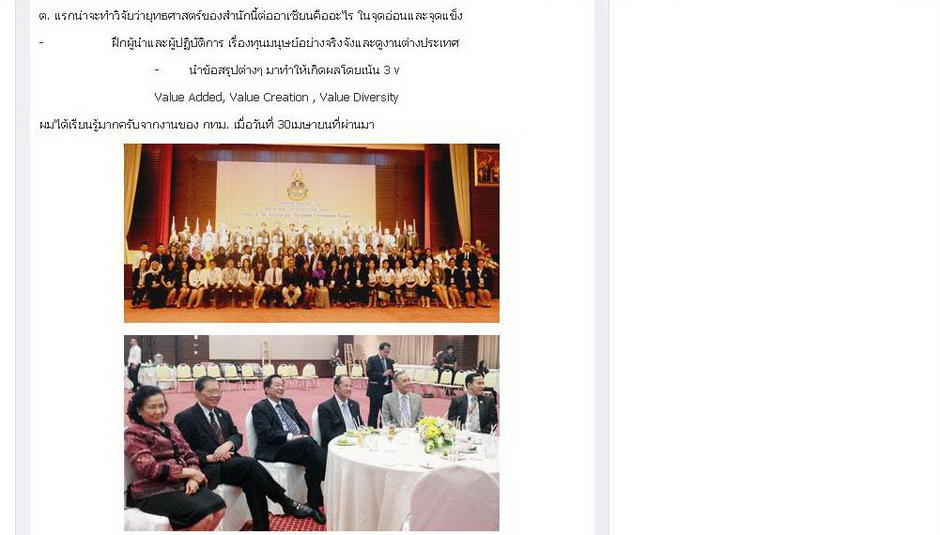
ที่มา: แนวหน้า วันเสาร์ที่ 4 พฤษภาคม 2556 หน้า 5
FIHRD TEAM
Day 5 Sunday 5 May 2013
Networking Capital Development for Anti – Corruption in ASEAN
09:00-12:00 Panel Discussion: Case Study of Anti- Corruption from Malaysia
Panelists:
Ms Fariza Omar (Superintendent, Community Education Division, Malaysian Anti-Corruption Commission, MACC)
Assoc. Prof. Dr. Juree Vichit-Vadakan (Secretary General, Transparency International)
Moderated by Prof. Dr. Chira Hongladarom
Ms Fariza began her presentation with an overview of the MACC. MACC was established in 1967 with an anti-corruption mandate covering both public and private sectors, in accordance with the Malaysian Anti-Corruption Commission Act 2009.
The MACC Act 2009 also empowers and authorizes the MACC to investigate offences under other Acts listed as "Prescribed Offences” under the Act, which came into force on 1 January 2009.
MACC has 14 Divisions with 20 branches throughout the country. In order to ensure that MACC operates under the principles of independency, transparency and professionalism, MACC is monitored by 5 separate panels, providing an effective ‘Checks and Balances’ mechanism. MACC submits an annual report to Parliament, but is an independent body. Where MACC’s investigations find sufficient evidence of wrongdoing, the case is forwarded to the Office of the Attorney General for prosecution.
In addition to enforcement operations, capacity building is also important. The Malaysian Anti-Corruption Academy was set up to train officers from Malaysia and abroad and was officially opened in 2007. The Academy is today recognized as ASEAN’s leading anti-corruption training facility. International cooperation was established through training courses conducted jointly with agencies including Interpol Group of Experts on Corruption, ADB-OECD Anti-Corruption Initiative for Asia-Pacific, UK Government, the UN Office on Drugs and Crime, and others.
MACC’s three key strategies are enforcement, education and prevention. In addition, the agency serves to detect loopholes and weaknesses in current legislation and offers advice on how to rectify them.
Globalization of corruption necessitates a stronger focus on international cooperation to fight corruption; MACC has therefore broadened its cooperation at bilateral and multilateral levels, through MOUs with groups such as the Interpol Group of Experts on Corruption (www.interpol.int), the International Association of Anti-Corruption Authorities (www.iaaca.org), and the Asia-Pacific Group on money laundering (www.apgml.org).
Malaysia ratified the UN Convention Against Corruption (UNCAC) on 24 September 2008, and a national Anti-Corruption Framework (NKRA) was established in 2009.
MACC has made progress in s stamping out corruption in government procurement by establishing the Integrity Pact in Government Procurement in 2010, setting up a ‘Name and Shame’ database. Other advances include the Whistleblower Protection Act (2010) and the establishment of special courts for hearing of corruption cases.
Ms Fariza continued with a discussion of anti-corruption initiatives relevant to the public and private sectors. The CORPORATE INTEGRITY PLEDGE (CIP) was developed as a document that allows a company to make a commitment to uphold the Anti-Corruption Principles for Corporations in Malaysia. MACC is the custodian for CIP. Partner agencuies include the Malaysia Integrity Institute, Transparency International (Malaysia) and others.
By signing the pledge, a company is making a unilateral declaration that it:-
- will not commit corrupt acts;
- will work towards creating a business environment that is free from corruption; and
- will uphold the anti-corruption principles for corporations in Malaysia in the conduct of its business and in its interactions with its business partners
By signing up, a company makes a clear stand of how it operates, and this will be locked down in writing. A company can use this Pledge to differentiate itself apart from its peers by demonstrating to its stakeholders.
The CIP espouses 5 anti-corruption principles, as follows:
1. Commit to promote the values of integrity, transparency and good governance
2. Strengthen internal systems that support corruption prevention
3. Comply with laws, policies and procedures relating to fighting corruption
4. Fight any forms of corrupt practices
5. Support corruption initiatives by the Malaysian government and MACC.
The Integrity Pact (IP) was originally developed by Transparency International (TI) to fight corruption in public procurement. Parties to the IP agree to abstain from bribes or collusion, and disclose all commissions paid. Sanctions (e.g. loss of contract, forfeiture of performance bond, blacklisting for future contract) will apply in the case of non-compliance.
The IP is defined as “An agreement between the government, or a government department (the authority, the project owner) and all bidders for a public sector contract”. Its purpose is to discourage bidders from offering or giving bribes, encourage reporting of corrupt acts, and to ensure that ‘unnecessary costs’ are not incurred to the Government.
Looking forward, Ms Fariza pointed to the need to rectify several weaknesses related to corporate liability in corruption cases. Current law provides for punishment of individuals only, even when company officers commit bribes on the instructions of the CEO or members of the board of directors. Legal amendment is needed to insert a provision for corporate liability in order to punish companies as well as individuals.
Malaysia’s Ministry of Finance issued the Integrity Pact directive on 1st April 2010, comprising the following:
1. Official invitation to participate in tender/quotations
2. Declaration of abstention from bribery – by all parties, at all stages of contracting (including registering as a supplier/firms)
3. Formulation of Code of Conduct
4. Contractual provision to abstain from bribery.
The objectives of the Integrity Pact were listed as follows:
1. Introduce programs to create awareness on the offences of corruption and bribery.
2. Promote awareness on offences of corruption and bribery in collaboration with the MACC.
3. Introduce compliance programs in respect of the relevant code of conduct in the execution of project.
4. Establish an independent monitoring system.
5. Impress the importance of disclosure of interest and/or conflict of interest among the Parties’ top management.
6. Place procedures on prevention of corrupt practices.
Parties to the IP commit that they and/or their respective employees and agents have not and shall not offer or give bribes in the execution of the Project. Moreover, for the purpose of transparency, the Parties shall disclose to each other any payments that has been made, is being made and intended to be made to agents, brokers or any other intermediaries in connection with the execution of the Project. The Parties also agree that in the event of the Parties’ employees or agents attempting to seek a bribe or be involved in corrupt practices in the execution of the Project, the Parties will promptly report the said action to the responsible authorities.
In the event that the Project Delivery Partner (PDP) through its employees or agents attempt to seek a bribe or be involved in corrupt practices in the execution of the Project, the PDP is also liable to be terminated under the PDP Agreement. However, strict proof before a court of law is required before such sanction can be applied.
Monitoring Of Mega Projects
Any project valued above RM500 million is considered as a ‘Mega Project’. MACC has been appointed as member of the Klang Valley MRT Project Executive Committee, headed by Chief Secretary to the Government. The project involves construction of a public rail transport network which, together with the existing light rail transit (LRT), monorail, KTM Komuter, KLIA Ekspres and KLIA Transit systems, form the backbone of the Greater Kuala Lumpur/Klang Valley region.
In regard to the role of youth, the concept of the Corruption Prevention Secretariat was defined, with the following objectives:
- Instill a commitment among students to eradicating corruption, abuse of power and malpractice
- Expose students to corruption prevention programmes
- Appoint students as anti-corruption messengers, within, as well as off-campus
- Raise awareness and internalize the value of integrity in performing their duties
- Educate and encourage students to organize community programmes emphasizing to promote nobles values
- Establish an academic centre with information related to offences of bribery, abuse of power and malpractice as well as the functions of curbing corruption
- Enhance bilateral cooperation.
Since its launch in January 2013, to date, 47 CPS have been established, with 20 located on university campuses, and a further 27 at teacher education institutions. The CPS perform the following functions:
- Coordinate implementation of corruption prevention programmes organized by MACC and student associations
- Provide guidance and information on organization of corruption prevention programmes and related activities
- Serve as liaison between the Student Affairs Division, the MACC and students when organizing corruption prevention programmes
- Create a pleasant environment for the Corruption Prevention Secretariat via attractive publicity materials such as bunting, stickers, brochures, pamphlets and other publication media
- Make the CPS office an activity centre for students during their free time.
Assoc. Prof. Dr. Juree Vichit-vadakan
Secretary General, Transparency International
Prof. Dr. Juree spoke on the theme of ‘Networking to fight corruption’.
The most important and influential of our personal networks is the family/ kinship network. These shape our ethical values and moral compass from an early age. Later, these relationships are extended further to the community, or tribal levels, nurturing within group members a sense of trust, reciprocity and goodwill.
As civilization evolved, in the ‘modern mode’, other forms of network emerged, e.g. shared occupations or guilds. These guild networks provided governance systems and a type of professional code of conduct, i.e. a ‘level playing field’. Today such networks are highly evolved and perform vital social as well as professional functions.
Reflecting on the strong influence of the seniority principle in Southeast Asian societies, Dr Juree noted that seniority does not always equate to age, but may also be denoted by position, status, power or prestige. These influences still operate even in a modern social context. With increasing mobility of populations, kinship and other linkages are disrupted, and new forms of affiliation emerge, e.g. among migrant labour groups. We see then the formation of new groupings and the ‘recreation’ of kin principles, e.g. through referring to each other using the pronoun ‘Big Brother’ or ‘Little sister’ etc...
The ICT revolution has changed life dramatically over the past 15-20 years, changing our modes of communication as well as how we acquire knowledge. Networking has been depersonalized; we communicate with people we have never met- not just for work, but also for pleasure. The distinction between work and play has blurred, and democratized many kinds of social interaction. The advent of self-publication (e.g. through web services such as Facebook, YouTube and blogging) have led to empowerment of small individuals in society.
Networking used to be vertical (linkages were narrowly defined and top-down in their nature). Today’s linkages are very different: they are horizontal (and therefore without limit), and cross all class boundaries. They offer huge potential as platforms for mutual assistance, e.g. through blogs and for shared special interest groups, discussions and connecting people with shared visions.
The downside of such a mode is that it is faceless and nameless, and the innocent can easily be exploited. So we need to develop new defences, and take new kinds of precautions to replace those that are innate in face-to-face interactions.
So how can networks help in combating corruption? There are many existing advocacy networks, such as anti-dam networks, networks against people trafficking, that are highly effective in mobilizing resources and bringing pressure to bear on governments, for example to establish stronger prevention measures and international agreements to protect women and children from international trafficking and exploitation.
Perhaps the strongest networks have been established by environmental advocacy groups. Transparency International’s anti-corruption network is also a well-established and effective global network.
Networks suffer from several drawbacks; participation is voluntary and requires significant and constant commitment to succeed, as well as financial resources. This helps explain why networks vary so greatly in their effectiveness. Moreover, because there may be no editorial oversight, verification of content is difficult, and ethics are sometimes blurred to serve the purpose of the network. Network members need to be especially careful to exhibit ethical responsibility, and be mindful that the information they post is disseminated globally and may lead to unexpected consequences.
Young people wishing to establish a network need to gain support from a diversity of actors- teachers, friends, donors, media, and government agencies (provided such support will not compromise your principles). With this caveat, it is generally good to be as inclusive as you can.
The power of the network comes from this inclusiveness and also, from a high level of tolerance of different opinions. It is important to note that in Asia we are used to authoritarian views were there is a very low tolerance to difference or dissent of any kind. It will be important at all levels of society that we learn how to tolerate diverse opinions. (The USA is powerful in part because of its integration and assimilation of immigrants, who inject a flow of vitality, energy and creativity into society and economic life.
Having reached out already to all the core members (family, friends, and key players) how do we go beyond this to expand an existing network? Networks need to reach out to others who are talented and who may empathize with its values, objectives and modus operandi. Who are they? How can we attract them? One effective approach is to tap into other networks that resonate with your cause, or with aspects of it. For example, we may build links and alignments with other networks by using other specialized networks to provide services, e.g. identifying resource persons, designing strategies, communication media and fund mobilization initiatives.
Finally, in every accomplishment of your network, remember that credit needs to be shared in order to sustain interest, motivation and support. Every member is a stakeholder.
Workshop- Four Questions
The Workshop was framed around the preceding presentations, in order to learn lessons and propose new ideas for networking. The following questions were posed to the four groups.
1. Learning about anti-corruption in Malaysia. What are the benefits to ASEAN efforts to curb corruption?
2. Who are the key stakeholders in ASEAN with important roles in tackling corruption? Give reasons for each role.
3. How to make networking strategies successful in anti-corruption in ASEAN?
4. In this workshop, how do we plan to develop our networking more effectively?
- technological aspects
- networking and ethical capital
- cultural diversity.
Group A: Anti-corruption Networking Strategy in ASEAN
Presented by Pawee Apicahrdsillapakdi (Thailand) and Sharon Wong (Singapore)
The approach is to divide into micro and macro levels, using mass media and new media (social networking) to communicate the message and connect individuals across the region.
Youth is an important target to reach, and behavioural change is easier to accomplish with the young. The network will make use of animation and cartoons to communicate anti-corruption messages.
A main anti-corruption website will bring together other social media and serve as a platform for interaction and social networks.
The group noted the need to build sustainability into the model from the outset.
Dr Juree comment:
This is a very practical and excellent idea, making use of humour to convey the message effectively to a clearly defined target demographic.
Group B: Who are the key stakeholders in ASEAN with important roles in tackling corruption?
Presented by Dwie Arum Meynina (Indonesia) and Cheryl Yeo (Singapore)
The key stakeholders are the public and private sectors, and civil society. The public sector includes the executive, legislative and judiciary. These are the ones
Companies often engage in Corporate Social Responsibility activities to build empathy and protect against anti-corruption efforts they believe may be against them. CSR for these companies is an exercise in image-building, not a commitment to integrity.
Educators play an important role in shaping norms for youth. The general public has a watchdog role.
Dr Churee comment:
The group is correct to divide into 3 categories. Without the “supply side” of corruption, represented by the private sector, there will be no corruption. We must address, stigmatize and bring to account bribe givers as well as takers. There is also a need to work with the public to embed norms that do not tolerate corruption.
Dr Chira comment:
Should include the media as an important stakeholder with a watchdog role.
Group C: How can we make our networking more effective?
Presented by Mr Jian Zhi Chua (Singapore)
Participants should take this opportunity to network with anti-corruption officials from all countries, use emerging technologies, and ensure they talk to all other participants.
Strengths: The use of social media / app or web portal for this event will help us communicate better because they are borderless, and allow us to continue to communicate freely among the group. This main network can also establish linkages with other networks.
Weaknesses: developing a web portal or app takes time and money. Connectivity in some countries may also be poor at times, so we should not relinquish traditional communication channels.
How can we promote ethical capital? On return to their home countries, delegates should share their learnings within their institutions, and consider running campaigns using social media.
The weakness or challenge will be to acknowledge the existence of different ethical standards across the region (for example, implementation at national level of the UN Declaration of Human Rights).
Delegates should also encourage the exchange of academic views, and publish papers themselves.
Dr Churee comment:
Well presented, including a balanced analysis of practical weaknesses too. The group’s approach offers opportunities for advocating changes in culture and raising ethical standards….
Dr Chira comment:
Although it is true that ethical standards differ today, it is likely that over time, and driven by an increasing cultural integration within AEC, they will tend to converge.
Group D: What are the learnings and benefits to ASEAN?
Presented by John Henry Tomayo (Philippines) and Mr Aung Naing Win (Myanmar)
First, the concept of the Integrity Pact, (transparency, independence, professionalism) is important and broadly replicable across all ASEAN countries. Second, it is important to target the young.
The University Integrity Pledge is also an excellent idea, offering the opportunity to set up; collaboration among universities in ASEAN, e.g. via a regional youth conference.
Education strategy in ASEAN should raise awareness among youth of the three principles of integrity.
The activities and ideas can be disseminated via networking and through education strategy, especially at university level.
Dr Juree comment:
This is very doable and practical suggestion. In fact NACC has an initiative to set up youth clubs at universities. In doing so, there is a need to set up a succession plan for students, and also to recognize and reward student participation in such activities as a credential on graduation.
FIHRD TEAM
Sunday 5th May 2013
Learning Forum 13:00-16:00
ASEAN and the ASEAN Economic Community
Assoc. Prof. Dr. Somjai Phagaphasvivat
ASEAN was created in 1967, and until 1993 could be characterized as a ‘loose organization’- economic cooperation only. But the onset of AFTA in 1993 ushered in an era of economic integration, and the beginning of the move towards AEC. The overall concept and process is based upon the European Union experience in economic integration.
AEC has 3 pillars under the ASEAN Charter. Today we will be discussing the first pillar- the economic pillar, and its blueprint.
It is first important to note that most obligations of ASEAN Member States under the Blueprint have already been met, with the exception of tariffs for sensitive commodities. This means that there will be no dramatic change in 2015 when the AEC officially comes into effect.
AEC’s objectives are summarized as follows:
1. Common Market and Production Base
2. Competitiveness Enhancement
3. Equalize Development
4. Global Integration
In terms of a common market & production base, we need to examine the free flow of goods, services and capital, investment, and skilled labour. We need a paradigm shift to understand the process of liberalization, and its continuation beyond 2015.
Could we replace ‘skilled labour’ with ‘labour’? A reactive mind-set means we only know through our eyes and ears. A pro-active mind-set can anticipate. It is likely of course that the free flow of skilled labour in the 7 currently-allocated professional categories is merely a test run; the trend cannot be reversed, and will only gather momentum, so that ultimately, there will be a unrestricted movement of all categories of labour, skilled or otherwise, across the region.
Similarly, in regard to the free flow of services, this will require dismantling of barriers such as foreign shareholding / ownership laws (which are particularly sensitive in Thailand). In IT, health care, tourism, aviation, and logistics (priority integration sectors), foreign (ASEAN) companies could hold up to a 70% share by 2015. In fact this process is already a fait accompli. We may logically expect this to increase to 100%, while the scope will extend to other, and eventually all, all service sectors.
Already, our way of life has become much more multi-cultural because of the attraction of foreign investment in ASEAN, and this trend seems certain to continue.
25 years ago, USA was Thailand’s top trading partner. Today, ASEAN is the main trading partner, representing 25% of all trade, and this proportion is set to increase.
ASEAN GDP- Although Indonesia is the largest in terms of population, Singapore is largest in terms of international trade, with US$662bn.
The second tenet of AEC is competitiveness enhancement, which means cooperation in the following areas:
• e-ASEAN
• Competition policy
• Logistics
• Tax
• Intellectual property
• Consumer protection
These requirements mean that technical barriers (TBTs) among ASEAN countries (e.g. national commodity standards) will have to be dismantled. This is because goods that enter one country tariff-free may still face excise tax barriers in the destination country. TBTs subvert the principle of free flow through their manipulation by governments to protect domestic producers and markets, in lieu of diminishing tariff barriers. Disparities in these tax rates impacts on competitiveness.
Is there potential for corruption through dominant position? Dr Somjai raised a provocative, but real scenario: what provisions exist to prevent the economic power of any one country dominating all the others? There will without doubt be a need for anti-trust and competition legislation, as well as consumer protection laws.
Finally, Prof. Somjai noted that AEC is only the beginning. With increasing linkages on mainland Southeast Asia through the GMS Economic Corridors, the scope for market integration expands. But we are also linked with China, Korea, Australia through bilateral FTAs. Eventually economic integration could expand to create a single market of over 4 billion people.
Across such diverse cultures and economic status, there is a need to equalize development, narrow the gap between old and new members, and support SMEs by giving them more leverage to compete in the regional arena.
Workshop
Group A
In regard to ASEAN cooperation on drug control, AEC may have no impact on cooperation.
Group B
Is AEC relevant to the fight against corruption?
Yes, it is certainly relevant. With liberalization and increased flows, opportunities for cross-border corruption increase. However, this opportunity would be minimized if standards in goods and services are harmonized among countries. The absence of uniform standards will increase uncertainty and foster corruption.
Group C
Is AEC relevant to corruption?
Yes: the flows of goods and services will increase and so will the problem. A supranational police force will be needed to streamline the processes of detection, investigation, arrest and prosecution of suspects.
Group D
Does AEC present new opportunities for corruption? Liberalization and the participation of many new actors offer a recipe for corruption. To pre-empt this, there is a need for a regional anti-corruption body to address the expected growth in cross-border corruption.
Dr Somchai conclusion:
All groups have identified the first key issue: cross-border corruption. Second, the larger size of the market will attract a greater volume and sophistication of corruption e.g. in the stock markets. ASEAN remains rich in natural resources, presenting an increasingly attractive opportunity for corruption related to large dams, exploitation of forests, and other environmental crimes.
In view of the above, not only must country-specific legislation be strengthened, but ASEAN will also need cross-country cooperation, although not supra-national force (as in EU) could not be contemplated--at least, not in the medium term.
Finally, Prof Somjai reiterated that corruption cannot be cured by legislation. There is a need to build awareness of corruption and its impact in civil society, i.e. through education from childhood.
FIHRD TEAM
Day 6: Monday 6 May 2013
09.00– 12.00 Learning Forum Panel Discussion: Leadership for ASEAN Youth
Prof. Dr. Kririt Boonyakiat
Dr. Sirilak Meksang, DBA (Senior Vice President, Standard Chartered Bank)
Moderated by Prof. Dr. Chira Hongladarom
Prof. Kririt:
You do not need to be born to be a leader. Leadership combines 3 properties all of which can be acquired or nurtured:
- basic knowledge and understanding;
- Ability to plan, and to convert plans into action. (The Balanced Scorecard is a useful tool to accomplish this);
- Monitoring and controlling accomplishments (managerial skills).
Leadership involves much more than administration. Prof. Kririt reminded participants of Peter Drucker’s observation that in leadership, when you climb the ladder of seniority, you will need 5 qualities:
1. Ability to manage your time -80% of your time is wasted. (You need 3 diaries: 1) to do list; 2) keep near your bedside to write before you sleep what you have accomplished that day; and 3) control (what your close friend/spouse observes what you have accomplished. The three diaries should end up looking similar after 6 months.
2. Priority-setting. List becomes longer and longer, so everyone must prioritize.
3. Focus on your contributions. What is your usefulness? What does your employer pay you for?
4. Drucker also said that good leaders capitalize on their strengths; forget your weaknesses.
5. Problem-solving ability and willingness to take unpopular but morally correct decisions.
Prof. Kririt summarized four pillars of leadership, as follows:
1. Think about yourself. It is essential to have a vision, but think first about what you have to do to be independent – academically, financially, personally.
2. Family support is also important. In Asia, Confucianism is an important influence on thinking; the first tenet is to study hard, and the second is to save. (Both these tenets have been eroded considerably today). The third tenet is perseverance (never give up), and the fourth, to respect seniority and culture. (This is the agent of reconciliation within families). The fifth tenet is teamwork. Today, being a good follower is a prerequisite to being a good leader.
3. After helping the family, next level is to help the local community. Teach them something you know.
4. Study others in ASEAN and try to work with commonalities, while respecting the differences.
These are the 4 pillars of leadership.
Dr Sirilak Meksang
Dr Sirilak offered her observations and recommendations on good leadership, based on her extensive experience in human resources development. She began with a quote from Drucker:
“Management is doing things right; leadership is doing the right things”
It is vital that aspiring leaders should provoke their own thinking, and identify several role models? Different leaders offer different contexts and perspectives, and we can learn and adapt from them all.
Challenges for today’s global leaders include acceptance of diverse viewpoints and openness to new ideas; understanding complexity by nurturing strategic thinking and problem-solving skills; and living with uncertainty.
The work of leadership is to inspire others; instead of thinking “I go to the office to work”, think: “I come to the office to create”. Dr Sirilak pointed to three other functions of leaders:
- To connect with others and create borderless organizations;
- To lead others to create value: anti-corruption is embedded in the organizational culture;
- To mobilize people to adaptive work, leaders must create some tension within the organization, so that followers are driven to innovate, adapt and find new solutions.
In summary, leaders must succeed in creating an environment to allow diverse groups to talk to one another. Successful leaders provide direction, protection and orientation for followers, whilst managing conflict and shaping the organization’s norms and values. To accomplish all this, leaders need significant social skills, especially the emotional capacity and psychological stability to tolerate uncertainty, frustration and pain.
Expanding on this point, Dr Sirilak noted characteristics which lie at the heart of successful leadership. These are an emotional connection, and integrity.
Emotional connection
Leaders need to establish an empathetic relationship with people from all backgrounds. This requires-
- A sincere interest in others;
- Ability to genuinely listen to people;
- Ability to understand and respect divergent viewpoints.
Integrity
Successful leaders have a strong commitment to personal and organizational standards, and demonstrate ethical behaviour in the organization’s external as well as internal relationships.
Leadership may also be regarded as a process, with the role of leaders becoming increasingly facilitative:
“The effective leader of the future will be a constructor of a learning environment that is fertile and provocative.” (Whiteley 2099)
Thus, leaders need to create a conducive environment to facilitate the learning of individuals and groups, using the organization’s strategic goals as a roadmap. This means helping people to unlearn as well as learn, and so leaders also need to perform the role of coaching. The art of giving feedback is therefore very important; giving negative feedback is very difficult, especially in the Asian culture of face-saving and conflict avoidance. These attributes are desirable in moderation, but ultimately tend to block communication and cause harm to individual and organizational performance. Communication style is therefore critical in calibrating a leader’s way of providing this feedback to others.
In conclusion, Dr Sirilak noted a number of leadership characteristics that are globally valued and can stimulate organizational learning and competitiveness.
- Ability to articulate a tangible vision, value and strategy
- Being a catalyst for strategic change
- Being result oriented
- Empower others to do their best
- Being a catalyst for cultural change
- Exhibiting a strong customer orientation
- Be flexible and adaptive
- Communicate effectively on a day-to-day basis.
Commenting on the presentation, Prof. Chira summarized key qualities of leadership as follows:
1. Character
- Lifelong learning
- Positive thinking
- Ethical capital
2. Leadership skills
- Decision making
- Negotiation
- Teamwork
- Get things done
3. Vision and ability to anticipate the future
4. Trust
Workshop
Following the panel discussion, a workshop was conducted, with participants divided into four groups (A-D) to address the following issues:
1. To prevent corruption explain the following concepts in the context of ASEAN:
- Character, Process, Trust and Skills.
What are the requirements for each?
2. What anti-corruption initiative will you take when you return home?
3. What leadership properties are most direct and useful for anti-corruption movement?
4. As members of ASEAN youth, how could you create a culture of anti-corruption?
Each group presented their responses, which are summarized as follows.
Group A (responding to Q1)
In considering the four characteristics in an anti-corruption context, trusted leaders are important, as trust leads to credibility. In terms of process, establishing clear norms and standards of expected behaviour are important to establish trust and exert control over followers. Leaders also need to acquire a range of skills (e.g. financial expertise to ensure the financial health of the organization, and human skills to negotiate, relate and empathize).
Within this context, the group noted several key leadership qualities:
- Maintaining an open mind on corruption issues
- Nurturing personal integrity among followers
- Keep up to date on issues and initiatives related to corruption, domestically and internationally.
- Ensure a positive mindset to constantly inspire others.
Group B (responding to Q2)
In responding to the question: “What initiative will you take when you return home?” Group B proposed the application of Human resource development theory to the fight against corruption, taking a four-step approach:
1. Investigation- who are our targets? What are our objectives? Why do we have to do this?
2. Design: Our target is youth. The timeframe should be annual to coincide with the academic year.
3. Processes and activities: these will include workshops and camps for primary and secondary schools. Involve stakeholders including mass media, commissioners.
4. Implementation: Logistics are important: must be an organizer, and arrange activities according to the target groups (youth). Resourcing: seek sponsors and set budgets, allocate manpower for various roles. Alternative plan to be implemented should also be developed.
5. Evaluation: After we have done the investigation, design and implementation, we need to evaluate its value and effectiveness. Formal or informal? Informally we can just talk to the students to establish their views. Review can be done every 3, 6 or 12 months.
Group C (responding to Q3)
What leadership properties are most important for anti-corruption movements?
1. Emotional connection, sincerity, listening and understanding
2. Integrity and commitment to organization.
3. Lifelong learning, positive thinking and ethical capital.
In conclusion, it may be impossible to achieve zero corruption. But we can take the first steps, starting with ourselves.
Group D (responding to Q4)
In responding to the question: “How to create a culture for anti-corruption in ASEAN?” Group D noted that because our target is youth, we need to inculcate a ‘moral mindset’ within young people so that they develop ethical capital as adults.
Group proposed a contest to select anti-corruption role models. The programme will be implemented over a 3-5 year period, and will use social media channels to broaden the impact. A contest will create excitement, and will aim to enhance the appreciation of the importance of leadership within the family.
The group also proposed electing male and female SEAN Anti-Corruption ambassadors as role models. Such persons will be selected according to their qualities of integrity, civic activities and academic record, and will also need endorsement from their university.
The group believed that corporate sponsorship may restrict options, and so will encourage people to find other avenues for raising funds; this will also increase the sense of ownership.
Wrapping up the Workshop session, Dr Chira congratulated speakers for their clear and articulate presentation of their cases. He made three comments:
1. If we can combine the 4 presentations we can produce a paper on leadership and the anti-corruption movement in ASEAN.
2. There are three phases in this initiative: planning the Youth Camp with NACC, implementing the activity, and then – the most challenging part – will be following up and continuing activities at regional and national levels after the Youth Camp.
3. Persistence – Dr Chira urged delegates to stay focused and not give up.
FIHRD TEAM
13.00 – 16.00 Panel discussion: Learning from corruption case studies in ASEAN
Case Studies of Anti- Corruption in Thailand, Singapore and Cambodia
Panelists:
Assoc. Prof. Dr. Sirilaksana Khoman (NACC Advisor, Thailand)
Mr Bora Nhem (Deputy Director, Dept of Legal Complaint and International Affairs, Anti-Corruption Unit, Cambodia)
Mr Wilson Khoo, Senior Special Investigator, CPIB, Singapore
Moderated by Prof. Dr. Chira Hongladarom
Learning from Anti-corruption case studies in ASEAN: a case from Thailand
Prof. Dr. Sirilaksana Khoman
Dr Sirilaksana presented a case study of corruption in the Klong Darn Waste Water Treatment System Project, Samut Prakarn, Thailand.
The project occupied 1,900 rai of land adjacent to the Chao Phraya River near Bangkok. The facility was designed to serve a nearby industrial estate, and involved construction of a pipeline under the Chao Phraya River. The project was officially started in October 1995.
However, the project was hijacked by influential politicians, and the site of the facility was ordered to be moved further along the coast, away from the Industrial estate.
Villagers in this community became suspicious following a series of suspicious purchases and resale of land in the area. The purchases were traced to a powerful Minister, who, along with his associates, was found to have cross-ownership in all the companies involved. The lad, which had been originally purchased from villagers at Baht 20,000/rai, was sold by the new owners to the government for Baht 1 million per rai.
This was perhaps the most complex investigation ever conducted by NACC, which over time, exposed an intricate network of companies, cross-shareholdings and conflicts of interest.
The result of the long and complex investigation was as follows:
- 2 Ministers were convicted and sentenced to jail - one died, one fled the country
- In all, 8 out of 13 defendants were convicted, some have since died
- 3 local administrative officers of Klong Darn were dismissed
- Each company was fined Baht 6,000 (the result of outdated penal provisions).
Lessons learned from this case were as follows:
- Importance of people’s participation and vigilance
- Network of integrity needed
- Database needed to detect connectedness and speed up investigation
- Holistic approach to complex investigations is required
Dr Sirilaksana also pointed out that this case took place before promulgation of the current constitution, which prohibits the Prime Minister, Ministers and senior civil servants from ownership of more than 5% in shares in any private company.
She also emphasized the importance of measures to ensure transparency and good governance. Many of the criminal acts forming part of the Klong Darn case could have been thwarted by effective statutory measures for good governance and transparency. Bearing this in mind, the role of a truly independent judiciary, effective checks and balances, asset declarations, conflict of interest rules, transparency in party financing, accountability in political leadership, and disclosure of parliamentary votes cannot be overstated.
The role of civil society in governance also needs considerable improvement in Thailand. Despite statutory freedom of access to official information, civil society groups are often prevented from obtaining necessary information. There needs to be full engagement with civil society groups, e.g. in consultations and public hearings of draft laws, and in monitoring public administration and public finance.
Remaining questions include the strengthening of current legislation to plug loopholes, reform of judicial processes that are focused on technicalities rather than the big picture, and enhancing efficiency of investigations and legal processes once corruption is detected. NACC’s role in preventative investigation is currently at the policy formulation stage.
Dr Sirilaksana noted other mega-projects in which NACC is currently interested:
- The government’s agriculture intervention policy (rice pledging scheme)
- The NGV bus procurement scheme
- Investigation of issue of 3G concessions
- The 350 billion baht flood prevention project
- Suvarnabhumi airport expansion
Dr Sirilaksana concluded by noting the success of more aggressive measures against the “unusually rich”. Recently, the home of Transport Permanent Secretary, Supoj Saplom was burgled. The burglars escaped with Baht 19 million in cash, but when apprehended the next day, told police that there was “much more” in the house. The twist came when Supoj (the “Burglaree”) denied this. He had not declared this cash in his asset disclosure as required. As a result, his assets of Baht 64 million were confiscated and he was removed from office.
Given the scale of corruption in Thailand, NACC faces an enormous task in its endeavours. Dr Sirilaksana ended with a quote from Churchill:
“Success is the ability to go from one failure to another without losing enthusiasm.”
Dealing with Corruption- the Singapore Experience, Wilson Khoo, Senior Special Investigator, Singapore Corrupt Practices Investigation Bureau (CPIB)
Corruption is a fact of life in Singapore, but unlike some other countries, corruption cases are usually the result of individual rather than institutional corruption, i.e. it is not systemic in nature. Singapore is ranked as having one of the cleanest public sectors in the world.
Corruption is considered not just a moral issue- it is a crime, and dealing with it is strategic to national development. IN 2012, Theo Chee Hean, Deputy Prime Minister, emphasized Singapore’s zero-tolerance of corruption, and the need for the population to reject corruption in all its forms.
As well as zero tolerance among all sectors and levels in society, tackling corruption needs political will, an independent judiciary, an independent anti-corruption agency, and effective legislation.
The cornerstone of anti-corruption legislation in Singapore are the Prevention of Corruption Act (PCI) and the Corruption, Drug Trafficking and other Serious Crimes (Confiscation of Benefits) Act (CDSA). PCI gives definitions of gratification and confers wide powers of investigation. CDSA criminalizes laundering of benefits and allows their confiscation.
Effective enforcement requires the following:
- Independent judiciary
- Deterrent punishment and judicial reforms
- Effective enforcement
- Sharpen the instruments that could detect, deal and deter corrupt practices. Turn corruption into a high risk, low reward activity,
In explaining the low incidence of corruption in Singapore, Mr Khoo pointed to the responsive civil service, unambiguous rules and regulations, the practice of meritocracy within the public sector, and streamlining of processes to improve efficiency and effectiveness.
CPIB is an independent agency reporting directly to the Prime Minister’s Office. It began its operations in 1952, and investigates corruption in both private and public sectors. CPIB is empowered to investigate and arrest suspected offenders for offences under any law.
Me Khoo presented three case studies
- Case 1- four chefs charged with taking bribes
- Case 2- Ah Long San (loan shark who obtained proplice protection in retirn for entertainment in his pubs, “cultivational”, not transactional corruption).
- Case 3: Choy Hon Tim, (official at the Public Utilities Board, convicted of receiving S$ 13.85 million in bribes from a contractor in return for award of public utility contracts.
(details in Powerpoint presentations)
Mr Bora Nhem (Deputy Director, Dept of Legal Complaint and International Affairs, Anti-Corruption Unit, Cambodia)
Law enforcement in fighting corruption in Cambodia
Case Study: Arrest and trial procedure of a judge committing a corrupt offence.
Role and duties of ACU (http://www.acu.gov.kh)
Cambodia’s first anti-corruption law came into force on 17 April, 2010 with 57 Articles in 7 chapters. The new law required the establishment of the National Anti-Corruption Council and the Anti-Corruption Unit (ACU). A four-pronged approach is adopted:
- Education
- Prevention
- Law enforcement, and
- International cooperation.
The National Anti-Corruption Council comprises 11 appointed members from different backgrounds, appointed for a 5 year term. Its duties are to develop strategies, oversee ACU, and report to PM.
ACU is the executive body. Its duties are to implement laws and regulations, action plan, monitor, investigate, research, manage asset and liability declarations, and conduct mass education and awareness to encourage public participation. ACU cooperates with national, regional and international organizations to combat cross-border corruption.
Under Article 28 and 29, the ACU has powers to access bank accounts, monitor phone calls, freeze assets and seize documents, computer files or other evidence. Also, under Article 25 of the Anti-Corruption Law, the ACU uses judicial police officers rather than regular police, in the investigation of corruption offences up to the point of arresting a suspect.
An Amendment to the Anti-Corruption Law was promulgated on 1 Aug 2011, conferring additional authority to the Chairman of ACC to organize and appoint officials of ACU (Article 10). Also, under the revised Article 16, ACC is authorized to have a separate budget package under national budget.
Art 33-49 of the law stipulates all corrupt offences and penalties.
Complaints to ACU may be submitted in a number of ways:
- Walk-in complaints;
- Put complaint in ACU “White Box” located at many points around main cities and towns;
- Drop complaint in post box
- Hotline, fax, email
The victim can complain personally, or may do so via through a 3rd party. A case analysis team will review the complaint and decide whether to accept the case.
A breakfast briefing session is held every day to update staff, coordinate activities and set priorities. .
All complaints must identity the suspect wrongdoer, and state whether this complaint has been submitted to any other institutions and what actions were taken. ACU provides protection for witnesses under the law.
Mr Bora Nhem then presented a case study of a case where a judge was accused of threatening a witness with an arrest warrant, forcing the witness to pay a bribe of US$ 5,000.
The victim came to ACU and submitted a complaint, following which the ACU accepted the case and mounted a pre-operation to collect evidence. Under Article 27 of the ACL, ACU intercepted communications between the victim and the judge, and provided the cash bribe for payment. An operation was then launched by judicial police officials after 5 hours of surveillance, leading to the judge’s arrest in his own office following the handover of the cash bribe.
He was then detained and suspect sent to Court. The Appeal court sentenced him to 5 years but suspended 2 years, so 2 years were actually spent in prison.
Other key successes of ACU in law enforcement include the following:
- Arrest of Provincial Prosecutor in Nov 2010
- Arrest of former head of Anti-Drug Dept in Jan 2011
- Arrest of judges, journalists, military police, officials from some ministries
- Action taken against some taxation officials.
Q&A
Q. As corruption in Singapore is not high, how do you raise public awareness?
A. WK: In Singapore, we have only recently started our outreach work, and have begun to step up this aspect. I can’t explain how we have been able to keep corruption so low, except that Lee Kwan Yew has always been strongly focused on fighting corruption. It may be that he has served as a role model for Singaporeans.
Q. We have learned a great deal today. There is a bill on Freedom of Information, Does this impinge on private rights of individuals?
A. SK: Thailand has had an Official Information Act for 19 years. Concerns over privacy are already addressed and institutionalized. For example, we [at NACC] are forbidden from knowing or disclosing information on other cases, and can be punished. In order to exercise our surveillance powers, we must show probable cause; all inquiries into the database are logged. Internal controls are therefore important in order to protect confidentiality of data.
WK- Where is the line? In relation to Singapore, the procurement and tendering system is clearly defined so that everyone knows the system. Moreover, the electronic system reduces opportunities for bribery. The Act protects informants of corruption; informant names cannot be disclosed, even in court. Any documents submitted in court that may reveal the name of the informant, cannot be disclosed to the public.
Q. Does your government accept anonymous complaints?
A. BN: A new bill is being drafted regarding access to official information. Info on procurement needs to be publicly disclosed. We accept anonymous complaints but do require an email address. With growing confidence and trust, we are receiving an increasing proportion of signed rather than anonymous complaints.
Q: What advice do you have put us on the right track?
A. SL: Conflict of interest is a serious problem, as the concept is not ingrained in the Thai psyche and so more education is needed to raise awareness of avoidance of conflict of interest.
FIHRD TEAM
Day 7 Tuesday 7 May 2013
09:00-12:00 ASEAN Anti – Corruption Digital Linkage (1)
Mr Sutkhet Cheiklinthos and Natawan Wongkachonkitti
e-Government Agency, Thailand (EGA, www.ega.or.th)
EGA is an autonomous agency established in 2011 as a Public Organization under the Ministry of Information and Communication Technology, or MICT. EGA provides e-government services to all Ministries and public agencies. Prior to this, EGA was a Department under the National Science and Technology Development Agency.
Corruption is commonly believed to occur mainly in the public sector, but in fact is also a major problem in the private sector, especially among large conglomerates. Corruption is the norm in many cultures around the world, including most Asian countries. Corruption is defined not only in monetary terms, but also in terms of non-cash favours, positions or sharing of privileged information.
The social media tools available to all today are powerful and sophisticated, and can play a significant role in countering corruption. In some cases ‘Good Samaritans’ have used smartphones to take pictures of traffic policemen taking bribes from motorists in the street, and posted them on Facebook, resulting in dismissal of those officers.
However, social media must be used with caution: you have to know how to use them. Used properly, social media can bring together three complementary forces- people, process and technologies, offering a powerful approach to countering corruption.
Using social media to report corruption whilst hiding the poster’s identity has flourished in Thailand because of fear of retribution. However, although it is possible to hide one’s identity online, the speakers warned that it is technically possible to trace even anonymous postings through IP addresses. However, anonymous or otherwise, all postings should be done using language which is concise and polite. As in any other context, abusive language online is unacceptable as (a) it destroys the poster’s credibility and (b) leaves them open to potential litigation.
Facebook is by far the most popular social medium, with an EGA survey reporting 63% usage, and 20% using YouTube, mostly among young people below the age of 25. Usage of social media by government agencies has also increased considerably, especially for PR activities, with the majority using LinkedIn, YouTube, Facebook and Twitter as the most effective media channels.
EGA cooperates with the Thai Chamber of Commerce, Federation of Thai Industries, the Thai Bankers Association and the Stock Exchange of Thailand as well as key public agencies concerned with fighting corruption. EGA participates in a joint initiative called ‘Open Government’ to promote transparency and monitor government activity. EGA is also a partner in the private sector initiative: Against Corruption Today (ACT).
Questions from participants included the issue of balancing the right to access public information against the right to privacy. The speakers explained that Thailand as well as most Asian countries has an Official Information Act and a privacy law to protect individual rights, but ultimately, this is a matter of personal judgment. Sometimes an independent third party is needed to arbitrate.
Dr Chira proposed a digital linkage between EGA and the ASEAN anti-corruption network. He noted that governance is more important than government, because this emphasizes ethics.
Finally, the speakers reminded participants that information obtained from social media should not be accepted without cross-checking and verification. In this sense, information from mainstream media is more credible since there is ownership and accountability. In online searching, one should generally avoid sponsored online search results and cross-check among various credible websites in order to verify.
Following this briefing, participants divided into workshop groups to brainstorm the establishment of social media initiatives to fight corruption, including logo design, privacy/group policy, language, category content (text, pictures, video etc.), and how to publish information (via web portals such as FB, YouTube, etc.), or personal channels (Line, Twitter, etc.).
13.00-15.00 Learning Forum & Group Activity (Continued)
ASEAN Anti-Corruption Digital Linkages Workshop
Each group presented their proposals as follows:-
Group A
Logo
The proposed logo for Group A is based on three principles- leadership, transparency and advocacy. These three principles appear in Latin at the top. It also includes a red flag to symbolize the fight against corruption, a weighing scale, symbolizing justice, and the ASEAN logo.
The logo backdrop is a shield (signifying protection of citizens against corruption), and laurel leaves, indicating gender equality.
Policy
In terms of policy, the group proposed a Code of Conduct, comprising the following:
- Respect for all countries
- Self-censorship
- Diplomacy
The site will be accessible to the public, although privacy settings will allow restriction of discussion of sensitive issues to registered members only. With English as the main language, Google translation will be available to translate from to the languages of ASEAN.
Content
Video, text and images will be accepted for posting, including photos or video clips of corruption (“Caught in the Act”).
Apart from the website, the group proposed conducting activities such as workshops aimed at to raising awareness, as well as a hotline, and weekly quiz with prizes. The website will also feature easy-to-read articles for children to read.
Financing
The initiative will be financed via popup advertising, and through a scheme to develop an industry “corruption-free” standards, with companies subject to audit and payment of fees for certification. Printed media will be needed to complement online media.
Group B
Logo
The logo and initiative for Group B was entitled: “Believer Youngsters.”
The logo consists of a simple sunflower with black crosshatched circle at the centre (symbolizing systemic corruption that is a ubiquitous and systemic cancer in our society). The petals represent the youth of today and tomorrow, and the stem is a 3-coloured chain representing linkages among all ASEAN members.
Policy
ASEAN Anti-corruption youth believes everyone has a role to play, not only young people. Therefore the site will be open to all, and inputs of ideas, actions and passion will be encouraged. The site will encourage everyone to be vigilant – not just the young.
Derogatory, offensive or discriminatory language will not be tolerated. Contributors should not just complain, but should also propose constructive, tangible solutions to rectify corruption for a better ASEAN.
Content
English will be used as the main language, with posts classified based on Country, with a Q&A section, and specific sectors- politics, private sector, and others as needed. Posts will also be classified by month. The site will also include photo and video galleries.
Publication
Messages will be disseminated both online via social media, as well as face to face. The site will use a wide range of popular social media, including a Facebook page, Twitter, YouTube and Instagram, as well as Keek (for recording and posting videos), WeChat and Dropbox for file sharing. The group will also use Line, MSN Messenger and WhatsApp.
Group C
Logo
Group C unveiled its “ASEANYoung” logo, featuring a human figure with open mouth (signifying freedom of speech), crossed arms (symbolizing strength), and long, free-flowing hair (signifying the incorruptibility of youth). The accompanying slogan reads:
‘Building bridges, breaking barriers, fighting corruption’.
Policy
The web portal will have the following objectives:
- Publish relevant news sourced from credible news agencies to create a ‘One-Stop-Shop’ for all news concerning corruption in the region
- Publicize upcoming events via an events calendar
- Encourage regional cooperation among youth across the region by providing a platform to interact and share ideas and report corruption.
Content
All content will only be put on site with permission of the original holder of the intellectual property rights.
The official language will be English, with web plugins (Google, Bing) for translation to all ASEAN languages.
Existing social media networks will be used to disseminate information, and all platforms (Facebook, Twitter, Tumblr) will be brought together on the blog website to show live updates.
Web portal structure
The group proposed a structure for the web portal, sketching out the key components. The Homepage will contain an overview of ASEAN member states and history, and links to team organization of the team (About Us), the motto, vision and mission of the initiative, affiliated organizations (e.g. UNICEF, World Bank, UNDP etc.) and contact details.
The site will aggregate published news from credible news agencies, and publicize upcoming events.
The group concluded with an inspirational quote by Leonardo da Vinci:
“I have been impressed with the urgency of doing. Knowing is not enough; we must apply. Being willing is not enough; we must do.”
Group D
Logo
The group’s logo contained the ASEAN flag and those of all ASEAN member states. The logo’s perimeter features the words ‘Justice’, ‘Integrity’, ‘Unity’ and ‘Transparency’ and key guiding principles. In the centre, a lens focusing on bribe being offered denotes transparency, while the logo’s colours are also significant- white for justice; green for youth / energy; and yellow for hope and integrity.
Policy
- Web portal should be available to the general public
- Postings will be limited to members, who will consist of the youth in ASEAN
- Membership is on an application basis. Only members are entitled to participate in discussions, comment, post and share suggestions.
- Content of postings must respect the following conditions:
o Respectful
o Mindful
o Insightful
o Platform should not be used for purposes of advertising, whether commercial in nature or not.
The language should be English, with buttons for translation into ASEAN languages. However, authors will have to post in English, plus their native language as appropriate.
Publishing
The site will post general information on corruption, current anti-corruption initiatives, and related posts on anti-corruption measures or news from other organizations.
Articles might contain details of anti-corruption activities in the form of text, pictures or videos. It wil be important to verify the accuracy, truth and validity of all content to be published.
Direct feedback from non-members will be encouraged using portals such as Facebook, Twitter and Instagram.
Judges’ Comments:
The judges congratulated all four groups on their innovative presentations, all of which contained unique features and approaches, and identified different dimensions of the overall challenge. After careful consideration, the judges thanked all groups and announced Group B as the overall winner.
FIHRD TEAM
Day 7, 15.00
Media and Corruption
Mr VoranaiVanijaka, Bangkok Post
Thailand is perhaps one of the world’s best places to learn about corruption.
Bangkok Post is Thailand’s first newspaper, and also the country’s first English language paper.
We may begin with a fundamental question. Why do the media do what we do?
The holy trinity of a democratic society comprises government, the citizenry and the media The government’s role is to ‘protect and provide’- protect from invasion or internal security threats, and to provide a conducive environments within which its citizens can live, work and be free and happy. In order to accomplish these responsibilities, governments need to be vested with a lot of power- power over the law, over all State agencies, and over the people. But as we know, power corrupts.
So, acknowledging this reality, how can the people combat corruption within the government itself?
There are many ways, including the media, which functions as a check and balance in society. The media therefore has an investigative role, to report on and expose corruption by the powerful. Nevertheless, people often misunderstand or misinterpret the role of the media. Corporate PR departments seem to believe that the media exist to help publicize their products, whilst government PR departments think the media’s main role is (or should be) to publicize government policy.
These are all misconceptions. The media’s primary job is to serve as a check and balance on behalf of the people, in order to curtail abuse of power by the government. It is our job to minimize such excesses rather than tolerate it, and allowing corruption to become normalized and destigmatized within our society.
There are of course many obstacles in our path, such as legislation designed to curtail the powers of the media e.g. censorship laws, intimidation and threats against journalists by the powerful. But that is not the most important obstacle. The most important problem lies within media organizations themselves. We must first examine media ownership. State-run or state-supported media can never be expected to check corruption. On the other hand, mass media are owned by big businessmen who can exert various degrees of control, to ensure that news coverage does not impact on their long-term business interests or political aspirations.
Worst of all, we end up censoring ourselves because our Asian culture deems it inappropriate, disrespectful, or frowned upon to question the authority of our elders, our leaders, the rich. Such scrutiny and challenge run counter to our cultural values in Asia.
So, as an individual, you have a choice- should you take the easy path and serve the Establishment, or remember the media’s role in society and serve the ‘Holy Trinity’? If it is the interest of countries to achieve genuine democracy, transparency, governance and accountability, then it surely follows that the role of journalists and newspapers is to always pursue the truth, expose lies, and uncover corruption, wherever this may lead.
In Thailand, survey polls on attitudes to corruption are held every few months. The results are always discomfiting; around 60-70% of Thais report they will accept corruption, so long as the government will take care of our well-being. Such attitudes signal a serious problem in society; such a high level of tolerance allows corruption to flourish unfettered.
That is why it is the job of journalists and other civil society groups to change this perception, to educate ordinary people that corruption is not OK; it is not a victimless crime. We pay taxes that pay the salaries of government officers; they are our butlers, our servants, our maids. If they steal from us from a position of trust, how can we accept this?
Fighting corruption is of course not the job of any single agency or media house- it is everyone’s job and moral duty. After all, in a democracy the people hold the power. MPs are in power because we elect them, and so Thailand is in its current state today only because we ourselves have chosen this path. We can blame no-one else. The media represents only one pillar of society, so corruption can never be curbed unless the other sectors of society- especially the people- actively want it. The people can gain a great deal of support and encouragement if the media is ready to stand up and lead the way, and help to educate the people that they have the power to affect the destiny of their country.
Whatever you are doing in life, you can educate your circle of friends and fight corruption. Make a stand. It will never be easy, but as we know, nothing worthwhile in life is easily accomplished.
Questions and Answers
Q: Could you comment on the involvement of tycoons in politics?
A. This can open up many opportunities for corruption when power is so concentrated. But all we can do is to continue to investigate, to write, and to expose. Today, we have so many tools to fight corruption and call wrongdoers to account. Powerful politicians can’t do much these days, as every phone has a camera. This is all we can do.
Q. What about corruption within the media itself?
A: Of course this can happen, but there is no single media outlet. In Thailand we have over 20 newspapers, many TV stations, web media, and they are always watching and biting each other. So under such diversified ownership and a competitive environment, the media tends to monitor itself.
Q. What can we do State-owned media or media that clearly favour the government line?
A. As far as State control over the media is concerned, it is certainly likely that some media can be used as a tool for governments. Whilst we might be able to spot this, there is little that can be done within that organization. But independent media still exist; the important guidance is never to take one’s news from just one media source. Compare several independent sources and you will see the differences. The rest is for the individual to judge.
Q. What about extra-judicial killings of journalists, which has happened a lot in some countries in the region?
A. In Thailand, the Press remains relatively free and there is strong competition. Although activists and lawyers have been pressured, threatened, intimidated or murdered for expressing dissenting views, Thai journalists have generally not been targeted. In such a sad eventuality, the only proper response would be to continue and redouble efforts to support the initiatives driven by those whose lives have been sacrificed. [Note: according to the Committee to Protect Journalists, since 1992, 16 journalists have died of various causes in Thailand, 10 of which are explained, and 6 remain unexplained. Some are corruption-related. For further information, see www.cpj.org which collates and documents attacks on journalists by country].
Q. Could you comment on the role of defamation law in stifling the reporting of corruption?
A. Let me comment on last week’s Mongolia speech by the Thai Prime Minister, Yingluck Shinawatra. A cartoonist at Thai Rath (a Thai-language, mass-circulation daily) almost compared the PM to a prostitute. No one deserves to be subjected to that. But Thiland has freedom of speech, which permits citizens to be disrespectful. At the same time, the affected party has the right to file defamation suit against Chai. But the MICT’s threat to close websites that criticize the PM is undemocratic. But she handled it badly.
Q. Could you comment on the role of the media: some investigations were only launched following media exposure.
A. What happens after the story is out? The media have no powers of arrest or prosecution. Once it has done its job, it is for others to do theirs, and we can only report, publicize and monitor.
Q. With the dangers to which journalists are exposed, what has been your inspiration to be a journalist?
A. I was never meant to become a journalist! I studied philosophy and history at university, and so I became a teacher and a writer. The motivation is a passion to see change in society, and be a part of it, “To change the world, one article, one student at a time.”
Dr Chira and the representative from the Lao PDR delegation thanked Mr Voranai for sharing his passion and experience with the group.
FIHRD TEAM
Day 8: Wednesday 8 May 2013
Visit to Thai Chamber of Commerce
Mr. Isara Vongkusolkit, Chairman of TCC
TCC was established in 1933 by local merchants as non-profit trade association, while BOT was set up in 1955 and reports to the government. The 2 orgs work together to facilitate business in Thailand.
The mission of TCC is to sustain a strong private sector, protect the interests of its members, negotiate on their behalf with the government, and to upgrade Thailand’s business capability to international standards. The organization’s overall goal is to enhance Thailand’s competitiveness in trade and services.
TCC conducts activities in collaboration with government agencies, in order to help implement the overall economic policy directions elaborated in the National Economic and Social Development Plan (NESDP).
TCC also plays an active role in international economic development, acting as liaison with international agencies, and serving as the Thai private sector’s only representative in international fora, e.g. in negotiations on free trade, tariff reduction, rules of origin, and technical barriers to trade. TCC is accredited by the Ministry of Commerce to issue standards certification for a range of agricultural products.
Member services include business seminars and trade missions, and an office of arbitration to settle disputes among both members and non-members. TCC also owns the University of the Thai Chamber of Commerce.
Briefing on TCC by Kh Isara Vongkusolkit, Chairman of TCC
After welcoming participants with a VDO presentation of TCC and the Board of Trade of Thailand, Mr. Isara stressed the damage to society caused by corruption. In 2012, the average CPI score of many ASEAN countries was low, with Thailand achieving a global ranking of only No. 88 out of the 176 surveyed countries.
Thai society is becoming more aware of the negative impacts of corruption, including upon children; business ethics and CSR are increasingly prioritized. Also, TCC adopts His Majesty the King’s Sufficiency Economy philosophy as a model for business.
Concluding his remarks, Mr. Isara thanked the Youth Camp for visiting TCC and the BOT, and expressed the hope that all participants will share the information to help develop their own country.
Following Mr. Isara’s welcome remarks, Mrs. Kobkarn Wattanavarangkul, President, Toshiba (Thailand) Ltd. briefed participants on the anti-corruption initiatives of TCC. Her presentation, entitled “Corruption- The Foe of the People” was divided into five parts:
1. Corruption Perception Index
2. Effects of corruption on business and society
3. International anti-corruption agencies and strategies
4. Corruption situation in Thailand
5. Anti-Corruption Organization of Thailand (ACT)
Last year Transparency International’s Corruption Perception Index (CPI) 2012 ranked Thailand as No 13 in the region, and No 88 in the global ranking.
TI estimates that damage from corruption can average from 25% up to 50% of the contract value. Corruption also costs lives, e.g. death toll resulting from collapsed infrastructure with corrupted construction, e.g. the collapse of the Royal Plaza Hotel in Nakhon Ratchasima in August 1993, killing 137 victims, or deaths from substandard or counterfeit medicines.
The leading international anti-corruption agencies are the UN Organization on Drugs and Crime (UNODC), OECD, TI and the World Bank. Each agency has focused on a specific role; for example UNODC was responsible for the UN Convention Against Corruption (UNCAC 2003) and for advancing self-regulation via the Global Compact (UNGC), whilst OECD established the OECD Convention on Anti-Corruption (1999) and also set standards for corporate governance. TI was responsible for driving ethical corporate conduct through its widely-adopted Integrity Pact, and the World Bank has driven initiatives on good governance and collective action on corruption.
In regard to the situation in Thailand, corruption is widespread, especially in the political system. According to a survey by the University of the Thai Chamber of Commerce (UTCC), bribe taking accounts for 25-35% of the entire government budget, particularly in construction, procurement and investment projects. Losses are estimated at 300 billion baht or US$ 10 billion- more than 2.5% of national GDP. Grand corruption in mega projects is also prevalent but difficult to trace- for example in the rice pledging scheme.
Mrs Kobkarn credited the late Dusit Nontanakorn, former Chairman of TCC for pioneering the TCC’s anti-corruption initiative ACT, and quoted him: “Corruption is common and acceptable in Thai values. If this continues, Thailand will see its demise.”
The Anti-Corruption Organization of Thailand (ACT), formerly known as the Anti-Corruption Network (CAN) was established in June 2011 as the only business-led network aiming to counter corruption. It is chaired by Mr Pramon Sutivong.
Its 47 members comprise a wide range of organizations from private, public and academic sectors, as well as civil social organizations and media groups.
Its vision is to be a “Social Power” that drives people and Thailand to demolish corruption.
The ACT Mission is as follows:
1. Build trust and reputation, and ensure we are well-equipped for anti-corruption development.
2. Strengthen connectivity and empowerment among our network and society as a whole, nationally and internationally’
3. Reinforce anti-corruption policies at state and business levels.
4. Promote and support role models either at organizational or individual levels.
ACT espouses the values / principles of independence and neutrality, integrity, transparency and accountability.
Core strategies
ACT has no powers to prosecute offenders, but is able to publicize issues and bring them to the attention of the media and the authorities. ACTs second strategy is prevention, through the TI Integrity Pact, Round Table and collective action. ACT also has a promotion strategy to raise public awareness through TV/social media and initiatives such as the D-ambassador, Anti-Corruption Youth 2020, and campaigns at high school and university levels.
Achievements in last 2 years
Public sector response: Ministry of Finance recognizes and will submit IP as a tool to the Cabinet for endorsement and implementation, whilst the Ministry of Transport has agreed to implement IP in its procurement system, especially the forthcoming Baht 2 trillion infrastructure development project.
Business sector response: 161 companies have signed Thailand’s Private Sector Collective Action Coalition Against Corruption’s Declaration of Intent, and five institutional investors, (AIMC, TLAA, ASCO, GPF and SSF) have declared to put investment into listed companies with proven good governance, and no involvement in corruption.
Thai society response: According to a Corruption Society Index survey conducted by UTCC, 70% of Thai people will say NO to corruption, an increase from 53% in 2010 and 64% in 2011. Nearly 82% of youth perceive corruption as unacceptable, and urge the authorities to clamp down.
KPIs
· NACC provided an award to ACT for its contribution and promotion in corruption prevention in 2012
· Social Ventures Network Asia (Thailand) gave the 2012 SVN award to ACT
· Media have complimented ACT on its anti-corruption efforts
· In 2012 Nation and Post Today declared ACT as the ‘Person of the Year 2555’.
Mrs Kobkarn concluded with a quote from HG Wells:
“Poverty wants some things, Luxury many, Avarice all things.”
Mr Kwanpadh Suddhi-dhamakit, Programme Analyst, UNDP
Mr Kwanpadh presented UNDP’s “Refuse to be corrupt” Thai Youth Anti-Corruption Network initiative.
IN rationalizing the involvement of UNDP (UN’s development arm) Mr Kwanpadh noted that corruption compromises the ability of the state and its institutions to deliver essential services needed to sustain human development and reduce poverty by diverting public resources meant for these programmes for private use. Corruption is therefore a threat to UNDP’s mandates.
UNCAC highlights prevention, criminalization, international cooperation and asset recovery. UNDP also works on institutional and capacity building, and review of legislation to comply with UNCAC 2003. He noted that there are some issues of non-conformance of Thailand’s Anti-Corruption Act with the requirements of UNCAC.
UNDP’s work in Thailand is part of democratic governance and emphasizes awareness raising, especially among youth and through civic education. These initiatives are undertaken with key national partners such as NACC, ACT, universities and CSOs.
UNDP’s surveys of acceptability of corruption in different countries indicate that acceptability of corruption among young people in Thailand remains high; this may be partly attributable to the very low level of civic education in Thailand.
14:00 Chaipattana Foundation
Ms Suleeporn Choopavang, Director, Foreign Affairs Department, Chaipatana Foundation.
Ms Suleporn welcomed all delegates and began by explaining the connection between His Majesty the King and the Chaipattana Foundation. During the reign of Rama 7, there was a coup, which resulted in a major change from absolute to constitutional monarchy. The present King Rama 9 took the throne aged only 19. He travelled all over the country to understand how people lived, and then began his own development projects. As an expert in many fields, including sports, engineering, music, and development, His Majesty immersed himself in whatever he studied. He also sought advice from established experts, and began to conduct his own experiments at the Royal Palace. When his experiments succeeded, he shared his results with the people. Vetiver Grass or Miracle Grass is one example, breaking up the soil to a depth of a 2-story building, and helping to prevent erosion on sloping lands.
When the government saw some of the positive results of these projects they began to show interest. However, because of the inflexibility of government agencies, His Majesty established his own foundation, focusing on agricultural development. The Chaipattana Foundation was born in 1988 with over 100 staff.
His Majesty the King initiated the establishment of the Chaipattana Foundation with the aim of helping his people through development activities. The Foundation’s objectives are as follows:
- To support implementation of Royally-initiated and other development projects.
- To promote the development of social and economic welfare activities to improve the quality of life of the people and to enable them to become self-reliant.
- To carry out plans or projects that benefit the people and the country as a whole.
- To cooperate with the government and other charitable organizations for public benefit and welfare.
- To carry out activities without political involvement.
Ms Suleporn then introduced His Majesty’s philosophy of the Sufficiency Economy, and how it was developed: “In order to truly understand the philosophy, you need to live it”. Development initiatives must be simple, affordable and practical. The philosophy can serve as the foundation for national development, but at the same time can be applied at every level in society.
Ms Suleeporn then gave an overview of how the Sufficiency Economy philosophy can to be applied in the modern world. UNDP projects an increase in overconsumption by 2025. With global population projected to grow from 7.0 to 8.0 billion from 2011 to 2025, and world energy consumption from 1.5 tonnes per person per capita in 2000 to 1.7 tonnes in 2011, an increase in overconsumption of non-renewable resources is inevitable.
Thailand’s history of development over the past 50 years is characterized by several negative impacts such as negligence of Thai fellow citizens, a weakening of rural communities, deterioration of the natural resource base, and disappearance of traditional knowledge and wisdom.
Thailand’s economic development has been guided by a series of 5-year National Economic and Social Development Plans (NESDP). The first NESDP was launched when the effects of globalization started to be felt in 1959.
The first 5 NESDPs (from 1961-1985) focused purely on stimulating economic growth. The plans aimed to reduce the agricultural area and focus more on driving the industrial sector. Economic development was based on a weak and unstable foundation. The King warned us 40 years ago against the reckless pursuit of growth, and counseled moderation.
The next three National Plans (6-8, 1986-2001) emphasized human resource development, but economic growth remained the primary goal. However, the situation changed in 2002. Drawing lessons from the ‘Tom Yam Kung’ crisis of 1997, the next two Plans (NESDP-9 and 10) focused on implementing the Sufficiency Economy philosophy. The shift reflected the recognition that the country placed over-reliance on GDP as a measure of progress. Thailand wanted to become a NIC, and also the latest Asian Tiger, but these aspirations were unrealistic and remained beyond the country’s grasp.
The Sufficiency Economy concept is based on the fundamentals of Thai culture. It is an approach to development based on the middle path, prudence, modernity, reasonableness, and effective risk management. Knowledge and moral principle serve as overarching guidelines for leading our lives and operating our economic activities. It is key that we remember our origins and identity; both these provide us with a moral compass to guide our decisions.
Three qualities of Sufficiency Economy:
1. Moderation – meaning sufficiency at a level of not doing too little or too much at the expense of oneself or others; for example, the SE concept advocates producing and consuming at moderate levels.
2. Reasonableness – choosing ones path rationally- do not follow the trend blindly.
3. Risk management – prepare to cope with unexpected impacts. It is important to build immunity to economic and other hardships, such as through regular savings.
The New Theory
The New Theory can be applied at every level of society. For small farmers it means that first they need enough to eat and live: “Grow what you eat, and eat what you grow”.
Land plots should therefore be divided in the following proportions:
1. Rice (30%)
2. Pond (30%)
3. Fruits and vegetables (30%)
4. Shelter (10%)
Farmers can then sell any marketable surplus to local markets, and also can join with others in the local community to establish farmers groups or cooperatives to increase leverage in negotiating prices and terms for input supplies and produce sales.
The SE theory can also be used for business. When the 1997 economic crisis hit, the Siam Cement Group (SCG) had more than 200 subsidiaries and had massive levels of foreign exchange debt. With the devaluation of the Thai Baht, the company almost collapsed.
SCG turned to Dr Sumet Tantivechaul, Secretary General of the Thaipattana Foundation, for advice based on the Sufficiency Economy. Dr Sumet conducted a self-assessment of the company, and discovered the reason for the excessive debt burden. Over 100 SCG subsidiary companies had nothing to do with cement. Their acquisition by SCG had been motivated by the constant pressure to expand the business. So, applying the Sufficiency Economy philosophy, the company decided to curb its drive for growth and sold all SCG’s non-core companies. After 1 year the company had the highest profits in 10 years. After 18 months, the debt was cleared and the company has reported the highest profits in 35 years.
The Sufficiency Economy philosophy has also been recognized in the global arena; His Majesty the King received the UN Human Development Lifetime Achievement Award in 2006 for his contributions. In conclusion, Sufficiency Economy is a concept that everyone can apply to create a better world. The philosophy is now included in university curricula in Thailand, and the Chaipattana Foundation also offers awards for best practice.
For more details, see www.chaipat.or.th
FIHRD TEAM
Sunday 5th May 2013
Innovative Projects- introduciton
Kitti Jayangakula (Dean, School of Law, Eastern University, Rangsit, Bangkok)
The four groups of participants are expected to develop a project proposal related to anti-corruption, to be presented on the final day. The four themes are as follows:
- Using IT to promote anti-corruption in ASEAN
- Creating and distributing ASEAN culture to promote anti-corruption in ASEAN
- Creating ASEAN youth anti-corruption networking (among stakeholders)
- Developing ASEAN knowledge and research on anti-corruption
Kitti Jayangakula coached participants in the methodology and process for preparing their proposals, especially in the following aspects:
- Innovative thinking in developing new project ideas
- Creating motivation
- Setting conditions
- Drawing stakeholders
- Communication
- Keeping everyone involved
- Using existing partners
Mr Kitti then outlined a stepwise methodology for proposal preparation, as follows:
- Where are we? (current situation)
- Where do we want to go?
- How to do it? (Process, activities )
- How to do it successfully? (Obstacles, conditions)
Mr Kitti concluded with the proposal structure and tips on presentation.
FIHRD TEAM
Day 9: Workshop & Group Presentations
“Innovative Project for ASEAN Anti-Corruption by ASEAN Youth*”
Commented by Prof. Dr. Pakdee Pothisiri, Commissioner, NACC
and Prof. Dr. Chira Hongladarom
Group A: Innovative IT project to promote anti-corruption in ASEAN
The group presented a proposal to build a web portal focusing on anti-corruption in ASEAN.
The specific objectives are as follows:
- Promote and raise awareness on anti-corruption and related issues
- Facilitate communication between ASEAN member countries and delegates
- Serve as platform for exchange and dissemination of ideas and information
- Inspire countries to forge closer camaraderie and combat corruption regionally
The website will contain a summary of anti-corruption legislation in ASEAN, updates on ongoing cases (aggregated from primary media sources), and fun facts (short but informative). The site will also contain a list of official anti-corruption websites and related links. In addition, the site will host a forum for registered users to allow group chat, inbox and messaging, and will be linked to social media platforms such as FB, Instagram, LINE, etc. because young people are heavy users of mobile media. Social media greatly extend outreach, and are virtually cost-free.
The site is targeted at young people and the general public; therefore, content will be informative, fun and easy to digest.
To promote regional interaction, the group also proposed a short film competition to encourage creativity, raise awareness and generate publicity.
The project is expected to raise awareness among the young, and netizens, and serve as a regional platform for ASEAN engagement on anti-corruption. Financing will be obtained through advertising, fees for certification of companies complying with an industry standard, sponsorship and donations.
Comment: Prof. Dr. Pakdee Pothisiri
The primary goal is to promote anti-corruption awareness and collective efforts among stakeholders to fight corruption. The proposal had a number of strengths, as follows:
1. The group demonstrated excellent teamwork throughout.
2. The use of IT to reach out to youth is highly appropriate.
3. The group has identified key stakeholders who should be involved.
4. The IT platforms are also identified.
5. Need to find sponsors to finance the initiative.
6. Because of resource limitations, the goal will be more achievable if a specific target audience is defined. (“Youth” is too general).
7. It is recommended that the group work with a target group with which it is most familiar, e.g. university youth and focus on the “youthfulness” of the message.
8. In regard to communication platforms, analyze the most effective channel (including music channels) to convey the message.
Comment: Prof. Dr. Chira Hongladarom
1. Thanks to the team and to Dr Kitti who coached the team. Their “Dream Big” goal is well reflected in this proposal.
2. My concern relates to scale and process. The organization chart is unnecessarily complex for such a project.
3. Be realistic in planning and organizing.
4. Emphasize marketing to make it more modest and more practical in expectations.
5. Registration discourages membership.
Group B: Believer Youngsters - “ASEAN Needs Us”
ASEAN Youth Anti-corruption Networking
Group B proposed the project “ASEAN Youth on Action”, or “AYA 2914”.
The project aims to build strong and lasting relationships amongst university students in ASEAN, enhance awareness of ethical capital, and build sustainability in anti-corruption activities.
Two main activities are proposed- a Debate Competition, and Short Movie competition. The group presented the requirements and criteria for both competition, and also outlined the requirements for publicity, logistics and event sponsors.
KPIs would be assessed through a review process, focus group discussions, and popularity of social media channels.
The initiative is expected to lead to increased understanding of corruption and its impacts, as well as create a strong personal network for sharing experiences and information among participants. Moreover, there will be major learnings from the various experiences of different countries in fighting corruption, and links to other sectors of society.
This is a 1-year project, with an option to continue. University students, anti-corruption commissioners, and private companies are the key stakeholders.
Comment: Prof. Dr. Pakdee Pothisiri
1. It is likely that corporate sponsors would want to support the two competitions.
2. It is recommended that the group categorize stakeholders as primary or secondary, because of resource limitations.
3. For the debating competition, share the idea with university debating societies across all ASEAN countries.
4. Learn lessons from China’s Student Integrity Association and Integrity Ambassador scheme. So far, 22 Chinese universities are participating, and the group should make use of this existing initiative and network.
Comment: Prof. Dr. Chira Hongladarom
1. This proposal is feasible and practical to implement, and much can be achieved with existing resources, without seeking external support.
2. It is recommended that the project should be managed by a steering committee within this group.
3. We can even consider extending the scope of this kind of project to include ASEAN+6.
Group C: Innovative Project on creating and distributing ASEAN culture for anti-corruption
The group proposed an ASEAN Youth Festival, since youth initiatives are considered the most effective way to promote cultural exchange. The Festival will be called “ASEAN YOUTH – Just Fight Corruption!”, and aims to reduce corruption by instilling an anti-corruption culture that will be shared by all ASEAN countries.
A wide range of activities will be held during the 5-day festival, as follows:
- Donations for youth movement on anti-corruption
- Anti-corruption caravan
- Sky lantern flying
- Essay writing contest
- Mural painting contest
- “Comic” anti-corruption magazine
- Anti-corruption mascot
- Photography - photo mosaic campaign (anti-corruption)
- ASEAN anti-corruption web portal and hotline
- Watchdog application (for mobile media)
- Lectures, symposium and forums
- Cultural performances
- Orientation and tours
- Youth debates.
The project duration is 10 years, but it is anticipated that within 3 years the initiative will succeed in reaching 1,500 young people and increasing aware of anti-corruption. Also, the youth movement and/or youth organization in ASEAN countries will join NGO to prevent the corruption on internship
The projected budget for the programme is US$ 80,000.
Comment: Prof. Dr. Pakdee Pothisiri
1. The primary goal is to promote awareness through a 5-day festival.
2. Using culture to infuse an anti-corruption message is an excellent idea because this makes the message more accessible and acceptable, and more fun.
3. Also, the proposed use of education such as essay-writing etc. provides a physical connection.
4. KPI’s have been clearly stated for the first 3 years of the project. However, 10 years is too long a timeframe.
5. Concern is to coordinate and use use all these channels effectively
6. .Suggest setting up a more permanent structure and to encourage friends in other ASEAN countries to do the same. More sustainable.
Group D: ASEAN Annual Research Initiative
The group’s proposal was grounded in the role of the media – its significance as an instrument for promoting a cause, its particular influence on the minds of the young, and the effectiveness of new media in developing knowledge and research.
The objectives are to emphasize the importance of fighting corruption among the ASEAN community, to use the media ion shaping the minds of the viewing public and to spread the anti-corruption message through research and the media.
Stakeholders are encouraged to submit research reports on anti-corruption for consideration as the basis for an IT project on the theme of corruption. The expected outputs are as follows:
- A collection and database of research from country participants (cloud computing)
- A collection of synopsis, interview materials and resources that would be continually updated
- Publicity generated within the ASEAN community and internationally.
The group also identified a number of constraints- financial, legal and resources, and suggested avenues to overcome them.
Comment: Prof. Dr. Pakdee Pothisiri
1. Congratulations on excellent teamwork.
2. The original proposal was for a film festival, but this has now changed into an ASEAN Annual Research Initiative.
3. The single focus provides clarity.
4. Producing a non-profit film on the topic of anti-corruption is not likely to attract the public.
5. Instead of limiting the scope, the initiative should be open to as broad a range as possible of films and animations that could lead to improved integrity.
6. Broaden it to university campuses to increase visibility.
7. Distribute entries via social media and through anti-corruption events.
Prof. Dr. Pakdee Pothisiri: Concluding remarks
Dr Pakdee congratulated all participants on their effort and commitment during this Youth Camp. He urged everyone to continue the work and broaden the network to other social sectors through a youth coordinating body.
We may need Prof Chira and his group to collate proposals from the 4 groups, and assist in fine tuning to ensure they present a compelling case to stakeholders in each country.
Dr Pakdee assured participants that as for Thailand, NACC stands ready to support this effort in the future, and encouraged them to continue with your good work.
ข่าวโครงการ


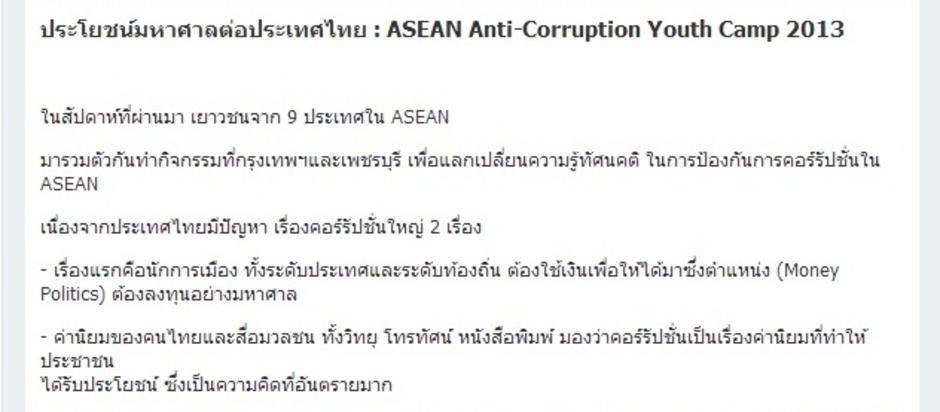
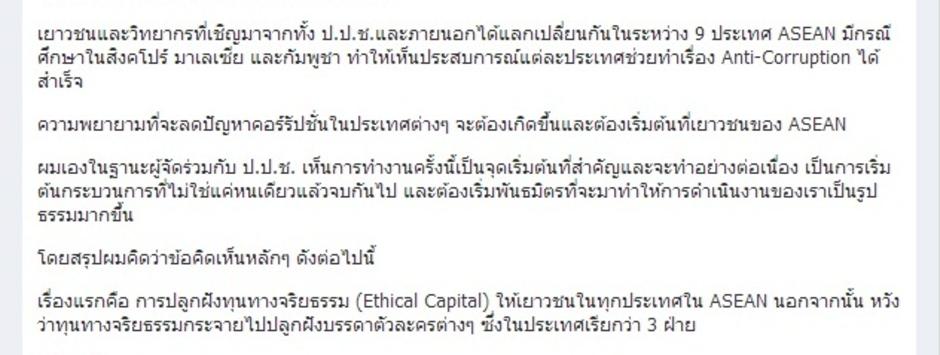

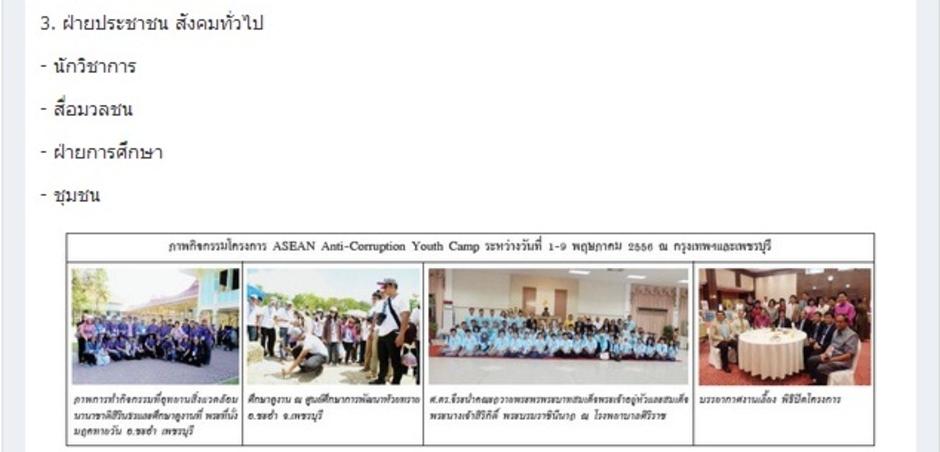

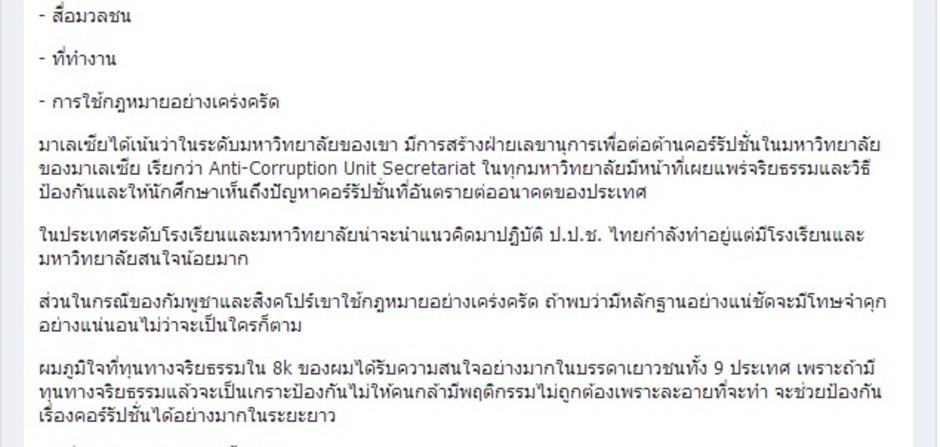

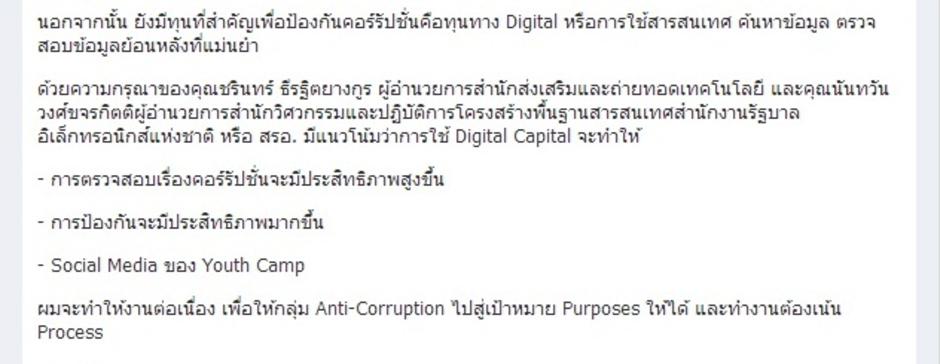
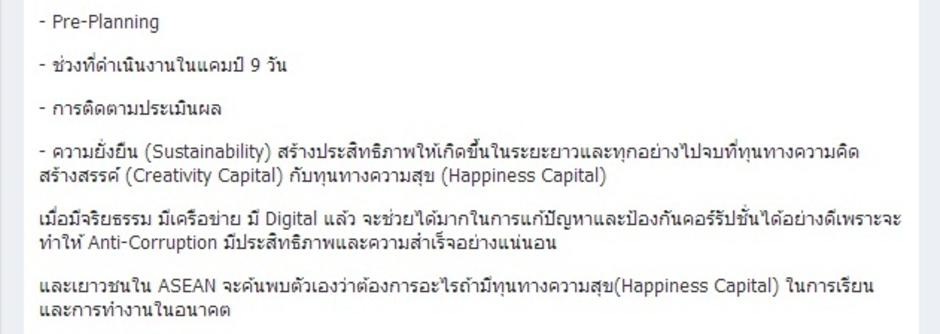

ที่มา: แนวหน้า วันเสาร์ที่ 11 พฤษภาคม 2556 หน้า 5
โปรดคลิกที่ลิ้งค์นี้เพื่อดูวีดิโอข่าวโครงการ
http://thainews.prd.go.th/centerweb/News/NewsDetail?NT01_NewsID=WNSOC5605010010007
Please click these links to watch the VDO news of this project.
http://www.youtube.com/watch?v=rAdE2TjWGHs
http://www.thaichamber.org/scripts/frame_tv.asp?nShowClick=1&nTOPICID=333
โปรดคลิกที่ลิ้งค์นี้เพื่อดูวีดิโอข่าวโครงการ
ข่าวโครงการค่ายเยาวชนต่อต้านการทุจริตอาเซียน
ASEAN Anti-Corruption Youth Camp's news










ที่มา: สกุลไทยรายสัปดาห์ ประจำวันอังคารที่ 18 มิถุนายน 2556 หน้า 118-119.
Source: Sakulthai Weekly Magazine. June 18, 2013, page 118-119.
ข่าวโครงการค่ายเยาวชนต่อต้านการทุจริตอาเซียน
ASEAN Anti-Corruption Youth Camp's news












ที่มา: สกุลไทยรายสัปดาห์ ประจำวันอังคารที่ 25 มิถุนายน 2556 หน้า 118-119.
ติดตามชมรายการ "สู่..ประชาคมอาเซียน" ตอน Anti-Corruption in ASEAN ออกอากาศวันที่ 22 มีนาคม 2556 เป็นเรื่องราวของการจัด ASEAN Youth Camp ของเยาวชนประเทศในกลุ่มอาเซียนเพื่อสร้างเครือข่ายการต่อต้านทุจริตคอรัปชั่น โดย สำนักงาน ป.ป.ช.
http://www.youtube.com/watch?v=MKLfobBL-eQ
http://www.youtube.com/watch?v=G8daaYErDqM
โปรดคลิกที่ลิ้งค์นี้เพื่อฟังข่าวโครงการ
http://mcot-web.mcot.net/fm965/audio/view/id/517cd68a150ba0134c000345#.Uk1WadIwwyk
Please click this link to read the project's news.
http://www.gotoknow.org/posts/591833
Source: FIHRD-Chira Academy Newsletter Fortnightly. on June 30 – July 15, 2015 (English Version)
โปรดคลิกที่ลิ้งค์นี้เพื่ออ่านข่าวโครงการ
โปรดคลิกที่ลิ้งค์นี้เพื่ออ่านข่าวโครงการ
http://www.gotoknow.org/posts/596870
ที่มา: FIHRD-Chira Academy Newsletter รายปักษ์ ประจำวันที่ 30 ตุลาคม – 13 พฤศจิกายน 2558
Please click this link to read the project's news.
http://www.gotoknow.org/posts/596871
Source: FIHRD-Chira Academy Newsletter Fortnightly on October 30 – November 13, 2015 (English Version)
โปรดคลิกที่ลิ้งค์นี้เพื่อฟังข่าวโครงการ
http://mcot-web.mcot.net/fm965/site/streaming/id/562cbdfabe04701f2d8b464a#.Vjbd-tLhCt8
ที่มา: รายการวิทยุ Human Talk ออกอากาศวันอาทิตย์ที่ 25 ตุลาคม 2558 ทาง FM 96.5 MHz.
โปรดคลิกที่ลิ้งค์นี้เพื่อดูข่าวโครงการ
Please click this link to watch the project's news.
https://www.youtube.com/watch?v=Eb99vooxDyY&feature=youtu.be
ที่มา: รายการ สู่..ประชาคมอาเซียน
ตอน : การทำงานต่อเนื่องเรื่องการทูตภาคประชาชน & การสร้างมูลค่าเพิ่ม 3 Vs ที่กัมพูชา
ออกอากาศทาง NBT เมื่อวันศุกร์ที่ 23 ตุลาคม 2558
Source: Source: Towards ASEAN Community TV Program broadcast on NBT Channel on Friday 23 October 2015.
โปรดคลิกที่ลิ้งค์นี้เพื่อดูข่าวโครงการ
Please click this link to watch the project's news.
ที่มา: รายการ
คิดเป็น…ก้าวเป็น กับ “ดร.จีระ”
ตอน: Think Tank: เขตเศรษฐกิจพิเศษสะเดาเชื่อมโยงการจัดการท่องเที่ยวอย่างยั่งยืนสู่อาเซียน
ออกอากาศทาง TGN วันพฤหัสบดีที่ 22 ตุลาคม
2558
Source: Kid Pen Kao Pen with Dr. Chira TV Program broadcast on TGN Channel on Thursday 22 October 2015
